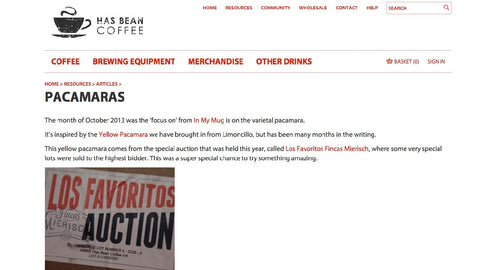Episodes

Saturday Jul 21, 2018
Episode 506: Nicaragua Finca Limoncillo Washed Ethiosar
Saturday Jul 21, 2018
Saturday Jul 21, 2018
I've been telling the story of Hasbean and Finca Limoncillo for many, many years now and I don't intend to stop any time soon because it's such a big big big relationship for me : ) so much of where we are today has come from this relationship, and I'm really proud of everything that's happened in the past, as well as super excited for where we can go in the future.
The relationship with Finca Limoncillo began in 2007, and back then we were buying their delicious coffee as part of a buying group. I loved it from the very first time I cupped it, and it was a coffee I just had to get. It was only after the auction closed that I discovered it was owned by a family in Nicaragua who were already good friends of mine, and indeed probably the only people I know from the whole country!
The following year I visited the farm with our importers and spent the whole trip begging them to bring the coffee into the UK for us. Eventually, via my supreme Steve pester power they caved in (probably just to stop the flow of emails and phone calls!) and kindly did so.
This setup worked well for a time, but we received notice a couple of years ago that the importers were not going to be buying the coffee again (and for reasons other than the cup quality). This led to some frantic phone calls and a thorough search down the back of the sofa for loose change to fund buying twelve months’ worth of coffee all at once. There were many, many obstacles in the way of doing this deal, but we were lucky in that we were able to pull everything together in a very short amount of time.
The upside of all of this is that we now work directly with Finca Limoncillo instead of going via anyone else, and this is a relationship I’m super happy to have. This coffee has gone from a one-off Cup of Excellence buy to a fantastic long-term relationship that I'm so very proud to have.
Finca Limoncillo is located in Matagalpa and, at 171 hectares in size, it. is. huge! Situated at an amazing location, it boasts 9 waterfalls within the farm and is owned by the Mierisch family; as I have already said, they’re good friends, and also well-respected producers in Nicaragua. They’re known for their experimental processing, varietal work, and exceptional coffee.
The fact that the family are friends helps us drill down into the details of what they do for the people who work for them, and the information continues to prove to me that good people grow good coffee.
On the farm, the family:
- Pay their staff 30% more than what is typical minimum wage.
- Provide free housing for 60 families.
- Provide free electricity and running water for their workers' homes.
- Provide free food for all workers.
- Provide free daycare facilities for families to use.
- Provide free healthcare facilities.
- Employ on-site teachers who educate the staff and teach other skills, such as pottery and weaving. The goal is to help staff diversify their skills. The teachers are also paid twice the wages they would receive in the cities.
The coffees we receive from Limoncillo are fantastic and they come from a fantastic relationship. Erwin Mierisch has visited Stafford many times, and it's always a pleasure to have him around. Last time he was visiting we ended up at a Weird Beard tap takeover in Manchester, talking to two Weird Beards about crazy brewing / coffee farming ideas! A coffee from Finca Limoncillo (the 'Funky Red Pacamara') is used in two of Weird Beard's beers: Black Perle and Double Perle, both of which are mighty delicious beers!
So what's this Ethiosar varietal, I hear you ask? Well, we've been roasting Ethiosar from Limoncillo for quite a few years now, and it comes from the hard work of the Mierisch family and their cousin Ricardo. He owns a farm near to Limoncillo, but at a much lower altitude of 800 metres above sea level. Ricardo noticed that his yield and his plants were suffering and that they seemed to be becoming more susceptible to disease. He put this down to growing issues in Nicaragua, a change in climate, increased rains and his low altitude. But from experiments he was running on the farm, he noticed that this newly-spliced varietal he had put together was thriving. It was fruiting much more than the other plants and was not suffering.
The varietal, Ethiosar, is a stable hybrid plant. It's a cross of an Ethiopian variety (Sudan Rume) with a Sarchimor (a cross of a Villa Sarchi with a Timor variety). The offspring of this plant is then crossed once again with a Villa Sarchi, which is an improved Caturra / Bourbon from Costa Rica.
The Timor variety is the Robusta variety used to produce all the Catimors. In short, it only has a very small percentage of Catimor in it, thus making it very resistant to leaf rust in most parts of the world. The Sudan Rume is a very old variety of Typica from Ethiopia. Both Sudan Rume and Villa Sarchi are known for their great cup characteristics.
What Ethiosar does is increase production by up to 40% whilst only needing 2,800 plants per manzana, whereas with Caturra you would need 4,000 plants. This may not seem important until you begin to think that each plant needs fertiliser. So not only are you getting more yield but it's cheaper to grow because you need less fertiliser and less plants (plants have to be grown or bought), and it's also quicker to pick. On top of all of this, it's super tasty.
In the cup there's green apple backed up by a single cream type sweetness and texture. Hints of black pepper and tinned strawberries mingle in the finish.
- Country: Nicaragua
- Municipality: Yasica Norte
- Region: Matagalpa
- Farm name: Limoncillo
- Farmer: Dr Erwin Mierisch
- Farm size: 171 hectares
- Coffee growing area: 109 hectares
- Altitude: 1,200 m.a.s.l.
- Varietal: Ethiosar (Ricardo)
- Processing system: Washed
CUPPING NOTES
Green apple, single cream, black pepper, tinned strawberries.
Clean cup: (1–8): 6
Sweetness: (1–8): 6.5
Acidity: (1–8): 6.5
Mouthfeel: (1–8): 6.5
Flavour: (1–8): 6.5
Aftertaste: (1–8): 6
Balance: (1–8): 6.5
Overall: (1–8): 6.5
Correction: (+36): +36
Total: (max. 100): 87
Roasting Information
Medium dark - slow it down in the gap and push it through to the start of second, but only catch is as you drop the roast out.
"Quick Look" Guide
Green apple, single cream, black pepper, tinned strawberries.

Saturday Jul 14, 2018
Episode 505: Bolivia Teodocio Mamani
Saturday Jul 14, 2018
Saturday Jul 14, 2018
I first met Teodocio Mamani on my visit to Bolivia in 2012. Long story short: he's an amazing guy. We got talking about the photo we had of him in a Chelsea shirt, and then of course we started talking football. He had the Chelsea shirt because he played for a local team that played in blue, but I managed to convince him that he needed a shirt from a real team so I sent him a Sunderland shirt. It's amazing to think that was so long ago, and this year I'm super happy to welcome this coffee back for its fifth year!
Canton Uyunense is a municipality of Caranavi, and lots of farms can be called a variation on that name. This is a super small lot coming from just 6,000 plants on two hectares of land. It's a mixture of Catuai and Catuai varietals. Teodocio also has one hectare of land that is natural forest reserve, in which he owns a house where he lives with his wife and two children. He is also planting a new area, which we should see start producing coffee in the next couple of years (and I can't wait).
This year is the fifth year that Teodocio has processed the majority of his coffee on the farm, which for me is super exciting. He uses a depulper that removes the cherry, then leaves the cherry to go through a dry fermentation process (aerobic) for sixteen hours, and then runs it through the scrubber section of the pulper to remove the final remains of the mucilage. He then transfers the coffee to raised African beds, where it dries in around twelve days (depending on local weather conditions).
I was talking to the exporter about Teodocio's picking methods, and he was explaining that the family uses a method called Ayne. With this method the most mature fruits are harvested each day, demanding the labour of 8–10 people (who are all family members in this case) to selectively pick, and to pick correctly. But because of this he gets more coffee that he can sell as specialty, and the cup profile improves too. Teodocio is just as passionate about improving the cup quality as he is about his football!
In the cup this is a chocolate malted milk (moo cow!) biscuit with a subtle hit of redcurrant that's smooth, rounded and super balanced.
- Country: Bolivia
- Region: Yungas
- Province: Caranavi
- Municipality: Canton Uyunense
- Farm: Teodocio Mamani
- Varietal: Caturra & Catuai
- Ripe cherry colour: Red & yellow
- Altitude: 1,600-1,750 m.a.s.l.
- Processing: Washed
- Fermentation: Wet
- Fermentation time: 16-18 hours
- Drying method: Raised beds
CUPPING NOTES
Milk chocolate, malted milk biscuit, redcurrant.
Clean cup: (1–8): 6
Sweetness: (1–8): 7
Acidity: (1–8): 6.5
Mouthfeel: (1–8): 6.5
Flavour: (1–8): 6.5
Aftertaste: (1–8): 6
Balance: (1–8): 6.5
Overall: (1–8): 6
Correction: (+36): +36
Total (max. 100): 87
Roasting Information
Medium dark - through the gap and you want the very first pops of second as you drop the roast out of the roaster into the cooling tray.
"Quick Look" Guide
Milk chocolate, malted milk biscuit, redcurrant.
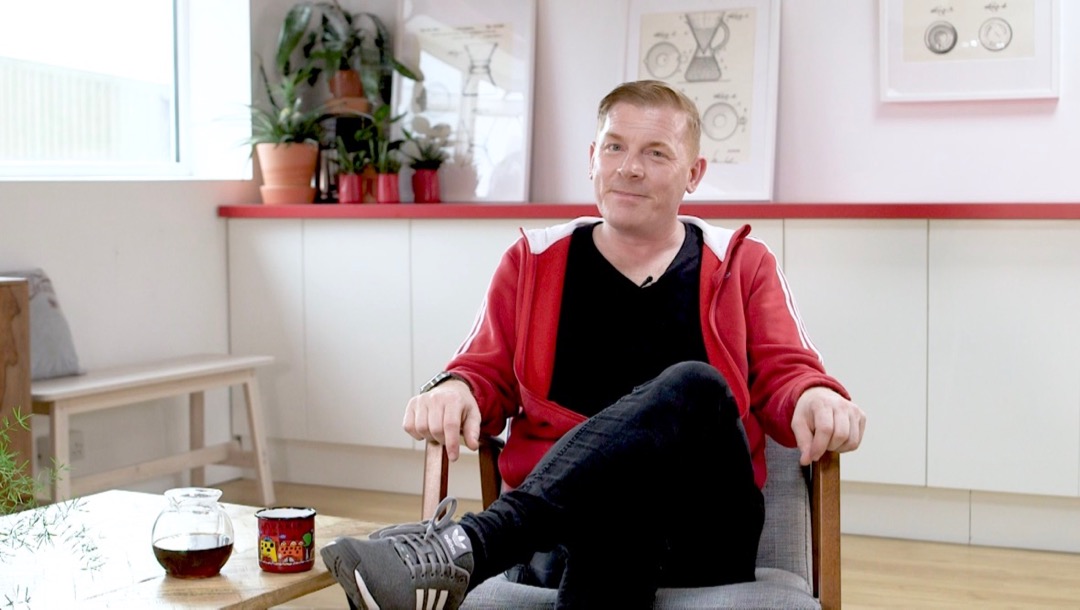
Saturday Jul 07, 2018
Episode 504: Indonesia Frinsa Estate Smallholders Washed Sigarar Utang
Saturday Jul 07, 2018
Saturday Jul 07, 2018
This is a coffee farmed by selected outgrowers and processed at the Frinsa Estate located in West Java, locally called Sunda. Frinsa is a farm that's about 110 hectares in size and sits between 1,300 - 1,600 metres above sea level.
They have a wetmill located at 1,400 m.a.s.l. as well as a well ventilated storage space and a dry mill which means they are in fully control of their product from harvest to grading, sorting and shipment. The coffee is dry fermented, soaked, pre-dried on raised beds and finished off on the patio.
Wildan and his wife Atieq started their first coffee project in Sindangkerta, Weninggalih area in 2010 which later became the main growing area at his farm Java Frinsa Estate. Since the first year of production, Wildan has aimed to focus on quality which requires meticulous attention and processes. While the majority of Indonesian producers are doing the wet hulled coffees, even for specialty, Wildan is focusing on the fully washed. Besides the quality, and social and economic impact for the community, I believe his coffee project will also have long term benefits for water conservation and reforestation in the area.
Frinsa Estate have 6 main growing plots spread out in the area and they buy cherries from a few selected outgrowers from the surroundings of the Estate.
Weninggalih : 60 hectare (plan for another 50 hectare expansion) Altitude is about 1,400 m.a.s.l. The cultivars grown are Sigararutang, Lini S795, Borbor, Timtim, Andungsari, Ateng Super, P88, Blue Mountain and Belawan Pesuma.
Mekarwangi: 10 hectare, altitude about 1,400 m.a.s.l. The cultivars grown are Typica, Sigararutang and Lini S795.
Tilu Mountain: 10 hectare altitudes about 1,600 m.a.s.l. The cultivars grown are Sigararutang, Lini S795, Borbor, Timtim, Andungsari, P88 and Kopyol.
Pengalengan: 20 hectare, altitudes about 1,500 m.a.s.l. The cultivars grown are Typica, Sigararutang, Borbor, Andungsari and P88.
Malabar Mountain: 5 hectare, altitudes about 1,600 m.a.s.l. The cultivars grown are Sigararutang, Lini S795 and Andungsari.
Garut: 4 hectare (in partnership with the local smallholder farmers) Altitudes is about 1,300 m.a.s.l. The cultivars grown are Sigararutang, Lini S795, Andungsari and P88.
Most of the coffees are fully washed but they do some wet-hulled and naturals, mainly for the local market. Their coffees are always separated in lots by field location, cultivar, and date of picking. The parchment are stored in plastic bags with LDPE liners
Through cooperation with a coffee research center they have been planting a lot of other different unknown cultivars, all separated by blocks in the farm. As the farm and the trees are still very young nobody knows how the flavour profile for many of these trees will come out, but how exciting is that?!
Harvesting: coffees are harvesting from May – September, with the main harvest from June- August. The coffees are picked and then hand sorted for unripe and diseased cherries.
Processing: after harvesting the coffees are dry fermented in small tanks 15-18 hours before they are rinsed and soaked under water for another 10-12 hours and washed under clean water.
Drying: they mainly dry on patio, but are investing in way more drying tables for the future. Currently most of the coffees are pre dried on beds for a day or two in green houses and then transferred to the patio. Drying can take 14-20 days, depending on the rain during the drying period.
Varietal: there's some disagreement on the exact history of the Sigarar Utang varietal, but it's become a popular one in Indonesia. It's thought to be a Catimor, descended from Hibrido de Timor (also the parent of many other catimors around the world and a natural Robusta-Arabica hybrid that was discovered in Timor).
Sigarar Utang roughly translates as Paid Debt and refers to the fact that the varietal starts producing a crop in only 18 months to 2 years rather than the 3 years typically needed for new coffee plants - so farmers can start to earn money back on their investment quickly. It's considered a semi-dwarf varietal - usually quite short but occasionally said to grow tall when left unattended.
In the cup it starts unexpectedly with the flavour of apricot yoghurt, before swinging into the more classic Indonesian flavours of dark chocolate digestive biscuit and a shoulder of peppery spice on the finish.
- Country: Indonesia
- Region: West Java
- Region: Weninggalih
- City: Sindangkerta
- Farm: Frinsa Estate
- Producers: Smallholder Farmers
- Varietal: Sigarar Utang
- Processing method: Fully Washed
- Altitude: 1,300-1,600 m.a.s.l.
CUPPING NOTES
Apricot yoghurt, dark chocolate, digestive biscuit, pepper.
Clean cup: (1–8): 6
Sweetness: (1–8): 6.5
Acidity: (1–8): 6
Mouthfeel: (1–8): 6.5
Flavour: (1–8): 6.5
Aftertaste: (1–8): 6.5
Balance: (1–8): 7
Overall: (1–8): 6
Correction: (+36): +36
Total: (max. 100): 87
Roasting Information
Medium dark - through first crack and all the way up to the cusp of second crack and drop before it really starts to get going.
"Quick Look" Guide
Apricot yoghurt, dark chocolate, digestive biscuit, pepper.
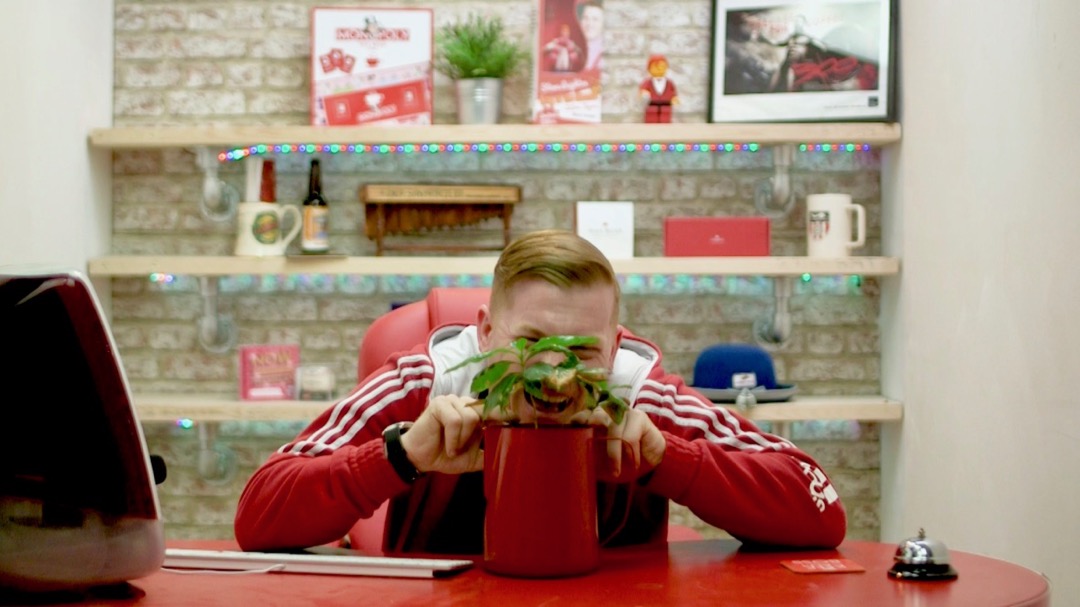
Saturday Jun 30, 2018
Episode 503: Nicaragua Finca Limoncillo Washed Caturra
Saturday Jun 30, 2018
Saturday Jun 30, 2018
I've been telling the story of Hasbean and Finca Limoncillo for many, many years now and I don't intend to stop any time soon because it's such a big big big relationship for me : ) so much of where we are today has come from this relationship, and I'm really proud of everything that's happened in the past, as well as super excited for where we can go in the future.
The relationship with Finca Limoncillo began in 2007, and back then we were buying their delicious coffee as part of a buying group. I loved it from the very first time I cupped it, and it was a coffee I just had to get. It was only after the auction closed that I discovered it was owned by a family in Nicaragua who were already good friends of mine, and indeed probably the only people I know from the whole country!
The following year I visited the farm with our importers and spent the whole trip begging them to bring the coffee into the UK for us. Eventually, via my supreme Steve pester power they caved in (probably just to stop the flow of emails and phone calls!) and kindly did so.
This setup worked well for a time, but we received notice a couple of years ago that the importers were not going to be buying the coffee again (and for reasons other than the cup quality). This led to some frantic phone calls and a thorough search down the back of the sofa for loose change to fund buying twelve months’ worth of coffee all at once. There were many, many obstacles in the way of doing this deal, but we were lucky in that we were able to pull everything together in a very short amount of time.
The upside of all of this is that we now work directly with Finca Limoncillo instead of going via anyone else, and this is a relationship I’m super happy to have. This coffee has gone from a one-off Cup of Excellence buy to a fantastic long-term relationship that I'm so very proud to have.
Finca Limoncillo is located in Matagalpa and, at 171 hectares in size, it. is. huge! Situated at an amazing location, it boasts 9 waterfalls within the farm and is owned by the Mierisch family; as I have already said, they’re good friends, and also well-respected producers in Nicaragua. They’re known for their experimental processing, varietal work, and exceptional coffee.
The fact that the family are friends helps us drill down into the details of what they do for the people who work for them, and the information continues to prove to me that good people grow good coffee.
On the farm, the family:
- Pay their staff 30% more than what is typical minimum wage.
- Provide free housing for 60 families.
- Provide free electricity and running water for their workers' homes.
- Provide free food for all workers.
- Provide free daycare facilities for families to use.
- Provide free healthcare facilities.
- Employ on-site teachers who educate the staff and teach other skills, such as pottery and weaving. The goal is to help staff diversify their skills. The teachers are also paid twice the wages they would receive in the cities.
The coffees we receive from Limoncillo are fantastic and they come from a fantastic relationship. Erwin Mierisch has visited Stafford many times, and it's always a pleasure to have him around. Last time he was visiting we ended up at a Weird Beard tap takeover in Manchester, talking to two Weird Beards about crazy brewing / coffee farming ideas! A coffee from Finca Limoncillo (the 'Funky Red Pacamara') is used in two of Weird Beard's beers: Black Perle and Double Perle, both of which are mighty delicious beers!
In the cup it's a toffee apple, but one where they've put extra toffee on there. It's sweet caramel and toffee up front with a kick of crisp green apple coming through afterwards to make one of the most well balanced cups you'll find.
- Country: Nicaragua
- Municipality: Yasica Norte
- Region: Matagalpa
- Farm name: Limoncillo
- Farmer: Dr. Erwin Mierisch
- Farm size: 171 manzanas (hectares)
- Coffee growing area: 109 hectares
- Harvest months: December–February
- Altitude: 1,200 m.a.s.l.
- Varietal: Caturra
- Processing method: Washed
- Diurnal temperature cycle: average high: 28 C; average low: 20 C
- GPS coordinates: N13 2.9569 W85 49.9756
CUPPING NOTES
Toffee, green apple, caramel, balanced.
Clean cup: (1–8): 6.5
Sweetness: (1–8): 6.5
Acidity: (1–8): 6.5
Mouthfeel: (1–8): 6
Flavour: (1–8): 7
Aftertaste: (1–8): 6
Balance: (1–8): 8
Overall: (1–8): 6.5
Correction: (+36): +36
Total: (max. 100): 89
Roasting Information
Medium to medium dark - through first crack and through the gap, but no more than a pop or two of second.
"Quick Look" Guide
Toffee, green apple, caramel, balanced.
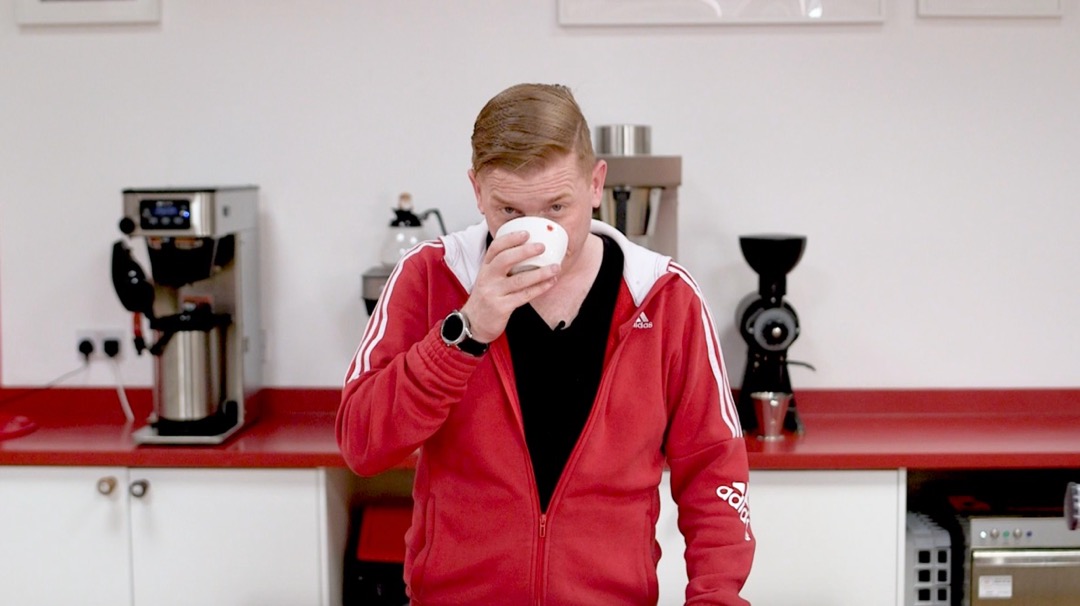
Saturday Jun 23, 2018
Episode 502: Ethiopia Yirgacheffe Chirinku Washed
Saturday Jun 23, 2018
Saturday Jun 23, 2018
This is a washed lot produced at Chirinku mill, just south of the town of Yirgacheffe. It's run by Girma Gurara and receives deliveries from around 700 local growers.
The altitude of the mill is 2,140 m.a.s.l. with most growers who deliver to the mill being based at around 1,900 - 2,150 m.a.s.l.
This is a classic Yirgacheffe both in how it has been produced and how it tastes, which we selected on the cupping table based on that profile. Unfortunately when we choose coffees in this way we can end up a little short on information about the coffee itself (as you can see above) but we really think this coffee doesn't need very many words alongside it...once it's in your cup we hope you'll taste just why went for it!
In the cup expect a mug of Earl Grey. There's black tea and bergamot oil with delicate florals over the top. On the finish the sweetness really kicks in with subtly malty notes.
- Country: Ethiopia
- Region: Yirgacheffe
- Mill: Chirinku
- Owner: Girma Gurara
- Mill altitude: 2,140 m.a.s.l.
- Varietal: Indigenous Wild Varietals
- Processing: Washed
- Farm altitude: 1,900 - 2,150 m.a.s.l.
- Producers: 650-750 with an average farm size of 2 hectares
- Soil: Fertile, red brown, well-drained and to 1.5m depth
- Rainfall: 1,800 - 2,000 mm avg per annum
CUPPING NOTES
Earl Grey, black tea, bergamot oil, floral, malty.
Clean cup: (1–8): 7
Sweetness: (1–8): 6.5
Acidity: (1–8): 6
Mouthfeel: (1–8): 6.5
Flavour: (1–8): 7
Aftertaste: (1–8): 6.5
Balance: (1–8): 7
Overall: (1–8): 6.5
Correction:(+36): +36
Total: (max. 100): 89
Roasting Information
Medium - take this through first (but not too quickly) dropping it at the end of first or just into the gap, no more.
"Quick Look" Guide
Earl Grey, black tea, bergamot oil, floral, malty.
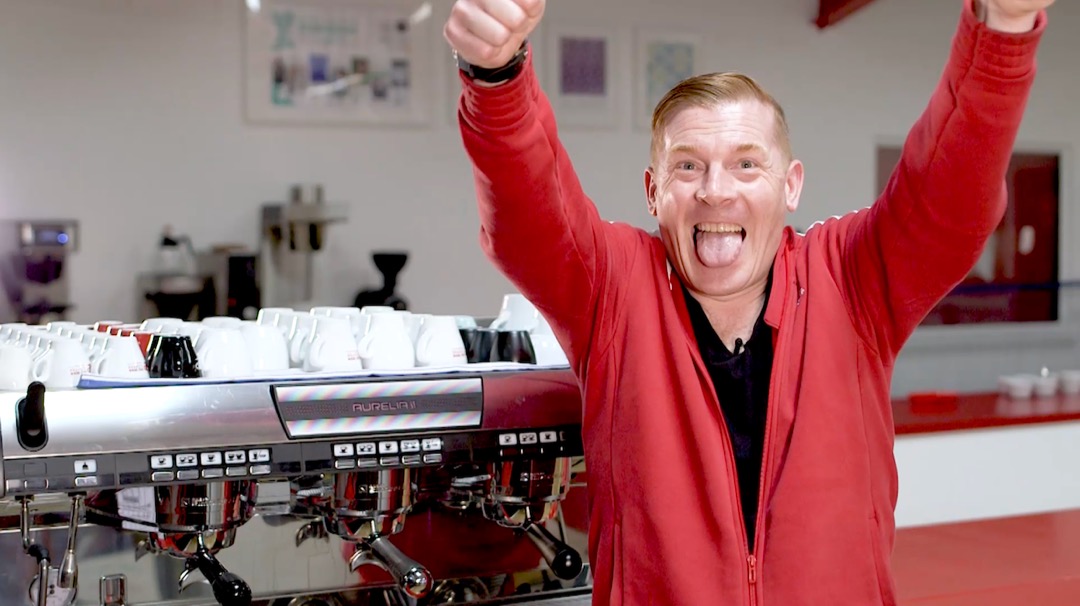
Saturday Jun 16, 2018
Episode 501: El Salvador Finca Las Brumas Washed Bourbon
Saturday Jun 16, 2018
Saturday Jun 16, 2018
Juan Jose Ernesto 'Neto' Menéndez Argüello belongs to the fourth generation of coffee farmers in his family. His father died in 1995. After completing his studies at university, Neto had the opportunity to start working in the coffee industry at J. Hill & Cia, in 2000. He left J. Hill & Cia after five years, and began his second coffee experience at JASAL.
Both companies gave him the opportunity to meet 'Grano de Oro' from another perspective, allowing him to learn the art and passion of cupping. He says those are very important in his life, and that they give him the opportunity to apply his coffee knowledge and experience that he's gained through the years.
During his time in the coffee world, he has participated in various events like the Cup of Excellence (National Jury from 2003 to 2011), Q Auction, Q Grader, and the Star Cupper program organised by SCAA and CQI.
The farm, Las Brumas, is located between 45 to 60 minutes from Santa Ana city. It has a cultivated area of 60 hectares' worth of coffee yield, all of which is at an altitude ranging from 1,450 to 1,700 m.a.s.l. It produces around 600 bags of coffee each year, and has an area of 35 hectares of virgin mountain at an altitude from 1,700 to 2,000 m.a.s.l.
The farm is located in the Sonsonate department near the area known as San Blas. Las Brumas has very rich volcanic soil, deep and very fertile, which has been generated by different Ilamatepec and Izalco volcanic eruptions throughout its history.
One of the most important elements is the micro climate. It's very misty at the farm for most of the year, and that's why Neto decided to name the farm Finca Las Brumas. This amazing micro climate is generated when the warm air from the Pacific ocean collides with the high peaks of the Volcanoes Park (which comprises of the Santa Ana, Cerro Verde and Izalco volcanoes).
Due to its location between these three famous volcanoes in El Salvador, this unique micro climate reduces the amount of daylight that the coffee trees receive. This helps the coffee trees have a very slow photosynthesis, improving the maturation process, and this in turn improves some attributes that are closely related to maturity, like the aroma, sweetness, acidity and flavour.
Last year our very own Dale Harris took a coffee from this farm to the World Barista Championship finals in South Korea and won to become the World Barista Champion for 2017! I'm super happy and excited to now be able to share newer crop coffees with you from Las Brumas too : )
In the cup this coffee is like opening a box of dark chocolate coated Brazil Nuts all to yourself. Immediate hits of dark chocolate, Brazil Nut and hazelnut dominate the fight before a little green apple jab at the end finishes things off.
- Country: El Salvador
- Department: Sonsonate
- Nearest city: Santa Ana
- Farm: Finca Las Brumas
- Farmer: Juan Jose Ernesto 'Neto' Menéndez Argüello
- Altitude: 1,450–1,700 m.a.s.l.
- Variety: Bourbon
- Processing system: Washed
CUPPING NOTES
Dark chocolate, hazelnut, Brazil Nut, green apple.
Clean Cup: (1-8): 6
Sweetness: (1-8): 6.5
Acidity: (1-8): 6
Mouthfeel: (1-8): 6.5
Flavour: (1-8): 6.5
Aftertaste: (1-8): 6
Balance: (1-8): 7
Overall: (1-8): 6.5
Correction:(+36): +36
Total: (max 100): 87
Roasting Information
Medium dark - take to the first pops of second with this, get a sheen but no oils.
"Quick Look" Guide
Dark chocolate, hazelnut, Brazil Nut, green apple.

Saturday Jun 09, 2018
Episode 500: Bolivia Finca Las Alasitas Washed Caturra
Saturday Jun 09, 2018
Saturday Jun 09, 2018
This coffee comes from the Rodriguez family who have been doing some really rather great things for coffee in Bolivia. They own their own mills, processing and exporting coffee for farmers in the Caranarvi and Sud Yungas region. The family have been sourcing coffee from small coffee producers for three decades, but the steady decline of coffee production has put the sustainability of their export business in jeopardy. Without the intervention of people like the Rodriguez family, however, the future of coffee production in Bolivia is at risk of disappearing.
The family decided that they could make a change, make things better and have taken on the challenge of increasing the production of Bolivian coffee by planting their own new coffee plantations.
In 2014, the Rodriguez family bought land in Caranavi region to showcase their practises and educate other producers in sustainable farming, as well as increasing the overall volume at their mills. They prepared the land on 20.6 hectares and planted Red Caturra, Java and Geisha. The name of the farm is Las Alasitas, which in the Aimara native language means “buy me”.
Added to this, they have also introduced a sustainable model for the producers who supply them at their mill, and built this on three mantras: economical sustainability, social understanding, and environmental awareness - Sol de Mañana.
Finca Las Alasitas is a 20.6 hectare farm that's located at 1,550 metres above sea level in the Bolinda colony of Caranavi, Bolivia. Of those 20 hectares 16 are used to grow coffee.
Caranavi is located north of the department of La Paz city. It's 150 kilometres from the capital, and it is the centre of Bolivian coffee production. Its fertile soils and altitude give Bolivia the potential to produce brilliant and unique coffees.
In the cup this reminds me of a melted dark chocolate cookie. It's got great texture - thick and gloopy - with a mix of dark chocolate and treacle sweetness, before a shoulder of biscuit on the finish.
- Country: Bolivia
- Region: Yungas
- Municipality: Caranavi
- Colony: Bolinda
- Farm: Finca Las Alasitas
- Altitude: 1,550 m.a.s.l.
- Farm size: 20.6 hectares
- Coffee growing area: 16 hectares
- Varietal: Caturra
- Processing method: Washed
- GPS: 15º46'43.07"S 67º32'53.06"O
CUPPING NOTES
Dark chocolate, treacle, biscuit, thick, gloopy.
Clean cup (1–8): 6
Sweetness (1–8): 7
Acidity (1–8): 6
Mouthfeel (1–8): 8
Flavour (1–8): 6.5
Aftertaste (1–8): 6
Balance (1–8): 6.5
Overall (1–8): 6
Correction (+36): +36
Total: (max. 100): 88
Roasting Information
Medium dark - through first crack and extend the development between cracks, dropping just on the cusp of second crack, no more.
"Quick Look" Guide
Dark chocolate, treacle, biscuit, thick, gloopy.

Saturday Jun 02, 2018
Episode 499: Bolivia La Linda Washed Caturra
Saturday Jun 02, 2018
Saturday Jun 02, 2018
Coffee production in Bolivia was traditionally concentrated in the region of Los Yungas, where lush sub-tropical vegetation and environmental conditions helped to produce the amazing-quality Bolivian coffee that we all know and love.
Caranavi is located north of the department of La Paz city. It's 150 kilometres from the capital, and it is the centre of Bolivian coffee production. Its fertile soils and altitude give Bolivia the potential to produce brilliant and unique coffees.
Due to the many complications and challenges within the Bolivian coffee industry, many of the smaller farms we have worked with in the past are no longer producing coffee. Whilst this has created some challenges for us, it has had a much more significant impact on our exporting partners AgriCafe, who have been working with these growers for many years. As a result, they have decided to begin farming themselves, in an effort to demonstrate what can be achieved with the application of more modern techniques and a scientific farming approach.
Agricafe now manage seven farms, of which La Linda was the first to bear fruit. La Linda is known as The Seed Garden for the other farms in the Buena Vista project. Alongside this Caturra lot, the farm is producing Longberry, Catuai and Typica lots; it's also producing Java, SL28 and Bourbon, which are all new plantings in Bolivia. All the coffee has been picked by a group of seven specifically-trained female workers.
In the cup this reminds me of Horlicks mixed with a Terry's Chocolate Orange - little bit of malt, plenty of chocolate and a shoulder of orange, yum! There's also a thick and almost buttery mouthfeel that really makes this coffee super chuggable.
- Country: Bolivia
- Region: Yungas
- Province: Caranavi
- Colony: Bolinda
- Farm: La Linda
- Altitude: 1,400 - 1,450 m.a.s.l.
- Processing Method: Washed
- Varietal: Caturra
CUPPING NOTES
Horlicks, Terry's Chocolate Orange, buttery, chuggable.
Clean Cup: (1-8): 6
Sweetness: (1-8): 7
Acidity: (1-8): 6
Mouthfeel: (1-8): 6
Flavour: (1-8): 6.5
Aftertaste: (1-8): 7
Balance: (1-8): 7
Overall: (1-8): 6.5
Correction: (+36): +36
Total: (max 100): 88
Roasting Information
Medium dark - aim for just a pop or two of second as you're dropping the roast, no more.
"Quick Look" Guide
Horlicks, Terry's Chocolate Orange, buttery, chuggable.
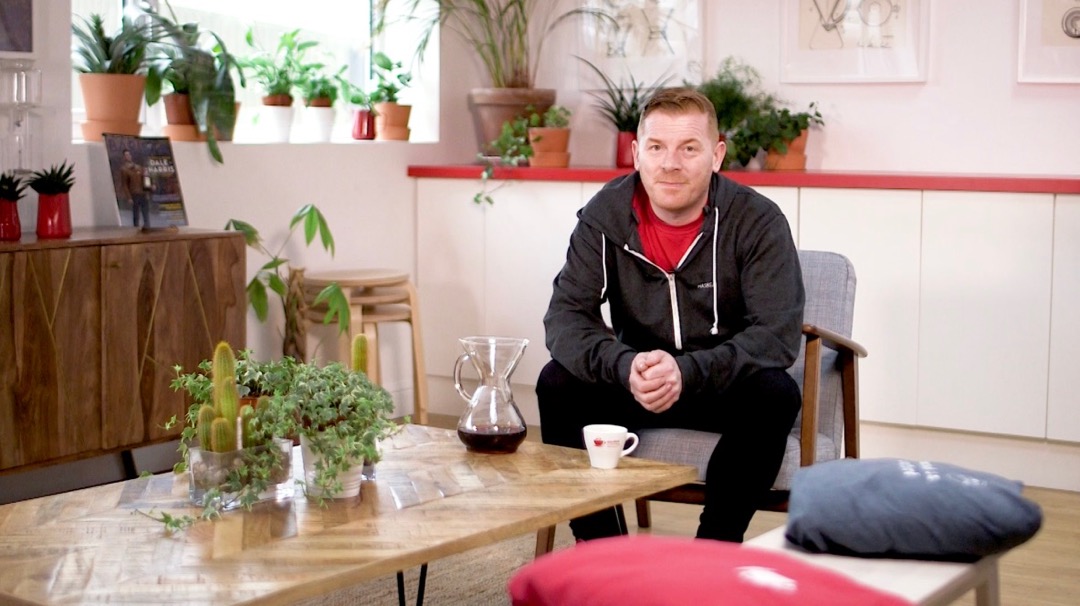
Saturday May 26, 2018
Episode 498: Brazil Fazenda Inglaterra Natural Catucai COE Entrant
Saturday May 26, 2018
Saturday May 26, 2018
Fazenda Inglaterra is a farm we are supporting for the tenth (!) year, cruising into double digits in 2018. It's a farm that I am super proud to be working with and linked with because the owner is my very good friend, Stephen Hurst.
Each year Stephen (can I just call him Hursty from now on?!) picks a lot from his farm to enter into the Cup of Excellence competition. Unusually, there are separate competitions for Pulped Natural & Natural processed coffees in Brazil, with Hursty competing with a Natural this year. Unfortunately for him, this lot was a hair’s breadth short of making it through - though that works out well for us because it’s a really delicious coffee which we can now enjoy!
It’s grown on the highest part of Inglaterra, which isn’t easy to get to, where they've planted the Catucai varietal. Catucai is a hybrid of Catuai and Icatu. It’s no surprise it was developed in Brazil, where it’s parents - Catuai and Icatu - are both popular choices on farms. The Catuai varietal has found lots of success both in cup quality and in being a practical varietal for farming in difficult conditions - it’s resistant to high winds, is high yielding and has a short height. Icatu is a hybrid of Arabica and Robusta, back crossed with Arabica varietals. This gives it superior disease resistance and hardiness to Catuai, but whilst it’s held it’s own in terms of cup quality, it’s not got the proven track record of success that Catuai has. This all makes a hybrid of the two - Catucai - a thoughtful balance of practicality and cup quality.
A fairly new varietal, Catucai can be found not only in Brasil but in other countries around the world (including Haiti and India) where disease resistant new plant stock with good flavour potential is being planted.
In the cup this is a banana milkshake, sweet and gloopy, with a little kick of caramel and then a shoulder of hazelnut on the finish.
- Country: Brazil
- Region: Minas Gerais
- City: Poços de Caldas
- Farm: Fazenda Inglaterra
- Owner: Stephen Hurst
- Farm size: 10 hectares
- Coffee growing area: 5 hectares
- Altitude: 1,200 m.a.s.l.
- Varietal: Catucai
- Processing method: Natural
CUPPING NOTES
Banana milkshake, caramel, hazelnut, sweet, gloopy.
Clean cup: (1–8): 6.5
Sweetness: (1–8): 7
Acidity: (1–8): 6
Mouthfeel: (1–8): 6.5
Flavour: (1–8): 7
Aftertaste: (1–8): 6
Balance: (1–8): 6.5
Overall: (1–8): 6.5
Correction:(+36): +36
Total (max. 100): 88
Roasting Information
Medium to medium dark - nice and steady through first crack and the gap that follows, but don't let second start.
"Quick Look" Guide
Banana milkshake, caramel, hazelnut, sweet, gloopy.
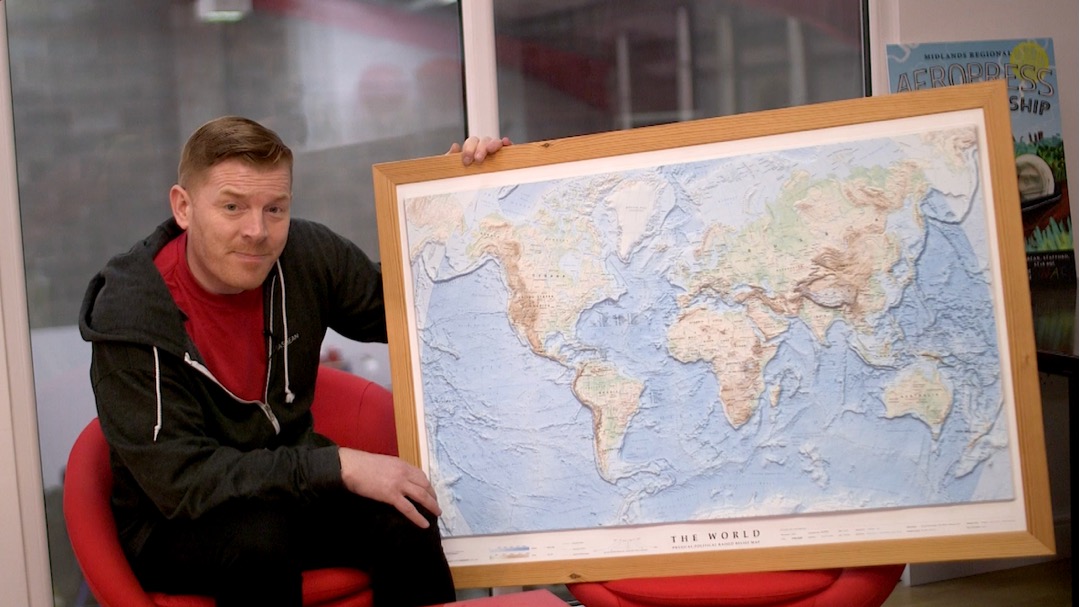
Saturday May 19, 2018
Episode 497: Bolivia Bebeto Mamani
Saturday May 19, 2018
Saturday May 19, 2018
The name of this coffee producer may sound a little familiar. Bebeto (Beto for short) is the son of the legend that is Teodocio Mamani. Teodocio owns Finca Canton Uyunense, which is a farm we have worked with since 2012.
His farm is located in 18 de Mayo, which is a municipality of Caranavi (and part of canton Uyunense). Lots of farms can be called a variation on these names because the land traditionally tends not to have a name.
This year is the third year that Bebeto has grown his own coffee under his own guardianship, and it's the second year that he has processed it himself (Dad letting go). And just like previous years, and as you'd expect from a Mamani, the results are super tasty!
This coffee is a mixture of red and yellow Typica, Caturra and Catuai. Bebeto used a depulper that removes the cherry, then left the coffee to go through a dry fermentation process for 16–18 hours, and then ran it through the scrubber section of the pulper to remove the final remains of the mucilage. Bebeto then transferred the coffee to raised African beds, where it dried in around 7–9 days.
The picking method Bebeto uses is called 'Ayne', just like his dad uses on Canton Uyunense. This method involves selective picking (not stripping the tree like their neighbours), and demands much more labour and incurs much higher costs. But because of this Bebeto gets more coffee he can sell as specialty, and the cup profile is improving year after year.
In the cup this makes me think of soft, sweet fruits. It begins with a subtle, sticky papaya before you get a burst of pomegranate with a floral edge. As it finishes, it takes a left turn, leaving a milk chocolate aftertaste which lingers delightfully.
- Country: Bolivia
- Department: La Paz
- Region: Yungas
- Province: Caranavi
- Municipality: 18 de Mayo
- Farm: Bebeto Mamani
- Owner: Bebeto Mamani
- Varietals: Typica, Caturra and Catuai
- Ripe cherry colour: Red and yellow
- Altitude: 1,600–1,750 m.a.s.l.
- Processing: Washed
- Fermentation: 16–18 hours
- Drying method: Raised beds
- Other crops grown: citrus, papaya, banana, wild forest
CUPPING NOTES
Papaya, pomegranate, floral, milk chocolate.
Clean cup: (1–8): 6
Sweetness: (1–8): 7
Acidity: (1–8): 6.5
Mouthfeel: (1–8): 6.5
Flavour: (1–8): 7
Aftertaste: (1–8): 6.5
Balance: (1–8): 6
Overall: (1–8): 6.5
Correction: (+36): +36
Total (max. 100): 88
Roasting Information
Medium to medium dark - through first and make sure it's well developed, but anywhere from the end of the gap into the early start of second crack will give tasty results.
"Quick Look" Guide
Papaya, pomegranate, floral, milk chocolate.

Saturday May 12, 2018
Episode 496: Brazil Fazenda Cachoeira da Grama Natural Canario
Saturday May 12, 2018
Saturday May 12, 2018
This farm and its coffee sparked a massive change in what I thought I knew about coffee. I remember the first time I ever cupped this coffee: time stood still as the cup opened my mind to what great coffee is and can be. Gabriel, the farmer, continues to produce great coffee year on year. We have access to the best of the crop this year – and have had for the last few years – on a European exclusive. This is due to the special relationship we, and our importers, enjoy with Gabriel.
Fazenda Cachoeira da Grama has been in the Carvalho Dias family since 1890 and is located in the São Paolo state, just three miles from the border with the Minas Gerais state. It enjoys the typical characteristics of the mountainous Mogiana and Sul de Minas regions, and it's located at an altitude of 1,100–1,250 metres above sea level.
Gabriel de Carvalho Dias is one of Brazil’s leading agronomists. His family owns several farms, and they border each other in this area. With a total area of 417 hectares, Fazenda Cachoeira da Grama has a coffee plantation area of 165 hectares. Everything is done manually on this farm since its topography does not allow any kind of mechanisation. The mill is located close to the spa town of Poços de Caldas, which is 45 minutes away from the farm.
The Carvalho Dias family consider social and environmental sustainability to be very important. The farm has a programme of planting native species of trees to maintain a better ecological balance. There is also a school, a club and an official-size soccer field for the employees and workers. There are 47 houses, all with modern facilities. The wastewater is treated in order to avoid polluting the stream that runs across the farm. The farm has a small hydroelectric plant and only buys energy during the peak harvest. Some of the original Bourbon varietal trees are as much as 108 years old.
The beans are harvested on a sheet and prepared by the ‘natural’ process, where cherries are taken and dried in the sun.
This comes from the rare Canario varietal, which is a Bourbon mutation that originated in Brazil. You can find out more about it here, but what you will notice in the cup is that it adds complexity and acidity compared to Bourbon.
In the cup this cup make me think of cacao nibs covered in treacle toffee. Its chewy mouthfeel finishes with a pleasant peanut crunch.
- Country: Brazil
- State: São Paulo
- Municipality: São Sebastião da Grama
- Farm: Fazenda Cachoeira da Grama
- Processing: Natural
- Varietal: Canario
- Altitude: 1,100–1,250 m.a.s.l.
- Owner: Lidolpho de Carvalho Dias and family
CUPPING NOTES
Cacao nibs, treacle toffee, chewy, peanut.
Clean cup: (1–8): 6
Sweetness: (1–8): 6.5
Acidity: (1–8): 6
Mouthfeel: (1–8): 7
Flavour: (1–8): 6.5
Aftertaste: (1–8): 6.5
Balance: (1–8): 6.5
Overall: (1–8): 7
Correction (+36): +36
Total (max. 100): 88
Roasting Information
Medium dark – aim to finish the roast just before second crack gets going.
"Quick Look" Guide
Cacao nibs, treacle toffee, chewy, peanut.
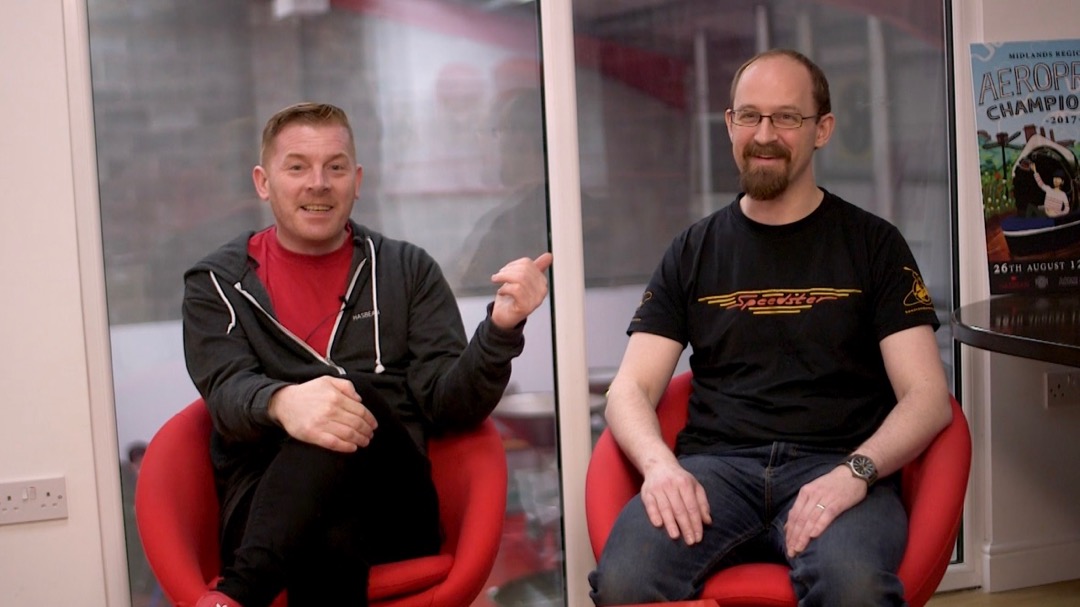
Saturday May 05, 2018
Saturday May 05, 2018
The ownership of this farm has a quite short story, however Maria Jose and her husband, Luis have both been in coffee for a while, Maria Jose represents the fifth generation of coffee growers with six years experience in quality and marketing coffee programs like Cup of Excellence, while Luis, a new grower has a background of nearly twelve years working in the Salvadoran coffee industry as market analyst, and he used to coordinate El Salvador's coffee marketing and developed quality and educational programs. Nowadays, he keeps busy between his farm and searching quality coffees through Virmax Mesoamerica which focused on exceptional quality coffees in several Latin-American countries.
La Gloria is a little jewel previously owned by Abel Castillo, from whom they bought it in October, 2009. After a few weeks evaluating soil, vegetative tissue, extension, varietals, and investment needs, Maria Jose and Luis got to acquire this small yet special piece of land located in a well-known area for growing amazing beans. Many experts recognize the mountains surrounding Apaneca for their microclimate characteristics that have prove awesome qualities for growing heirloom and exotic varietals consistently over the years. The name "La Gloria" which in Spanish means "Glory”, was given in honor of Maria Jose's mother who is a big inspiration and supporter for this coffee-couple's endeavor.
La Gloria is a 2.6 hectares piece of coffee heaven with an average altitude of 1,450 m.a.s.l. and rich volcanic loam topped with a heavy coat of organic matter. The steep part of the farm is mostly grown to Bourbon and Pacas varietals, but it also has a flat plot or "tablon" dedicated to the exotic Pacamara varietal. Coffee grows below a canopy of ingas and other native trees, that serve as a natural habitat to a wide variety of birds, small mammals, snakes and insects. Sounds of life can be heard from every inch of the farm adding to the atmosphere and the magnificent view of the "Laguna del Espino" and the Guatemalan border mountains.
Another great aspect of the farm is its infrastructure. Water tanks and pit-digging were done amongst the cultivars to make watering and fertilizing easier, and also to prevent erosion. Some of the cultural practices being performed this year are fertilization, maintenance of windbreaker barriers, appreciative coffee pruning, stumping and trimming, shade tree pruning, maintenance of "cajueleado" or pit digging practices to collect organic matter, reduce erosion and oxygenate the land, and building a coffee and shade tree nursery for replanting during next winter.
An expanding varietal garden with nearly 65 different varietals has been planted for research and educational purposes.
Maria José and Luis got this farm and made a commitment for producing the best possible coffee while keeping its faith in hard work, innovation and experimentation. They are very proud and thankful with God because their farm has been also awarded two years in a row by CoE.
The milling process was performed at El Carmen mill in Ataco, depulped within few hours after harvesting, fully washed process with 24 hours-natural fermentation of sundried in clay patios for 20 days.
In the cup you can expect a sweet biscuity wafer, but then a fruity tropical edge creeps in - not quite Totally Tropical, but almost! The texture is silky smooth and it finishes cleanly with a crisp, delicate hit of Asian Pear.
- Country: El Salvador
- Department: Ahuachapán
- Municipality: Apaneca
- Location: Cantón San Ramocito
- Farm: La Gloria
- Varietals Grown: Pacas and Bourbon, and a little plot with Pacamara
- Processing Method: Washed
- Type of Shade: Pepeto, inga sp, and other native trees
- Average Annual Rainfall: 2,200 mm
- Altitude: 1,450 m.a.s.l. (average)
- Average Temperature: 20ºC
- Type of Soil: Loamy
- Mill and company where lot was processed: Beneficio El Carmen, Agrícola San Agustín, S.A. de C.V.
- Fauna: Armadillo, small wildcats, agouti paca, hawks, pocket gopher, magpie, turquoise-browed motmot, snakes.
CUPPING NOTES
Wafer, tropical fruit, Asian pear.
- Clean Cup: (1-8): 6.5
- Sweetness: (1-8): 6.5
- Acidity: (1-8): 6
- Mouthfeel: (1-8): 6
- Flavour: (1-8): 7
- Aftertaste: (1-8): 7
- Balance: (1-8): 7
- Overall: (1-8): 6.5
- Correction: (+36): +36
- Total: (max 100): 88
Roasting Information
Medium dark - a classic fruity El Salvador, take this just to the first pops of second crack as you drop it, no further please!
"Quick Look" Guide
Wafer, tropical fruit, Asian pear.

Saturday Apr 28, 2018
Episode 494 on Monday the 30th of April, 2018. Burundi Kibingo Washed Bourbon
Saturday Apr 28, 2018
Saturday Apr 28, 2018
The Kibingo central washing station is located in the commune of Kayanza in northern Burundi. The station itself lies at 1,893 meters above sea level. The altitude of the farms in the neighbouring hills that supply the washing station vary from 1,700 to 1,900 meters above sea level. Kibingo services 3,553 registered coffee growers, spread over 18 hills in the area. In 2016, all these producers together had 1,010,062 coffee trees! That’s 284 trees on average per producer.
The washing station is equipped with 10 fermentation tanks, 2 soaking tanks and a drying field with 165 drying tables and 4 pre-drying tables. Kibingo can process 750,000 kg of cherry per day.
At cherry intake, a picking team sorts the cherries on maturity. This is essential for a fine processing, resulting in fewer damaged beans. The cherry skins are mechanically removed during pulping. Next, the sticky parchment will dry ferment for 12 hours. When fermentation is complete, the parchment goes down the washing and grading channel. Finally, the top quality coffee soaks for an additional 24 hours to remove any remaining mucilage before going to the pre-drying tables. Here, the second team of pickers checks the wet parchment to take out defect beans. After a couple of hours, the parchment is moved to the drying tables. Depending on the weather conditions, it will reach 12% moisture content in about two weeks.
Kibingo CWS has 3,553 registered farmer members, spread over 18 collines or hills in Kayanza province. All producers registered at the washing station are organized in groups of 30 people, headed by a farm leader. This leader acts as a spokesman to facilitate communication and organization with the washing station.
In Burundi, wet mills can reach farmers in a range of 3km. If the washing station is located too far away, producers will sell to middlemen, often at a disadvantage. To prevent this, Kibingo and other washing stations have collection centres - these centres allow them to reach farmers at up to 9 kilometres distance from the wet mill. This is a huge benefit for a producer who then doesn’t have to travel far with a heavy load of cherries. At the same time, shorter distances help to preserve the quality of the coffee too.
At the washing station, farmers can obtain organic fertilizer from reconverted coffee pulp. To promote farm renovation, producers can get low-cost, subsidized coffee seedlings at the washing station. Each station has its own nursery for this purpose.
Kayanza has one of the best coffee growing reputations in Burundi. Coffee farms lie in the highlands, where soils are rich and volcanic. But optimal growing conditions alone aren’t enough to produce a high-quality coffee. To achieve the best coffee, a skilled and dedicated washing station manager is essential. They oversee the implementation of good economic practice and farmer education and collaborate with the producers to ensure they have access to the necessary tools. They also help farmers determine and implement the practices best suited to the specific growing conditions of their plantations.
Next to improving quality and productivity, the company that manage the washing station Greenco strives to improve socio-economic and environmental conditions around the washing stations. All of their washing stations have UTZ and 4C certification. One of their focus points is building an efficient supply chain around the CWS. Greenco is buying 93% of its cherries directly from farmers via collection centres. This way, they improve farm-gate price to the producers.
Another socio-economic challenge Greenco addresses is Burundi’s high rate of youth unemployment. The national youth unemployment rate is almost 50%. At Greenco, young graduates receive a decent salary and benefits (house, motorbike, healthcare) as well as real career prospects.
Adding to the training on farming practices, Greenco organises training for farmer groups on various social aspects. Coffee families learn about gender equality, financial planning, family planning, breastfeeding, and many other things too.
On an environmental side, Greenco has equipped all washing stations with water treatment facilities and solar panels and batteries. The solar panels provide energy for computers, lighting and smartphones.
In the cup expect lime cordial sweetened with brown sugar that gets a jasmine floral edge as it starts to cool. Add to this dark chocolate and blackcurrant on the finish and you have yourself a really delicious cup.
- Country: Burundi
- Province: Kayanza
- Commune: Kayanza
- Nearest town: Kinga
- Washing station: Kibingo
- Washing station altitude: 1,839 m.a.s.l.
- Coffee growing altitude: 1,600-1,900 m.a.s.l.
- Producers: 3,553
- Varietal: Bourbon
- Processing method: Washed
CUPPING NOTES
Lime cordial, brown sugar, jasmine, floral, dark chocolate, blackcurrant.
Clean cup: (1–8): 6.5
Sweetness: (1–8): 6.5
Acidity: (1–8): 7
Mouthfeel: (1–8): 6
Flavour: (1–8): 6.5
Aftertaste: (1–8): 6.5
Balance: (1–8): 6.5
Overall: (1–8): 6.5
Correction: (+36): +36
Total: (max. 100): 88
Roasting Information
Medium – get through first crack and into the gap, but then drop this before you reach second crack.
"Quick Look" Guide
Lime cordial, brown sugar, jasmine, floral, dark chocolate, blackcurrant.
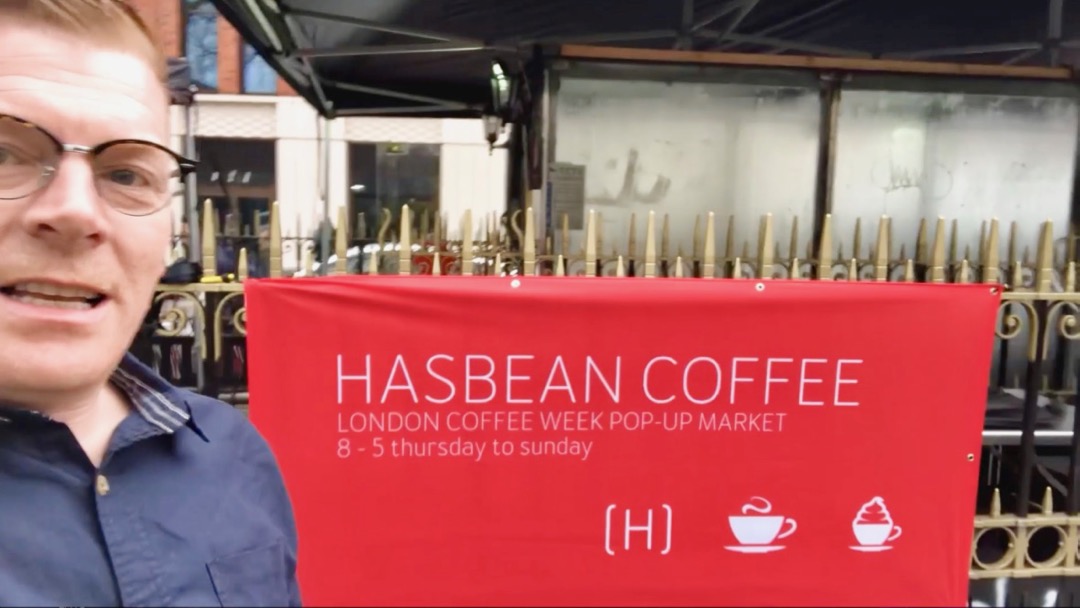
Saturday Apr 21, 2018
Saturday Apr 21, 2018
Carmela Aduviri has been growing coffee for 40 years, whilst raising 8 children, but is always eager to learn ways she can improve her yield. She now has a small 2 Hectare farm called Carmelita and our exporting friends in Bolivia Agricafe’s message to her was that she could stay small, focusing on getting the best results from what she had, rather than having to rush to buy more land.
That means, of course, that she doesn’t produce huge amounts – but what she produces is delicious.
This lot comes from the first ever Sol De Mañana project that was held in Caranarvi September 2017. We (and in we I mean myself and Joanna Alm from Drop Coffee, Sweden) cupped coffees from the producers on the program (while being watched by them, high pressure). We were the only judges and we had to rank the coffees from one to ten. The winner got some fertiliser for their farm, and the opportunity to sell their coffee to Both Drop Coffee and Hasbean at a premium price.
The cupping was exceptional (in fact we bought some other lots too), but the decision on the winner was unanimous, and was both our favourite on the table. There was a celebration football game afterwards, where Joanna and her team of female producers, kicked our butt’s and ran out victorious. You might think that Carmelita won twice that day, but you are the real winners, getting this unique and amazing lot that is the result of the hard work of Carmelita and the exporters who run the Sol De Mañana project. New plant tissue, education and access to organic fertilisers and advice how to apply them has lead to this amazing special cup of Bolivian coffee.
There's only enough of this coffee to send out to you lucky subscribers so this is an In My Mug exclusive coffee, you can't buy it on the website, it's all gone out to you lovely lot!
In the cup you’re going to peel open a soft and squishy nectarine then sprinkle some brown sugar on top, but then it quickly turns to being all about a big bite (not a nibble) of Fry’s Turkish Delight.
- Country: Bolivia
- Region: Caranavi
- City: Colonia Copacabana
- Farm: Carmelita
- Farmer: Carmela Aduviri
- Altitude: 1,550 m.a.s.l.
- Variety: Caturra & Catuai
- Processing system: Mechanically Washed
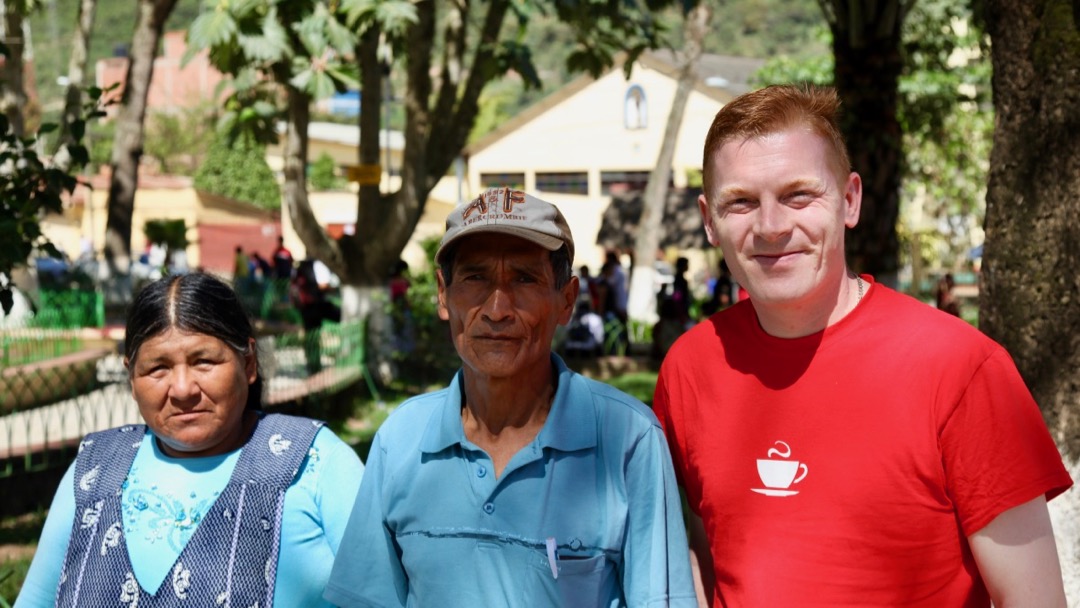
Saturday Apr 14, 2018
Episode 492 on Monday the 16th of April, 2018. Bolivia David Vilca
Saturday Apr 14, 2018
Saturday Apr 14, 2018
This is a big, big Bolivian favourite here at Hasbean. I am so pleased to see this coffee back for an amazing SEVENTH year! It’s a big favourite for me, and I know this is also true for many of you too.
The farm is located in Illimani in the Los Yungas region of Bolivia, near to the city of Caranavi. The farm didn't originally actually have a proper name and so it has been named after the gentleman that runs it, David Vilca. This is quite common in Bolivia: farms are often named after an individual or the family running them.
David migrated from La Paz to the farm sixteen years ago, after a career in mining left him with damaged hearing. He bought a twelve hectare farm as security for himself and his family, to make sure that they could support themselves. When he took over, he only had one acre planted with coffee (it was of the Criolla varietal). After two years, David was comfortable with coffee farming. He was becoming increasingly interested in it, and so he decided to extend the coffee plantation. He now has five acres of coffee (and we have bought the coffee from all five acres). He has very little outside help with the farm, except from direct family; his wife helps him greatly.
The varietals on the farm are Typica, Caturra, Catuai and a very small amount of Criolla. The farm is under constant improvement - David removed much of the Criolla that was growing so he could put more focus on the Typica, Caturra and Catuai, for cup quality reasons. This coffee is a mixture of all the varietals on the farm, excluding Criolla.
I have a really good relationship with David, and you might remember that three years ago we did something a little different with the coffee's price. I've visited David a couple of times now and when I was there I thought he was being rude to me by ignoring me, or not responding when I spoke to him. Last time I visited, though, I found out that David's hearing had become damaged whilst he was working as a miner before he made the move into coffee.
In the past the exporter had given David some money to get hearing aids, but he spent the money on satellite TV (for his wife – who hasn’t been in that situation!). So 3 years ago we paid for two hearing aids while we were there, so that he could hear properly again and enjoy my smooth and soothing Cannock accent #yamyam ;) yamyamyam
We thought that would be the last of it. But when I next visited, David didn’t have his hearing aids in. He told us that they were not good while he was picking what to wear, but also that he couldn’t afford the batteries. So we left him with cash for a microphone hearing-device for around his neck, and $200 for batteries. This worked out at 7p per bag for all the coffee we buy from him, and I didn't pick up the tab – you lovely people did! So a big THANK YOU from me, and also, of course, from David!
http://www.hasblog.co.uk/the-cost-of-hearing
David's farm is between 1,550 and 1,700 metres above sea level. This is a mechanically washed coffee that underwent full wet fermentation for 16 hours before being dried on raised beds and in a stationary dryer.
In the cup you can expect to taste what it’d be like if a Milky Way chocolate bar was walking down the street and bumped into a bunch of overripe white grapes. There’s also a subtle orange like acidity that’s been walking closely behind them too.
- Country: Bolivia
- Region: Illimani
- Farmer: David Vilca
- Altitude: 1,550–1,700 m.a.s.l.
- Varietals: Typica, Caturra & Catuai
- Ripe cherry colour: Red & yellow
- Processing method: Washed
- Washing method: Mechanical
- Fermentation: Full wet
- Fermentation time: 16 hours
- Drying method: Raised beds + stationary dryer
- Other farm products: Citrus fruits, yuca, banana.
CUPPING NOTES
Milky Way, white grape, orange.
Clean cup: (1–8): 6
Sweetness: (1–8): 7
Acidity: (1–8): 6.5
Mouthfeel: (1–8): 6.5
Flavour: (1–8): 6.5
Aftertaste: (1–8): 7
Balance: (1–8): 6.5
Overall: (1–8): 7
Correction:(+36): +36
Total (max. 100): 89
Roasting Information
Medium dark - take this just up to the first pops of second crack and then drop the roast.
"Quick Look" Guide
Milky Way, white grape, orange.
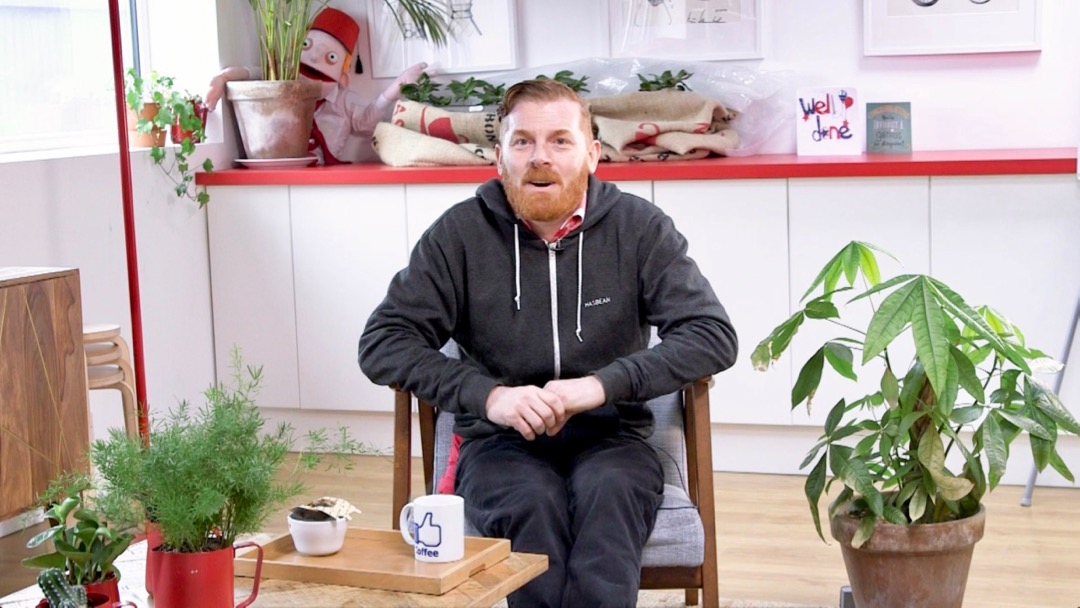
Saturday Apr 07, 2018
Saturday Apr 07, 2018
This farm and its coffee sparked a massive change in what I thought I knew about coffee. I remember the first time I ever cupped this coffee: time stood still as the cup opened my mind to what great coffee is and can be. Gabriel, the farmer, continues to produce great coffee year on year. We have access to the best of the crop this year – and have had for the last few years – on a European exclusive. This is due to the special relationship we, and our importers, enjoy with Gabriel.
Fazenda Cachoeira da Grama has been in the Carvalho Dias family since 1890 and is located in the São Paolo state, just three miles from the border with the Minas Gerais state. It enjoys the typical characteristics of the mountainous Mogiana and Sul de Minas regions, and it's located at an altitude of 1,100–1,250 metres above sea level.
Gabriel de Carvalho Dias is one of Brazil’s leading agronomists. His family owns several farms, and they border each other in this area. With a total area of 417 hectares, Fazenda Cachoeira da Grama has a coffee plantation area of 165 hectares. Everything is done manually on this farm since its topography does not allow any kind of mechanisation. The mill is located close to the spa town of Poços de Caldas, which is 45 minutes away from the farm.
The Carvalho Dias family consider social and environmental sustainability to be very important. The farm has a programme of planting native species of trees to maintain a better ecological balance. There is also a school, a club and an official-size soccer field for the employees and workers. There are 47 houses, all with modern facilities. The wastewater is treated in order to avoid polluting the stream that runs across the farm. The farm has a small hydroelectric plant and only buys energy during the peak harvest. Some of the original Bourbon varietal trees are as much as 108 years old.
The beans are harvested on a sheet and prepared by the ‘pulped natural’ process, which separates the greens. The beans receive the maximum possible attention after harvest so that they don't lose any of the body and cup qualities for which this region is famed.
This comes from the rare Canario varietal, which is a Bourbon mutation that originated in Brazil. You can find out more about it here, but what you will notice in the cup is that it adds complexity and acidity compared to Bourbon.
In the cup this reminds me of Scottish shortbread, with a nibble of peach and a macadamia nut finish. Classic Brazilian coffee.
- Country: Brazil
- State: São Paulo
- Municipality: São Sebastião da Grama
- Farm: Fazenda Cachoeira da Grama
- Processing: Pulped Natural
- Varietal: Canario
- Altitude: 1,100–1,250 m.a.s.l.
- Owner: Lidolpho de Carvalho Dias and family
CUPPING NOTES
Scottish shortbread, peach, macadamia nut.
Clean cup: (1–8): 6
Sweetness: (1–8): 7
Acidity: (1–8): 6.5
Mouthfeel: (1–8): 6.5
Flavour: (1–8): 7
Aftertaste: (1–8)6.5:
Balance: (1–8): 6.5
Overall: (1–8): 7
Correction (+36): +36
Total (max. 100): 89
Roasting Information
Medium dark – aim to finish the roast just before second crack gets going.
"Quick Look" Guide
Scottish shortbread, peach, macadamia nut.
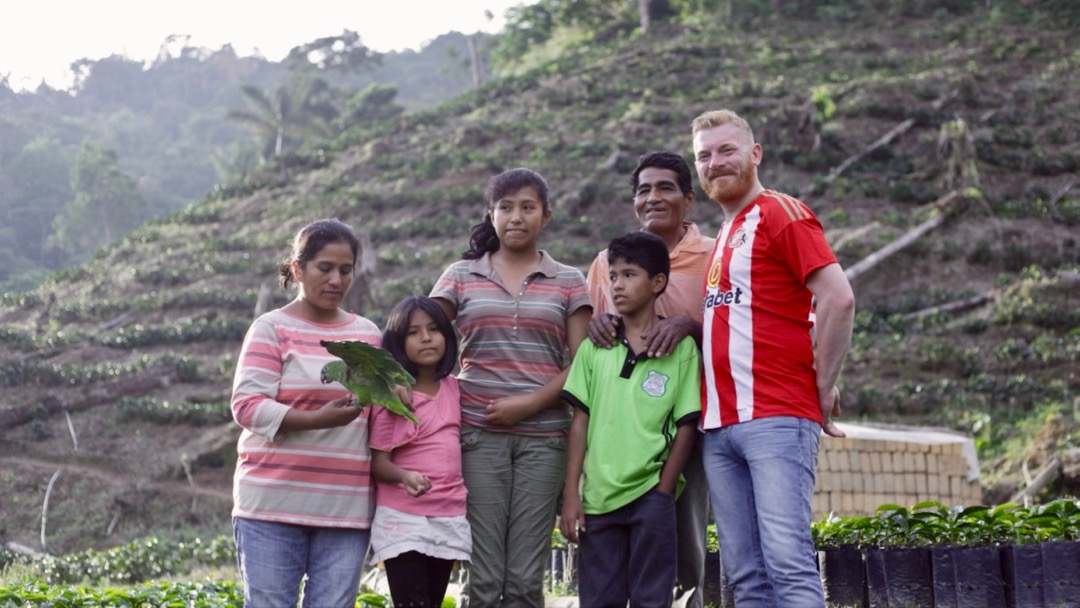
Saturday Mar 31, 2018
Episode 490 on Monday the 2nd of April, 2018. Bolivia Vincent Paye Washed
Saturday Mar 31, 2018
Saturday Mar 31, 2018
A few years ago we had a lot that was produced by various smallholder farmers from the small town of Copacabana, which lies about 180 kilometres from La Paz in the heart of the Caranavi coffee-producing region. Then in 2016 this coffee came from just one producer in the area, whose name is Vincent Paye. That year I described him as a beacon of hope in a tough growing region, and that beacon has continued to shine brightly.
Caranavi is a lush and fertile region. Its steep slopes and valleys provide excellent conditions for growing specialty coffee and supporting a diverse range of native flora and fauna. It has rich volcanic soils and regular rainfall.
The colony of Copacabana has a collection of small farms that are each around five hectares in size (although Vincent has ten hectares). The farms range over an altitude of 1,300 to 1,700 metres above sea level, and they benefit from an average annual temperature between 15 and 26°C. This lot comes from a farm matching these criteria, and it's at around 1,550 m.a.s.l. These traditional farms use no chemicals or pesticides and are certified organic, although we do not hold an organic certification.
The main harvest runs from May to September, peaking around July and August. The cherries are handpicked only when fully ripe, and they're then delivered to the central mill, called Buena Vista, where they are fully washed.
Bolivia is a challenge and is going through some tough times: dwindling crops, ageing plants, lack of varietal diversity and ageing producers with children who have little to no interest in carrying on the family business. But then there are people like Vincent who are doing wonderful work to buck that trend. He's been planting new stock, working hard with his family, and increasing his yield – and also the quality of his coffee.
In the cup this coffee is instantly all about melted milk chocolate, but you can also expect to enjoy notes of caramel and toasted pine nut, before it finishes with a lemon like acidity.
- Country: Bolivia
- Region: Yungas
- Municipality: Caranavi
- Town: Copacabana
- Farm: Vincent Paye
- Altitude: 1,550 m.a.s.l.
- Owner: Vincent Paye
- Varietal: Red & Yellow Caturra & Catuai
- Processing: Washed
- Washing: Manual
- Fermentation: Yes (18 hours)
- Drying method: Stationary dryer (71 hours)
CUPPING NOTES
Melted milk chocolate, caramel, toasted pine nut, lemon.
Clean cup: (1–8): 6
Sweetness: (1–8): 7
Acidity: (1–8): 6
Mouthfeel: (1–8): 6.5
Flavour: (1–8): 6.5
Aftertaste: (1–8): 6.5
Balance: (1–8): 6.5
Overall: (1–8): 7
Correction: (+36): +36
Total: (max. 100): 88
Roasting Information
Medium dark - just to the first pops of second crack and drop, no more.
"Quick Look" Guide
Melted milk chocolate, caramel, toasted pine nut, lemon.
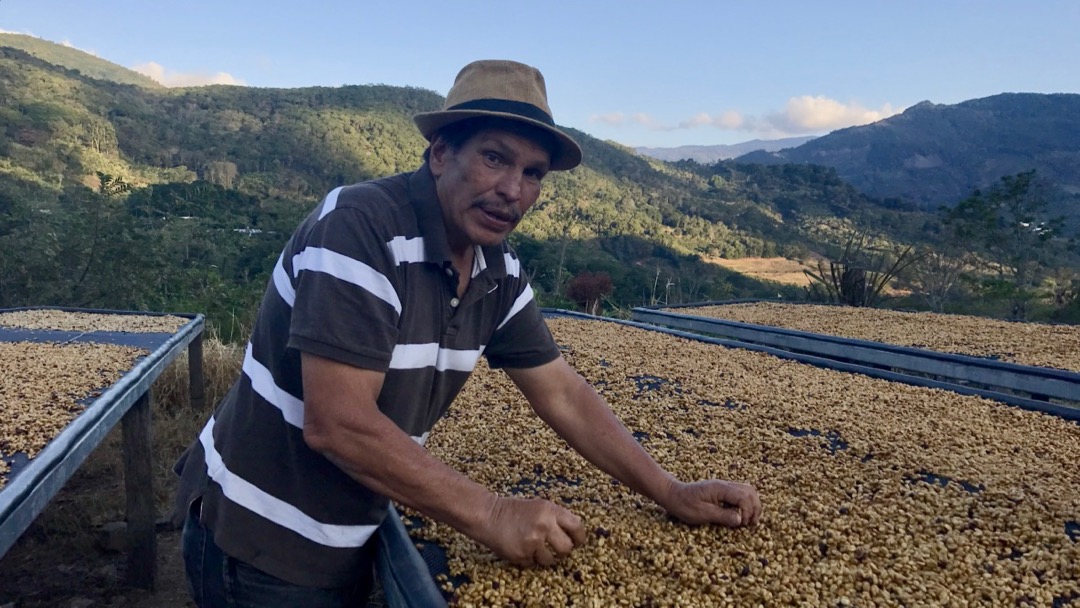
Saturday Mar 24, 2018
Saturday Mar 24, 2018
La Pira is located in the high altitude Dota valley of the Tarrazu region: an area that was known for producing great coffees. This relatively young estate is only 50 years old and is owned by the founder’s son, Carlos Urena Ceciliano. He has worked the farm for eighteen years; however, he has worked in coffee all his life.
We first found this coffee in the Cup of Excellence in 2009, and we were pleased to be reunited with it only recently after a lot of effort and hard work. Two years ago it proved tricky to secure, stretching both my pocket and patience, but it was well worth it. Thankfully last year and this year things were a little less stretchy and stretchy!
After inheriting the family farm, Carlos worked for many years as a certified organic coffee producer, but he realised doing so was just not possible on this farm. Organic coffee is good, but not possible for everyone. The yield was very, very affected. So Carlos looked for alternatives, while still holding the organic principles very close to his heart. For instance, instead of using chemicals to control the weeds, sheep roam freely amongst the coffee plants and eat the weeds (and strangely leave the coffee plants alone). They work as automatic and mobile 'fertilisation units' (nature’s a wonderful thing). This has eliminated the need for herbicides. This is the kind of thinking Carlos has about coffee.
When I last visited the farm, Carlos told me about how he wakes up in the middle of the night with an idea of how he can improve production, change the way the coffee is harvested and processed, and how systems can be improved upon. I too suffer from this type of sleep deprivation relating to ideas popping into the head, so I can empathise about this.
During one of these late night bursts of inspiration, Carlos thought that using the coldest water he could would be the best way of processing the cherry. During the night the Dota valley gets a really sharp, cold breeze, and it runs through the whole farm. He had noticed the way the water on the mill roof, which sprinkled from processing, was almost frosting up. So he created a sprinkling system and a zinc ramp that the water runs across before hitting the cherries in the fermentation tank.
I am convinced that these little details are what makes this coffee so very very special, and you can taste it in the cup. I don't think it’s the processing so much, but Carlos' care and attention to the very smallest detail.
We have chased this coffee ever since we first had it many years ago from the Cup of Excellence program. It's been tough to get our hands on due to its low yield, but I pestered the exporter we partner with in Costa Rica so much that I got my wonderful and wicked way! In every Skype call and every email I begged them to sort this one out. Even after visiting it wasn't easy, and what is here is a really small lot, but I think you will love it.
In the cup expect candied lemon peel, with a white sugar sweetness that's super clean and finishes with what I can only describe as a toffee stickiness.
- Country: Costa Rica
- Region: Tarrazú
- City: Santa María de Dota
- Farm: Finca La Pira
- Farmer: Carlos Ureña Ceciliano
- Farm size: 7 hectares
- Altitude: 1,650 m.a.s.l.
- Variety: Caturra
- Processing system: Red Honey
CUPPING NOTES
Candied lemon peel, white sugar, clean, toffee.
Clean cup: (1–8): 8
Sweetness: (1–8): 7
Acidity: (1–8): 6.5
Mouthfeel: (1–8): 6
Flavour: (1–8): 7
Aftertaste: (1–8): 6
Balance: (1–8): 6.5
Overall: (1–8): 7
Correction: (+36): +36
Total: (max. 100): 90
Roasting Information
Medium – through the gap between cracks but drop before second crack begins.
"Quick Look" Guide
Candied lemon peel, white sugar, clean, toffee.
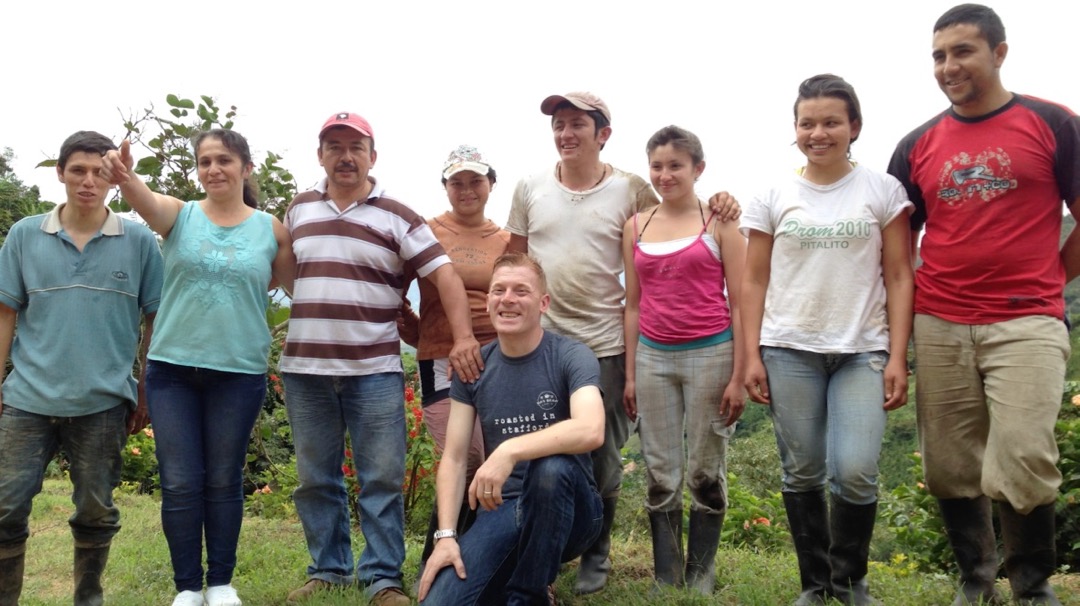
Saturday Mar 17, 2018
Saturday Mar 17, 2018
We're now into our sixth year of working this this amazing farm, but the first year's lot was so tiny that it never made it onto the website and was sold as an exclusive to one of our lucky wholesale customers. Luckily, ever since then we've been able to focus a little bit more on the farm: we cupped a lot more pickings and found a little more coffee.
Finca La Chorrera is located near to the city of Pitalito, in the south of the Huila department. It's in the valley of the Rio Grande de la Magdalena, known as 'The Valley of Laboyos', which is 180 km away from Nieva, the capital of Huila. Pitalito is also the second largest city of the department of Huila, at approximately 125,000 inhabitants, and is considered one of the largest areas of coffee production in Colombia.
This farm is located on top of a mountain at 1,735 metres above sea level. It contains 70% Caturra (25,000 plants; this lot comes from them), 20% Colombia F6 (7,000 plants) and 10% Castillo (2,000 plants). The farm consists of eight hectares, six of which are planted with coffee. The other two hectares house the mill and inaccessible mountainous areas. The family house, which is also used for drying, is at the bottom of the hill at around 1,400 metres above sea level.
I took some amazing pictures on my trip in 2013, so take a look here, and I took some more on my trip in 2014 – find them here!
The farm is owned and run by the Claros family: Pedro, his wife Nelcy and their six children (Alberio, Edilson, Sandra, Hermes, Diana and Monica). It's a real family business with everyone pitching into the farm to make it work.
Carlos sent us every day's pickings to cup and we bought everything that scored over 86 points on the cupping table; anything below 86 was sold for commodity. This meant we had to pay a premium for the coffee, but I think it's definitely worth it.
The farm's drying patio is one of the most amazing things I’ve seen. It's a greenhouse built on top of the house so that the coffee can be turned regularly, but also to make sure no one steals it. The latter was not so much of a problem last year with market prices being low, but it was a real problem over the previous three years. Of course, Pedro doesn't have to worry about market prices; he always gets a premium because he consistently gives quality, but black market coffee goes to the highest market bidder.
In the cup expect classic Colombian milk chocolate mixed with blackberry jam, this coffee has a wonderfully smooth body and hints of Granny Smith acidity.
- Country: Colombia
- Department: Huila
- Nearest town: Pitalito
- Farm: Finca La Chorrera
- Owners: Claros family
- Altitude: 1,735 m.a.s.l.
- Farm size: 8 hectares
- Coffee growing area: 6 hectares
- Varietal: Caturra
- Processing: Washed
CUPPING NOTES
Milk chocolate, blackberry jam, Granny Smith.
Clean cup: (1–8): 6.5
Sweetness: (1–8): 6.5
Acidity: (1–8): 6
Mouthfeel: (1–8): 7
Flavour: (1–8): 7
Aftertaste: (1–8): 6
Balance: (1–8): 6.5
Overall: (1–8): 6.5
Correction: (+36): +36
Total: (max. 100): 88
Roasting Information
Medium – just up to the cusp of second crack, but not into it.
"Quick Look" Guide
Milk chocolate, blackberry jam, Granny Smith.
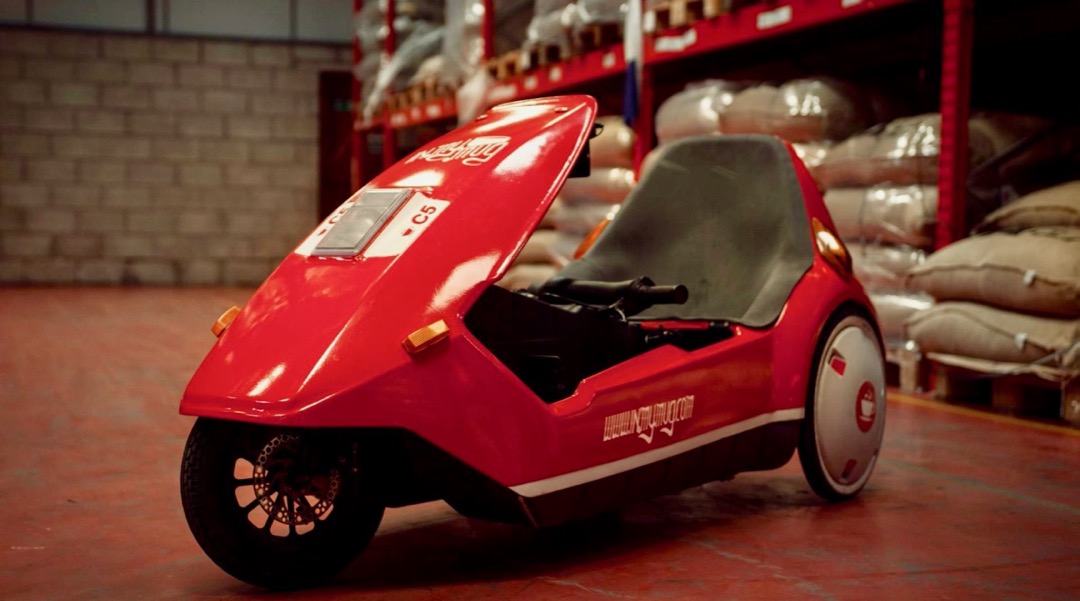
Saturday Mar 10, 2018
Episode 487 on Monday the 12th of March, 2018. Ecuador Hilda Pacha Washed Caturra
Saturday Mar 10, 2018
Saturday Mar 10, 2018
In the middle of the Amazon Rainforest, in the southeast of Ecuador, there is the province of Zamora-Chinchipe, home to Hilda’s farm. This farm has 10 hectares in total, and 7 of them are made up of virgin forests and native trees and the other 3 are where the coffee's grown.
This region counts with the only nogal reserve in the country and with the wood of these trees, they make cooking utensils for their kitchen. In this region, you can find more than 160 different bird species that migrate from farm to farm to find their perfect habitat and in the process cheer up hundreds of coffee growing families.
Its remote and exotic location, makes this farm unique and priviledged for its biodiversity and microclimates. The passionate and experienced producers in the region, geographic location, climatic conditions, and the rich soil, are the perfect mix to produce extraordinary coffee.
Even though coffee growers in this region still say they have many things to learn about producing specialty coffee, it's a region with very high potential. Hilda is part of the association called ACRIM that believes that “The sustainable progress and development of communities can only be done by getting together, working as a team, and respecting the environment together.”
In the cup this super sweet coffee reminds me of brown sugar and toffee, with a green apple and watermelon aftertaste.
- Country: Ecuador
- Province: Zamora - Chinchipe
- Cantón: Zumba
- Producer: Hilda Terest Pacha Cordero
- Altitude: 1,700 m.a.s.l.
- Total farm size: 10 Hectares
- Farm coffee growing area: 3 Hectares
- Varietal: Caturra
- Drying method: Fully sun dried on parabolic covered patios
- Processing method: Traditionally fully washed
- Fermentation time: 18 hours
CUPPING NOTES
Brown sugar, toffee, green apple, watermelon.
Clean cup: (1–8): 6
Sweetness: (1–8): 7.5
Acidity: (1–8): 6.5
Mouthfeel: (1–8): 6.5
Flavour: (1–8): 6.5
Aftertaste: (1–8): 6
Balance: (1–8): 6.5
Overall: (1–8): 6.5
Correction:(+36): +36
Total (max. 100): 89
Roasting Information
Medium dark - take it through first and then there is quite a long gap, you want the very first pops of second as the coffee hits the cooling tray.
"Quick Look" Guide
Brown sugar, toffee, green apple, watermelon.

Saturday Mar 03, 2018
Saturday Mar 03, 2018
This coffee is a staple, a big favourite and a stunning example of what a very fine coffee from Brazil should be. Brazil Fazenda Cachoeira Pulped Natural Yellow Bourbon from the Minas Gerais area is one of my all-time great cups. This coffee has always been fantastic, and it has such amazing memories for me.
This farm and its coffee sparked a massive change in what I thought I knew about coffee. I remember the first time I ever cupped this coffee: time stood still as the cup opened my mind to what great coffee is and can be. Gabriel, the farmer, continues to produce great coffee year on year. We have access to the best of the crop this year – and have had for the last three years – on a European exclusive. This is due to the special relationship we, and our importers, enjoy with Gabriel.
I like this coffee so much I used it for the UK Brewers Cup last year (where I made it to the semi-finals) to show off just how delicious a Brazilian coffee can be. To see my performance, please click below.
Fazenda Cachoeira da Grama has been in the Carvalho Dias family since 1890 and is located in São Paolo state, just three miles from the border with Minas Gerais state. It enjoys the typical characteristics of the mountainous Mogiana and Sul de Minas regions, and it's located at an altitude of 1,100–1,250 metres above sea level.
Gabriel de Carvalho Dias is one of Brazil’s leading agronomists. His family owns several farms, and they border each other in this area. With a total area of 417 hectares, Fazenda Cachoeira da Grama has a coffee plantation area of 165 hectares. Everything is done manually on this farm since its topography does not allow any kind of mechanisation. The mill is located close to the spa town of Poços de Caldas, which is 45 minutes away from the farm.
The Carvalho Dias family consider social and environmental sustainability to be very important. The farm has a programme of planting native species of trees to maintain a better ecological balance. There is also a school, a club and an official-size soccer field for the employees and workers. There are 47 houses, all with modern facilities. The waste water is treated in order to avoid polluting the stream that runs across the farm. The farm has a small hydroelectric plant and only buys energy during the peak harvest. Some of the original Bourbon varietal trees are as much as 108 years old.
The beans are harvested on a sheet and prepared by the ‘pulped natural’ process, which separates the greens. The beans receive the maximum possible attention after harvest so that they don't lose any of the body and cup qualities for which this region is famed.
In the cup expect hot chocolate with hazelnut, and a Jammy Dodger aftertaste.
- Country: Brazil
- Region: Mogiana (São Paolo)
- City: São Sebastião da Grama
- Farm: Fazenda Cachoeira da Grama
- Processing: Pulped Natural
- Varietal: Yellow Bourbon
- Altitude: 1,100–1,250 m.a.s.l.
- Owner: Lidolpho de Carvalho Dias and family
CUPPING NOTES
Hazelnut, hot chocolate, Jammy Dodger.
Clean cup: (1–8): 6
Sweetness: (1–8): 7.5
Acidity: (1–8): 6
Mouthfeel: (1–8): 6.5
Flavour: (1–8): 7
Aftertaste: (1–8): 7
Balance: (1–8): 6
Overall: (1–8): 7
Correction: (+36): +36
Total (max. 100): 89
Roasting Information
Medium dark – finish the roast just before second crack gets going.
"Quick Look" Guide
Hazelnut, hot chocolate, Jammy Dodger.
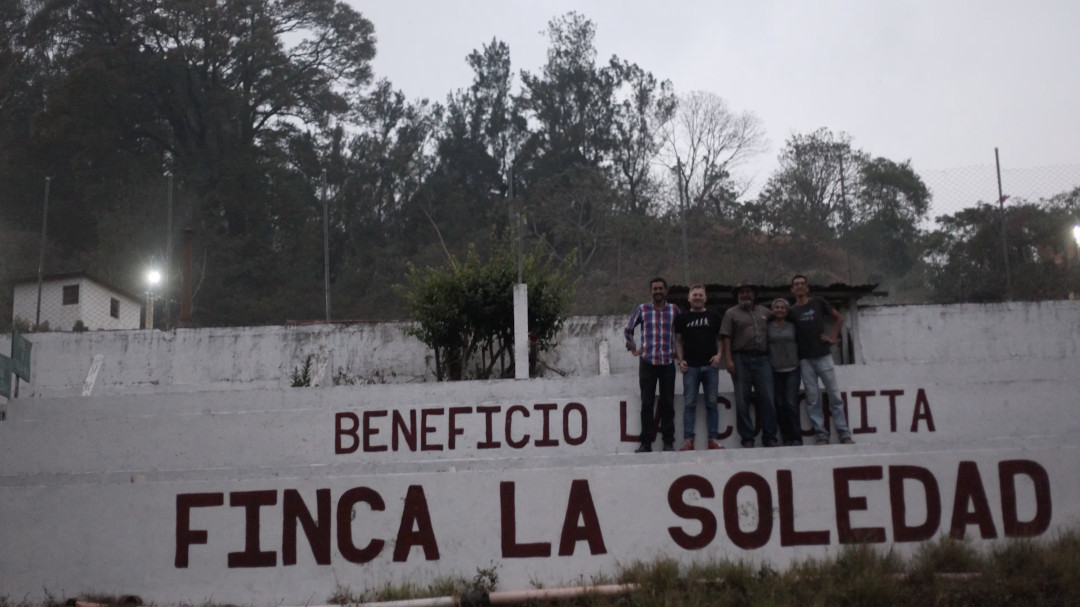
Saturday Feb 24, 2018
Saturday Feb 24, 2018
An In My Mug exclusive coffee roasted only for subscribers on Friday the 23rd of February, 2018.
Raul Perez has grown up around coffee, he comes from a fifth generation coffee farming family on his father's side, and a third generation family on his mother's side. Coffee has always been part of his life. He has told me about stories his grandparents would share with him about their experiences.
But I think it's fair to say that Raul has made plenty of his own coffee stories in his ten years of involvement in the specialty coffee industry.
It was ten years ago when Raul first became involved in the family business. After living in Guatemala City in his youth (so he was able to go to a good school and university), he returned to the farm where his family had still been working and commuting.
This coincided with a visit from an international buyer who made the family view coffee production in a different way. The speciality market was blossoming and the visitor gave them new ideas for varietals, picking, and processing that changed the direction of their farm and their cup quality. As Raul puts it, they began to work in a "more interactive way".
Finca La Soledad has been a Pérez family coffee farm since 1895, the farm is located in Acatenango, near to the Acatenango volcano. It has a great microclimate and an altitude of 1,650 metres above sea level.
The Pérez family invested heavily in their mill, rebuilding it with the environment in mind. They have a clever system through which they are able to recycle the water they use for processing many times.

Raul and his dad Henio work together on the farm to raise quality standards every day. Since that visit which sparked the changes, they have built a cupping and roasting lab on the farm and Raul has been roasting and cupping samples of days' pickings so they can learn at farm level what they can do to improve the cup.
The first time I met Raul was at a friend's wedding in Guatemala. I didn't know him (like most of the other guests), but we got talking and I enjoyed his company. At no time did he try to push his coffee on me, and I think only in passing did he say his family worked in coffee.
Raul was so kind he offered to take us back to our hotel that evening to save us having to get in a dodgy cab in Guatemala City.
I have an exporting partner in Guatemala who sent me this amazing sample, which I decided there and then we had to but. I was only after I committed to buying the coffee that I found out it was from Raul's farm.

Since then I've been lucky enough to visit the farm and meet the whole family. A fond memory that will stay with me is sitting on the unused drying patio with them all, enjoying a beer and watching the sun go down. They are a professional team and a lovely, warm family.
All our lots from La Soledad this year are washed coffees - meaning they are soaked in water to remove the fruit from the beans. This fermentation process plays a key part in developing the flavours that make a great coffee something special. It’s a super interesting (and complex!) part of the beans journey from the plant to us and one which clever producers like the Perez family are really starting to explore and experiment with.
In the cup expect a thick, sweet coffee. It’s golden sugar and cream, shifting in to chocolate coated raisins on the finish. This is the heaviest and gloopiest of the lots from the farm which really kicks that chocolate up a notch!
- Country: Guatemala
- Region: Acatenango
- Producers: Raul Pérez & Family
- Farm: Finca La Soledad
- Altitude: 1,650 m.a.s.l.
- Varietals grown: Caturra, Catuai, Bourbon, Typica & Pache
- Processing method: Washed
Cupping notes: Golden sugar, cream, chocolate coated raisins.

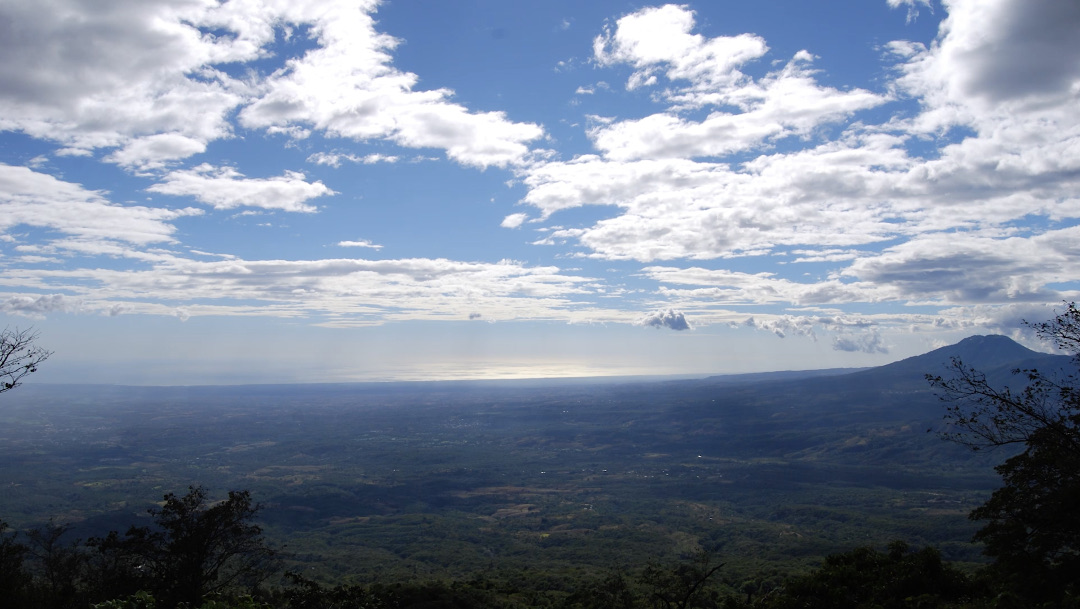
Saturday Feb 17, 2018
Saturday Feb 17, 2018
A coffee that I first fell in love with waaaaaaay back in 2007 is thankfully back for another year. After many years without it, I was massively excited to get this farm and coffee back two years ago, and I'm even more excited to be able to offer this coffee once again.
Finca Alaska is located just one hour from Santa Ana city. It's on the northwest slopes of the Santa Ana volcano, which is one of the most amazing coffee growing areas in El Salvador. It is owned by Ernesto Menéndez of La Ilusion fame – or Neto, as we like to call him! This is a name you should be familiar with by now, because I think you know how much I love the coffee that this amazing man grows. I often get asked what my favourite coffee of all time is and I will never say exactly (although my friends know the true answer), but I always narrow it to three coffees; one of them is definitely from Neto.
This is a coffee that we first saw back in 2007 (check out 2007 Steve and Neto in the pictures!) and I was desperate to have a long-term relationship with the grower. Due to some politics and miscommunication, it slipped through our fingers. The following year we bought coffee from La Ilusion, but it always felt like there was a piece of the jigsaw missing. I managed to get my hands on Finca Alaska four years later in 2011, and another four years later in 2015 I did it again. Now here we are in 2018, and we have it back once more. I will keep doing my best to not let it be four years until we see Finca Alaska again, I promise!
In the cup this tastes like a Cadbury's Dairy Milk bar left in the sun for just a little too long, with red grape and fresh lime acidity. It has a super sweet and clean finish.
- Country: El Salvador
- Region: Apaneca-Ilamatepec mountain range
- Nearest city: Santa Ana
- Farm: Finca Alaska
- Farmer: Juan Jose Ernesto Menéndez Argüello
- Altitude: 1,620 m.a.s.l.
- Farm size: 3.15 hectares
- Coffee growing area: 3.15 hectares
- Variety: Bourbon
- Processing system: Washed and sun dried
- Type of shade: Pepeto peludo, gravileo, cypress, copalchi, etc.
- Average annual rainfall: 2,100 mm
- Average temperature: 18º C
- Type of soil: Sandy loam
- Fauna: Armadillos, torogoz, agouti, snakes, squirrels, orioles, deer, hawks and rabbits
- GPS coordinates:
- Latitude: N 13º 52’ 22.2’’
- Longitude: W 89º 36’ 22.6’’
CUPPING NOTES
Cadbury's Dairy Milk, melted milk chocolate, red grape, lime.
Clean cup: (1–8): 7
Sweetness: (1–8): 7
Acidity: (1–8): 6
Mouthfeel: (1–8): 6.5
Flavour: (1–8): 6.5
Aftertaste: (1–8): 6
Balance: (1–8): 7
Overall: (1–8): 7
Correction:(+36): +36
Total: (max. 100): 89
Roasting Information
Medium to medium dark – get through first crack, and then slow it down. You want to be dropping just on the cusp of second crack.
"Quick Look" Guide
Cadbury's Dairy Milk, melted milk chocolate, red grape, lime.
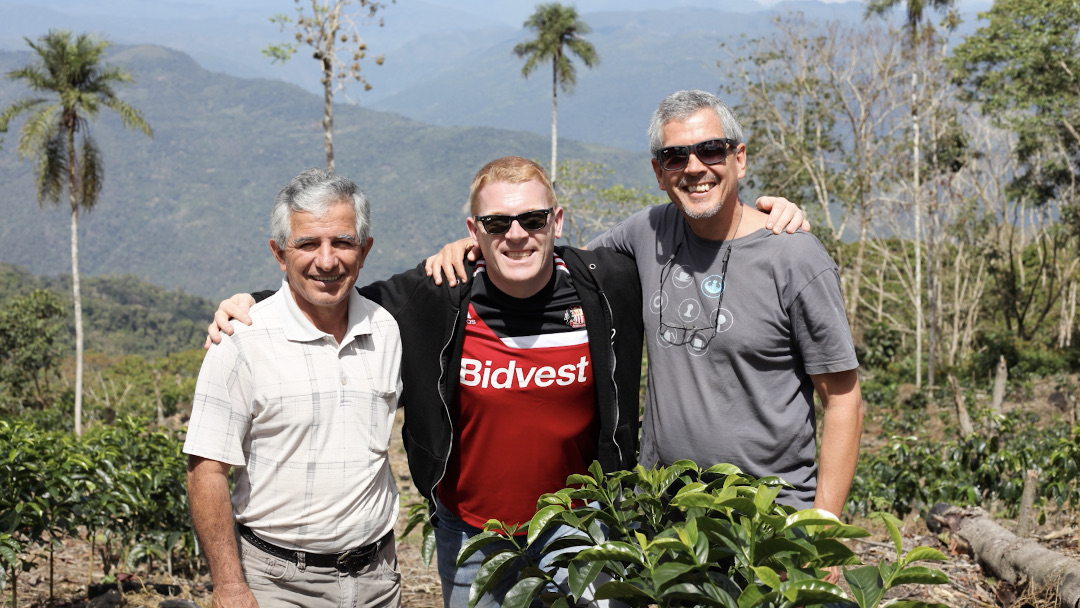
Saturday Feb 10, 2018
Episode 483 on Monday the 12th of February, 2018. Bolivia Don Carlos Washed Caturra
Saturday Feb 10, 2018
Saturday Feb 10, 2018
Due to the complications within the Bolivian coffee industry, many of the smaller Bolivian farms we have worked with in the past are no longer producing coffee. Whilst this has created some challenges for us, it has had a much more significant impact on our exporting partners AgriCafe, who have been working with these growers for many years. As a result, AgriCafe have decided to begin farming for themselves, in an effort to demonstrate what can be achieved with the application of more modern techniques and a scientific farming approach.
AgriCafe now manage seven farms, and these are collectively known as the Buena Vista Project. Finca Don Carlos is the second farm of the project, and it was planted in Caranavi in 2014.
The farm is named in honour of Don Carlos, the oldest and most unconditionally awesome employee of AgriCafe. He was there at the start of the specialty coffee trend and, together with Pedro, helped to build the wet mill in Caranavi. To show their gratitude for all his good work, the company decided to give him partnership of the farm.
This farm, along with the other Buena Vista project farms, is run by Pedro Pablo Rodriguez, the son of Pedro Rodriguez who owns AgriCafe. AgriCafe first bought their farms in 2012, when it became clear they were facing rapidly decreasing coffee production across the country. They have 12 farms in total and this is one of 8 in the Caranavi region (the traditional coffee producing area of Bolivia). Pedro Pablo studied agronomy in Honduras and bought techniques he had learnt there to the Buena Vista Farms.
In 2016, farms surrounding Don Carlos suffered badly with Leaf Rust (also called Roya). This caused a substantial drop in production, but the farm developed a strong program to combat the disease, which they can now use when other farms are affected.
This is a washed Caturra lot containing both red and yellow fruit, the cherries are left for 15 hours to allow the fruit to begin to break down before it goes through the mechanical washing process.
In the cup a Mars a day helps you work, rest, and drink coffee! There's a Mars Bar mix of chocolate, nougat and caramel which is finished off with soft yellow fruit - think tinned peaches.
- Country: Bolivia
- Region: Bolinda - Caranavi
- Producer: AgriCafe
- Farm Name: Don Carlos
- Elevation: 1,550 – 1,650 m.a.s.l.
- Varietal: Red & Yellow Caturra
- Shade plants : Native species
- Other farm products: Timber
- Processing Method: Fully washed
- Washing: Mechanical
- Fermentation: dry – 15 hours
- Drying time: Stationary Dryers
- Drying time: 77 hours
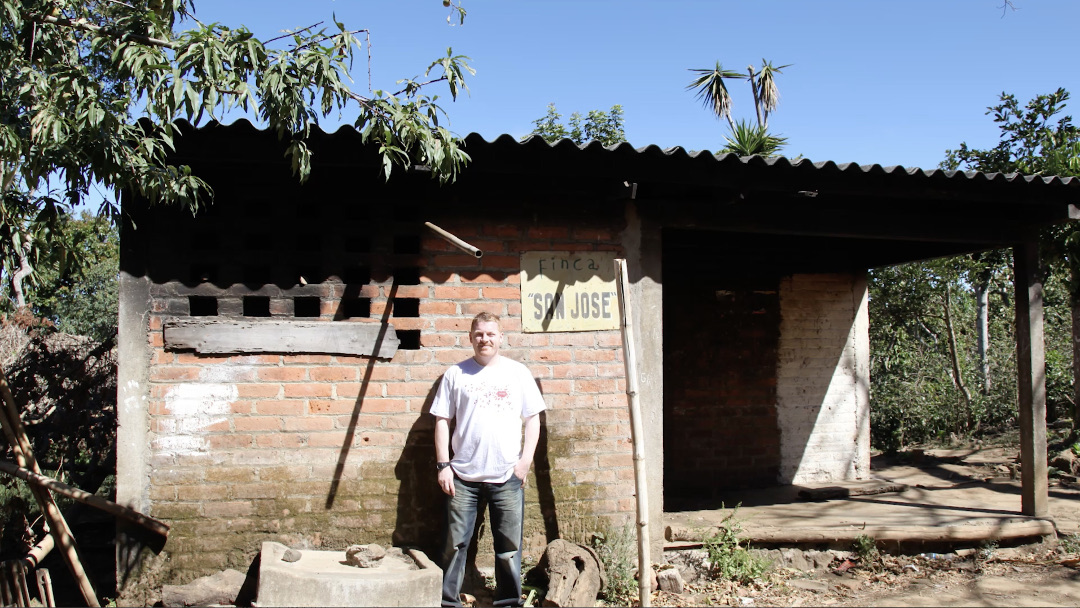
Saturday Feb 03, 2018
Saturday Feb 03, 2018
Finca San José is the pride and joy of the Rodríguez family, and is now in the hands of a fourth and fifth generation of coffee producers. The story begins in 1815, when José María Rodriguez and Josefina Rodriguez (great-grandparents) planted the first coffee trees with their own hands.
Through the generations, the farm has passed through the hands of many committed farmers like José's son, Israel Rodriguez. He was then followed by Jose Maria Rodriguez, who took care of the farm until it came to Gloria Mercedes Rodriguez Fontán, the most recent owner.
Ever the strong woman, Gloria has overcome gender barriers in an industry that has historically been the province of men, and she personally supervises every step at the farm level. Gloria not only takes care of San José but, together with her siblings' support, she manages five other small farms which collectively add up to 38 hectares.
The mountain slopes of Finca San José are fully shaded by trees that help to maintain and preserve the crop and the surrounding environment. In addition to the trees' diversity, the farm is home to a variety of wild animals and birds, which can be seen in their natural habitat. San José is nested in the northwestern slope of an extinct volcanic crater, which holds a small lagoon inside it. The lagoon is named Nymph Lagoon, due to the abundance of water lilies.
San José has seventeen full-time workers performing several activities, such as shade tree and coffee pruning, vegetative tissue renewing, and weed control. All of this work is done skillfully by hand. Approximately 60 more seasonal workers assist in the harvest process, earning their livelihood from picking and selecting coffee cherries only at the peak of ripeness. The people who harvest coffee have extensive experience and share a commitment of growing a superior quality coffee.
Gloria believes in maintaining highly motivated staff; the farm's permanent workers are receiving almost 10% above the legal wage, while the seasonal workers received almost 50% more during harvest due to the importance of this specific task for the coffee's end quality.
One of Gloria’s major blessings is to have Antonio Avelino as her farm manager or 'mandador'. His level of commitment, knowledge and shared philosophy of quality makes him an integral part of this effort.
At Finca San José, coffee goes through extensive quality control in addition to being grown under standards that support specialty coffee production. The unique micro-climate conditions include an average altitude of 1,500 metres above sea level, an average temperature of 17°C, and rich and loamy clay soil; and the coffee grown is mainly Bourbon variety.
Some other works done to the farm recently included three foliar fertilizations and two soil fertilizations, including one of organic fertilizer named 'Huisil', which is based on soil studies to ensure specific requirements. Where possible, workers ply the farm with stem bending or 'agobio', and they perform coffee shade pruning to balance sunlight and shade requirements under sustainable levels. They also perform weed control, mainly manually.
One of Gloria’s commitments is to reinvest an important share of the economic benefits from this activity into the farms, impacting the people who toil the fields and maintaining the quality of the production chain from seed to cup.
In the cup I want you to imagine a cherry truffle chocolate that's been drenched in red wine. This big bodied, well structured and balanced coffee finishes with milk chocolate and a gentle sherry like kick.
- Country: El Salvador
- Department: Ahuachapán
- Municipality: Apaneca
- Nearest city: El Saitillal
- Farm: Finca San José
- Owner: Gloria Mercedes Rodriguez Fontán
- Farm manager: Antonio Avelino
- Type of shade: Pepeto, inga sp, and other native trees
- Processing method: Washed
- Varietal: Red Bourbon
- Average annual rainfall: 2,100 mm
- Altitude: 1,500 m.a.s.l.
- Average temperature: 17ºC
- Type of soil: Clay loam
- Mill and company where lot was processed: Beneficio El Carmen, Agrícola San Agustín, S.A. de C.V.
- Fauna: Armadillo, grey fox, small wildcats, agouti paca, hawks, pocket gopher, magpie, turquoise-browed Motmot, and others.
- GPS coordinates: Latitude: N 13º 52 52.3 / Longitude: W 89º 48 24.5
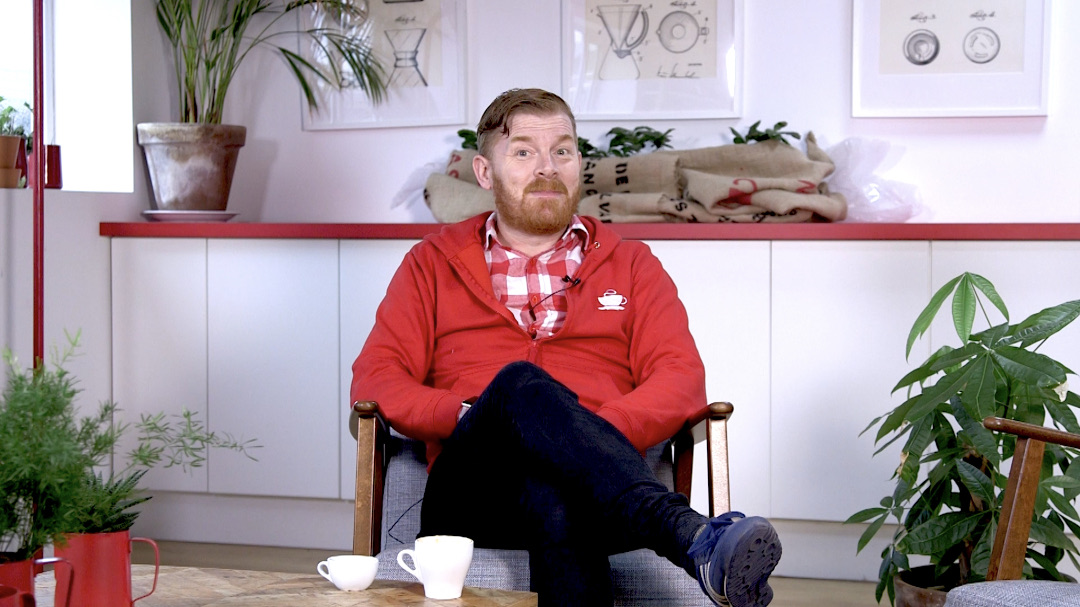
Saturday Jan 27, 2018
Episode 481 on Monday the 29th of January, 2018. Guatemala El Limon Washed Pache
Saturday Jan 27, 2018
Saturday Jan 27, 2018
I first discovered El Limon on my trip to Guatemala in early 2013. At the time we'd never bought coffee directly from Guatemala, but since then this has become one of our strongest and most amazing relationships.
My friend Raul (whom you may remember as the World Barista Champion of 2012!) in Guatemala had been buying coffee from these guys for a couple of years, and he was very keen for me to go and meet them. Located around an hour's drive to the east of Guatemala City in the small town of Palencia, this farm sits at an altitude of between 1,600 and 1,800 metres above sea level. It's owned by Guadalupe Alberto Reyes, who's also just known as Beto. He used to be the Mayor of Palencia and helped to build and develop the town.
Palencia is not part of the eight regions of coffee as defined by Anacafé, but you can see a lot of development in the zone, and this farm is a perfect example of that development. I like being in places that are working to be hot and up-and-coming, as well as those that are established players.
One of the main reasons I love El Limon is the desire to experiment; the farm mostly produces Bourbon and Caturra, but also plays around with a few other varietals. The experimentation comes from Beto's motivation; he has really focused on the farm over the last couple of years. He wanted to take more care in every step they take – from picking to processing, to shipping – and also take more care in the agronomy of the farm. This is very much a family affair: his wife and son also work on the farm, along with Beto's siblings. In fact, his son is studying agronomy at the local college for the benefit of the farm.
Pache is a dwarf mutation of Typica. It's high-yielding, and it grows well between 900 and 1,800 metres above sea level. It was first seen in Guatemala and has since been crossed with some other varietals because of its high yield, and its resistance to pests and disease.
The dedication and care devoted to each step of production is reflected in the fact that the family has built a new wet mill so that they can separate different lots and have control over the quality of the coffee. Previously the mill could process only one lot; now they are able to process many lots, and keep separate days' pickings and varietals in their own parcels. With this wet mill came another opportunity, which was for neighbours and people within the region of Palencia to bring their coffees to the mill where they could get them processed. Again, another sign that this is a hot spot for Guatemalan coffee.
As time moves on, Beto doesn't want to stand still and is continuing to invest in the farm. He showed me lots of new planting during my recent visit, and a lot of building work around the wet mill. He is also building a QC lab and new accommodation for people working on the farm. It was a real hive of activity.
Beto and his family have always been the perfect hosts whenever I visited the farm. They are such welcoming people and take great pride in showing me around their farm. One of the kindest things they've done for me is to welcome me into their home when I am visiting, and they always prepare the most amazing meals! When you travel as much as I do, mid-trip you find yourself longing for something big, home-cooked, and not from a restaurant or roadside pop-up cafe. Traditional Guatemalan meals are just the ticket, and I always look forward to the food – but mainly I look forward to the company.
In the cup this reminds me of Greek yoghurt and lemon rind but the finish does a right turn into dark chocolate and delicate allspice.
- Country: Guatemala
- Region: Palencia
- Farm: El Limon
- Farmer: Guadalupe Alberto Reyes a.k.a. 'Beto'
- Altitude: 1,600 m.a.s.l.
- Varietal: Pache
- Processing method: Washed
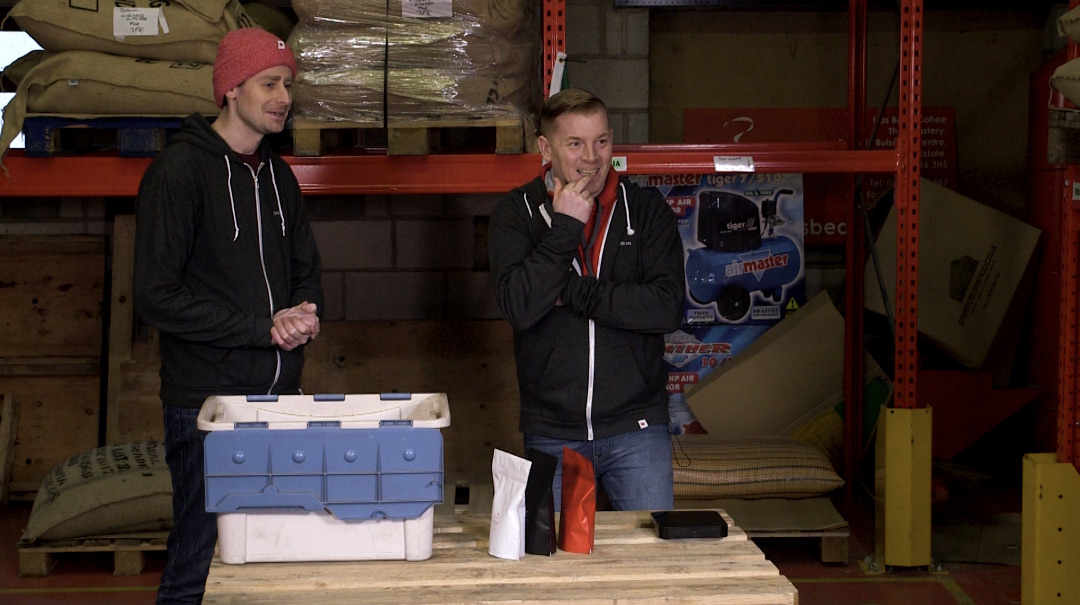
Saturday Jan 20, 2018
Saturday Jan 20, 2018
Hi there folks, listen up! This is 1 of those coffees that has quite a long name that contains quite a bit of information, and there's even more that I didn't put in there as I wanted to make it a little bit shorter too! So - let me explain all the bits...
'Costa Rica' (I'm guessing you worked this out!) is the country it's from.
'Don Mayo' is the name of the micro mill where the coffee is milled and processed.
'Finca La Loma' is the farm that the coffee was grown on.
'Yellow Honey' is the processing method (if you want to learn a little more about processing, be sure to check out our processing videos).
I've left the varietal information out of the total name as this is a mix of Villa Sarchi & Caturra, you can find more information about them both in our varietal archive.
See, I told you it was all important stuff!
Finca La Loma is located at an altitude of 1,850–1,900 metres above sea level in the Tarrazú region of Costa Rica, and it's owned by Hector Bonilla and his family. We first had a chance to enjoy coffee from this awesome farm/mill combo in 2014, and I'm delighted to see it back for another year. I came across it on my trip to Costa Rica in January 2013, because we were already working with the Bonilla family and their coffee from the neighbouring Finca Bella Vista.
The Don Mayo mill is somewhat of a celebrity in the world of coffee mills, winning a beautiful selection of awards for its coffees which are bought by many top buyers from around the world, and I am (of course) very pleased to be one of them.
In the cup this unique coffee hits you with peach and sharp nectarine, a white wine like acidity and finishes on fresh raspberry juice.
- Country: Costa Rica
- Region: Tarrazú
- City: Llano Bonito de León Cortes
- Farm: Finca La Loma
- Farmer: Hector Bonilla
- Micro mill: Don Mayo
- Altitude: 1,850–1,900 m.a.s.l.
- Variety: Villa Sarchi & Caturra
- Processing system: Yellow honey and sun dried
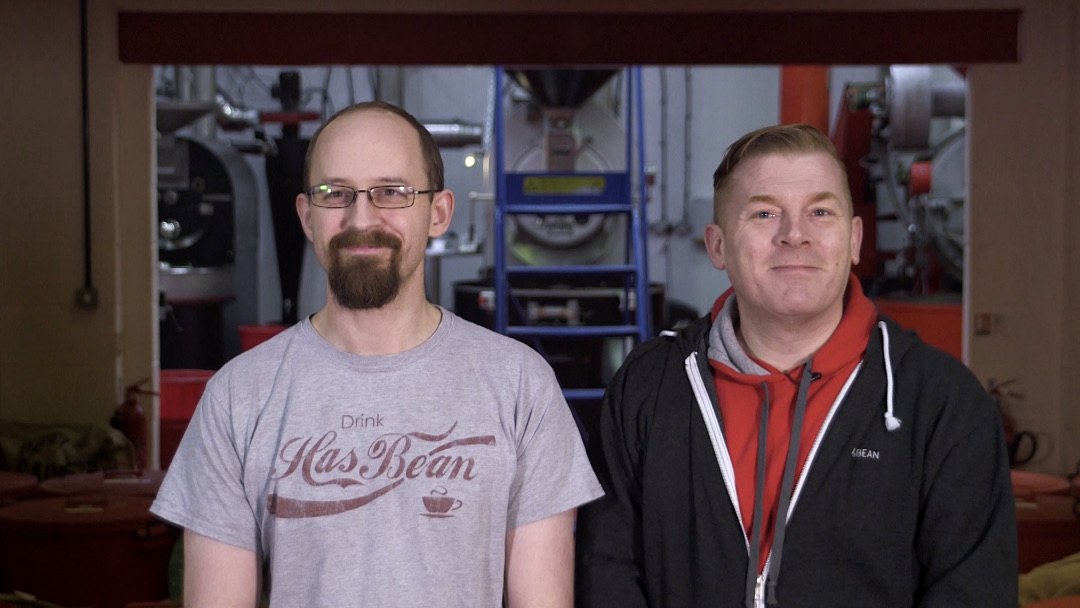
Saturday Jan 13, 2018
Saturday Jan 13, 2018
This is a brand new farm to us from the department of Jinotega, in the community of Lipululu. Although brand new, it comes from people who we know well and have worked with for over ten years. The family Mierisch (who you may recognise from such farms as Limoncillo, Mama Mina, Escondida and Milligros) have worked with us over that time to bring us delicious coffee.
Much of that deliciousness is thanks to their amazing processing, and Eleane is in charge of that. She works in the family business but has never owned her own farm – until last year, when she acquired Las Delicias.
The farm is located in the region of Jinotega at an average altitude of 1,450 metres above sea leve. It is located next to another Mierisch farm, which you might have heard of; it's called San José.
Eleane knows the area very well, and knows the land and what it's capable of producing. Add to this her passion for coffee, and you can start to understand why she wanted to produce coffee on a farm of her own.
The Longberry varietal is the fruit of some of the amazing experimental work that's taking place at Limoncello, another Mierisch farm. To explain a little bit of the story behind it, I'll hand over to another Mierisch that I just so happen to know. Oh hi there, Erwin!
Here my 'story' begins back in mid-2001. I sound like a grandfather ...
My father and I were coming back from visiting some top farms in Nicaragua, as we sometimes did – and do – in order to learn from our neighbours. If we discover anything worthwhile we then implement those things to improve efficiency and quality on our own farms.
As we drove past the UNICAFE experiment station Juanetillo, which had gone under, a man on the side of the road flagged us down and explained to us how the experiment station had closed down and that his 'severance' was tools and coffee seeds since they did not have the cash to pay him. He asked if we would be interested in helping him out by purchasing these items off of him. In all honesty, I was not very happy that my father forced me to stop to see what this man wanted; therefore, I was not very receptive to his offer, but I purchased a bag of seeds and old beaten up shovels. I gave no immediate thought to the 20 lb bag of coffee seeds that was labelled as JAVA.
My father later showed these seeds to our then-supervising agronomist Ing. Patricia Contreras, who had worked at that research station, and she was ecstatic. She told us about how great this coffee was, but also that it was not very productive nor resistant to disease, as she recalled from running this study at Juanetillo back in the '80s. She also said that the real name for it is Longberry and that it has its roots in Ethiopia.
We began to run some more experiments – various altitudes and processing methods – and have been learning how to manage it since.
---
As far as we can tell the Longberry varietal is a Typica-type coffee because of its bean shape, as is the Geisha. Its physical appearance is a uniform seed that is elongated and has been described by several of our customers as an 'Ethiopian Long Berry type'.
In the cup there are lemons and lychees with a milk chocolate sweetness. It has a complex and super interesting finish.
- Country: Nicaragua
- Municipality: Lipululu
- Region: Jinotenga
- Farm name: Las Delicias
- Farmer: Eleane Mierisch
- Farm size: 20 manzanas (hectares)
- Coffee growing area: 20 hectares
- Harvest months: December–February
- Altitude: 1,450 m.a.s.l.
- Varietal: Longberry
- Processing method: Washed
- Diurnal temperature cycle: average high: 28°C; average low: 20°C

Saturday Jan 06, 2018
Saturday Jan 06, 2018
The Vieira Ferreira family has specialised in coffee production for three generations and is now headed by Adolfo Vieira Ferreira, whose attention to detail and commitment to producing top-class specialty coffee is second to none.
The farm employs a high number of skilled workers to carry out most of the production process by hand, in order to guarantee quality. They do everything, from soil preparation for planting to hand-picking the ripe cherries. In return, the farm looks after its workers. Permanent workers and their families live on-site and are provided with schooling for their children, professional training and environmental education.
The farm also takes environmental sustainability seriously and abides by all Brazilian environmental protection laws. Its native forests are set aside as protected reserves and are often visited by tourists, school children and ecologists. The farm also regularly plants new trees, particularly around its water sources, in order to maintain the local ecosystem.
Passeio’s coffee is picked by hand only when the cherries reach an advanced stage of ripeness, to avoid processing green beans. Pulped natural lots such as this one are pulped and then, rather than being soaked and washed, they are immediately transferred to the patios for drying, with the bean’s sticky outer mucilage still attached. The coffee is then kept in wooden resting bins for a minimum of 60 days before the final dry milling, and is sorted immediately prior to export.
The farm cultivates several different varietals: this Rubi lot, a hybrid of Mundo Novo, and Catuaí. This single-varietal lot was harvested and processed separately from other lots to maintain its own distinct characteristics.
In the cup expect delicious creamy milk chocolate with caramel and Brazil nut and a finish of apricot jam.
- Country: Brazil
- Region: Minas Gerais
- City: Alfenas
- Farm: Fazenda Passeio
- Owner: Adolfo Henrique Vieira Ferreira
- Varietal: Rubi
- Processing: Pulped Natural
- Drying method: Sun dried on patios
- Altitude: 1,100–1,200 m.a.s.l.

Saturday Dec 30, 2017
Episode 477 on Monday the 1st of January, 2018. Christmas Espresso Blend
Saturday Dec 30, 2017
Saturday Dec 30, 2017
It just wouldn't be Christmas without a Christmas blend now, would it?!
Now in its TWELFTH (!) year of Christmas blends here at Has Bean, this is our take on the perfect espresso to enjoy at this wonderful festive time of year.
This blend can only be roasted throughout the month of December. Some fella in a red suit (no, not me!) said so, so make sure to enjoy it while you can!
- 50% El Salvador Finca Alaska Washed Bourbon
- 30% Guatemala El Limon Washed Pache
- 20% El Salvador Finca La Ilusion Natural Bourbon
In the cup you get an insight into my Christmas: dark chocolate, dried fruit, boozy and orange peel. Yes that's the Steve Leighton Christmas in coffee descriptors!
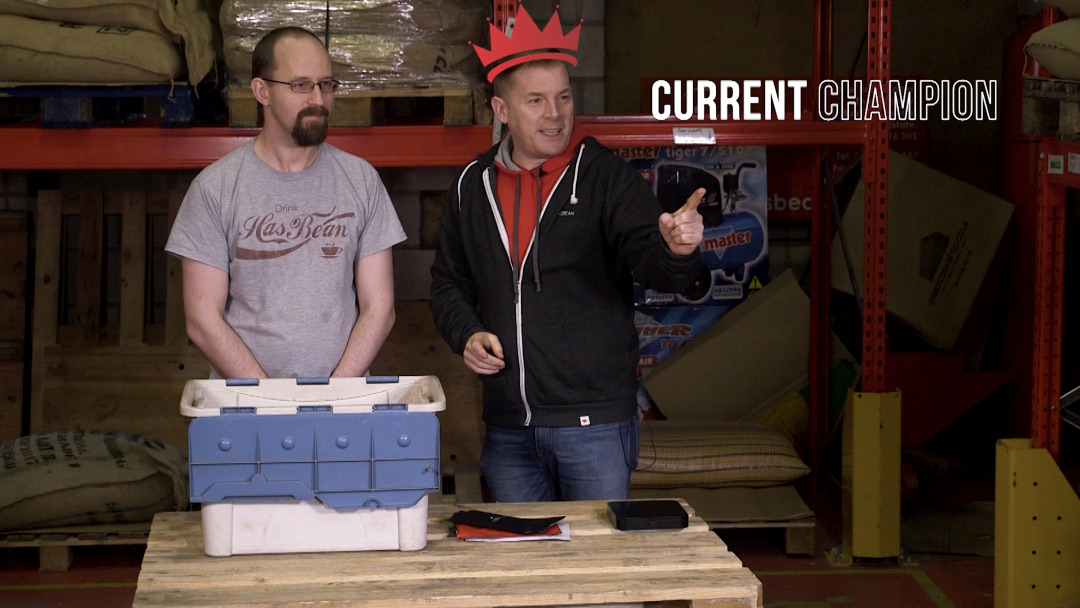
Saturday Dec 23, 2017
Episode 476 on Monday the 25th of December, 2017. Christmas Filter Blend
Saturday Dec 23, 2017
Saturday Dec 23, 2017
It just wouldn't be Christmas without a Christmas blend now, would it?!
Now in its TWELFTH (!) year of Christmas blends here at Has Bean, this is our take on possibly the best cup of filter coffee you'll enjoy this festive season.
This blend can only be roasted throughout the month of December. Some fella in a red suit (no, not me!) said so, so make sure to enjoy it while you can!
- 60% Kenya Kiriga Estate AB Washed
- 40% Ethiopia Mokanissa Bulega Washed
In the cup this delicate flower of a coffee has lemon rind, a sugar-type sweetness and a big bunch of flowers that hit you in your mouth on the finish.

Saturday Dec 16, 2017
Saturday Dec 16, 2017
On top of the Nymph Lagoon (a volcanic crater nested in Apaneca) Finca La Lagunita is located at an altitude of 1,650 metres above sea level. Within its 4.9 hectares, 3.5 ha. are dedicated to coffee and it's mainly Bourbon and Typica that mainly grow, there's a bit of Elephante too. The top of the hill has been kept as a native forest, a sanctuary of trees that are hundreds of years old, and as I'm sure you can imagine an area like that also attracts loads of birds and animals so it serves as a wonderful nature reserve too.
Who grew this coffee? Gloria Mercedes Rodríguez Fontan. She's a fourth generation coffee grower and owns + personally supervises six small farms located in the Apaneca-Ilamatepec mountain range: San José, Mamatita, El Porvenir, Nejapa, Nueva Granada and La Lagunita.
This piece of land was Gloria's first farm, and she holds it very close to her heart. When her father, José María Rodríguez died in 1975 it was time for her to learn all the responsibilities of coffee farming, he symbolically presented her with his higher altitude farm: La Lagunita. Gloria's father’s plan was to have his only daughter earn her own money to pay for her university and expenses.
I was lucky enough to get to visit the farm on my trip to El Salvador 2 years ago, you can read a little about it if you like...
The secret diary of a green coffee buyer aged 40 and 1/4
A trip around Central America Day 7 Apaneca San Jose
Gloria works under strict specialty coffee standards such as only harvesting fully ripe cherries, careful milling, appreciative pruning, etc., while she is blessed by amazing coffee terroir conditions such as altitude, sandy loam soils and rich in organic matter, among others. Coffee pickers are selected from her staff based on their experience and passion, and their understanding on the requirements to obtain high-quality coffee.
Each year Gloria employs around 35 people during the harvesting season, and all year round she manages a permanent "winter works" team of 15 people. The idea is to have a solid trained and skilled working group that receive better wages and working conditions. Gloria pays during harvest around 90% above legal minimum wage to give workers incentive and assure the best coffee cherries possible. After every production cycle, she gives a proportional bonus according to every week of labour of her “winter workers” that normally derives into a 1.2 months extra of income for them.
La Lagunita had four foliar fertilizations and two soil fertilizations, its soil type is predominantly sandy loam, and rainfall is between 2,000 to 2,700mm annually. With the additional income from auctioned coffee, Gloria plans to improve husbandry practices at her farm and keep focus on improving quality at both the farm and mill level.
This coffee is a washed coffee and I get quite a few emails asking me what on earth that means, well my friends...I made a video!
In the cup this is a classic El Salvador with milk chocolate loveliness and a walnut edge to it. However, it gets a little more complex than that, with hints of pear and an icing sugar sweetness that carries on in the aftertaste.
- Country: El Salvador
- Department: Ahuachapán
- Municipality: Apaneca
- Farm: La Lagunita
- Farmer: Gloria Mercedes Rodríguez Fontan
- Farm Size: 7 hectares
- Coffee growing area: 5 hectares
- Altitude: 1,650 m.a.s.l.
- Varietal: Bourbon
- Processing System: Washed

Saturday Dec 09, 2017
Saturday Dec 09, 2017
The story of Has Bean and Finca Limoncillo has been told many many times, but it's one that I really love to share. So much of where we are today has come from this relationship, and I'm super proud of everything that's happened in the past, as well as amazingly excited for where we can go in the future.
My relationship with Finca Limoncillo began in 2007, and back then we were buying their delicious coffee as part of a buying group. I loved it from the very first time I cupped it, and it was a coffee I just had to get. It was only after the auction closed that I discovered it was owned by a family in Nicaragua who were already good friends of mine, and indeed probably the only people I know from the whole country!
The following year I visited the farm with our importers and spent the whole trip begging them to bring the coffee in for us. Eventually, they caved in (possibly just to stop me pestering them!) and kindly did so.
This setup worked well for a time, but we received notice a couple of years ago that the importers were not going to be buying the coffee again (and for reasons other than the cup quality). This led to some frantic phone calls and a thorough search down the back of the sofa for loose change to fund buying twelve months’ worth of coffee all at once. There were many, many obstacles in the way of doing this deal, but we were lucky in that we were able to pull everything together in a very short amount of time.
The upside of all of this is that we now work directly with Finca Limoncillo instead of going via anyone else, and this is a relationship I’m super happy to have. This coffee has gone from a one-off Cup of Excellence buy to a fantastic long-term relationship.
Finca Limoncillo is located in Matagalpa and, at 171 hectares, it. Is. Huge! Situated at an amazing location, it boasts 9 waterfalls within the farm and is owned by the Mierisch family; as I have already said, they’re good friends, and also well-respected producers in Nicaragua. They’re known for their experimental processing, varietal work, and exceptional coffee.
The fact that the family are friends helps us drill down into the details of what they do for the people who work for them, and the information continues to prove to me that good people grow good coffee.
On the farm, the family:
- Pay their staff 30% more than what is typical minimum wage.
- Provide free housing for 60 families.
- Provide free electricity and running water for their workers' homes.
- Provide free food for all workers.
- Provide free daycare facilities for families to use.
- Provide free healthcare facilities.
- Employ on-site teachers who educate the staff and teach other skills, such as pottery and weaving. The goal is to help staff diversify their skills. The teachers are also paid twice the wages they would receive in the cities.
The coffees we receive from Limoncillo are fantastic and they come from a fantastic relationship. Erwin Mierisch has visited Stafford many times, and it's always a pleasure to have him around. Last time he was over he ended up at a Weird Beard tap takeover in Manchester, talking to two Weird Beards about crazy brewing / coffee farming ideas! A coffee from Finca Limoncillo (the 'Funky Red Pacamara') is used in two of Weird Beard's beers: Black Perle and Double Perle, both of which are mighty delicious beers!
So what's this Ethiosar varietal, I hear you ask? Well, this is the fourth year we've been lucky enough to have some, and it comes from the hard work of the Mierisch family and their cousin Ricardo. He owns a farm near to Limoncillo, but at a much lower altitude of 800 metres above sea level. Ricardo noticed that his yield and his plants were suffering and that they seemed to be becoming more suscep7tible to disease. He put this down to growing issues in Nicaragua, a change in climate, increased rains and his low altitude. But from experiments he was running on the farm, he noticed that this newly-spliced varietal he had put together was thriving. It was fruiting much more than the other plants and was not suffering.
The varietal, Ethiosar, is a stable hybrid plant. It's a cross of an Ethiopian variety (Sudan Rume) with a Sarchimor (a cross of a Villa Sarchi with a Timor variety). The offspring of this plant is then crossed once again with a Villa Sarchi, which is an improved Caturra / Bourbon from Costa Rica.
The Timor variety is the Robusta variety used to produce all the Catimors. In short, it only has a very small percentage of Catimor in it, thus making it very resistant to leaf rust in most parts of the world. The Sudan Rume is a very old variety of Typica from Ethiopia. Both Sudan Rume and Villa Sarchi are known for their great cup characteristics.
What Ethiosar does is increase production by up to 40% whilst only needing 2,800 plants per manzana, whereas with Caturra you would need 4,000 plants. This may not seem important until you begin to think that each plant needs fertiliser. So not only are you getting more yield but it's cheaper to grow because you need less fertiliser and less plants (plants have to be grown or bought), and it's also quicker to pick. On top of all of this, it's super tasty.
In the cup think green apple meets caramel down a dark alley and they mix themselves up. There's also an apple juice like acidity + a dark chocolate finish = leaving you wanting more!
- Country: Nicaragua
- Municipality: Yasica Norte
- Region: Matagalpa
- Farm name: Limoncillo
- Farmer: Dr Erwin Mierisch
- Farm size: 171 hectares
- Coffee growing area: 109 hectares
- Harvest months: December–February
- Diurnal temperature cycle: average: high 28° C, low 20° C
- Altitude: 1,200 m.a.s.l.
- Varietal: Ethiosar (Ricardo)
- Processing system: Pulped Natural
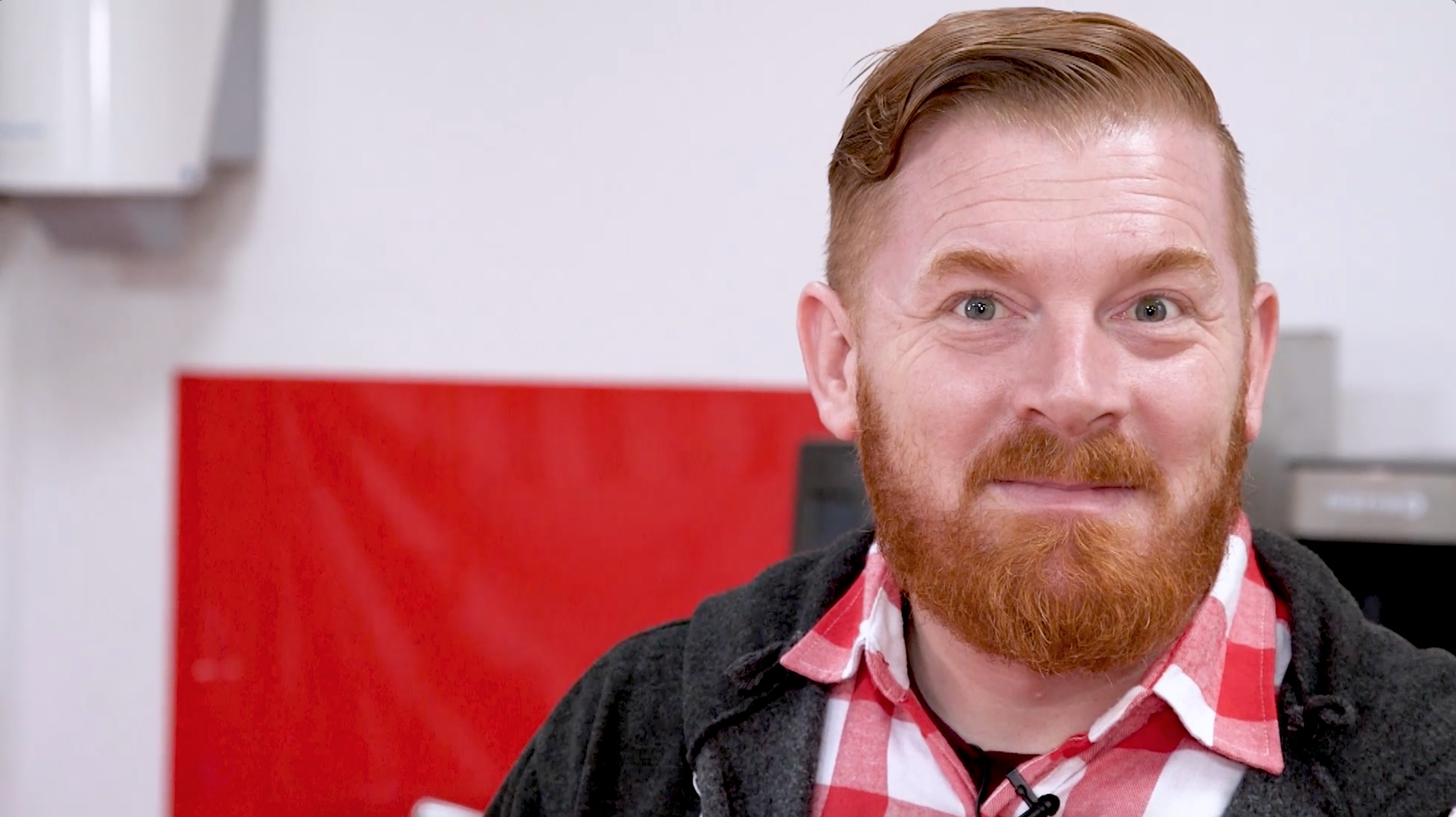
Monday Dec 04, 2017
Monday Dec 04, 2017
I first discovered El Limon on my trip to Guatemala in early 2013, at the time we'd never bought coffee directly from Guatemala; but since then this has become one of our strongest and most amazing relationships.
My friend Raul (who you may remember as the World Barista Champion of 2012!) in Guatemala had been buying coffee from these guys for a couple of years and was very keen for me to go and meet them. Located around an hour's drive to the east of Guatemala City in the small town of Palencia, this farm sits at an altitude of between 1,600 and 1,800 metres above sea level. It's owned by Guadalupe Alberto Reyes, who used to be the Mayor of Palencia and helped to build and develop the town.
Palencia is not part of the eight regions of coffee as defined by Anacafé, but you can see a lot of development in the zone, and this farm is a perfect example of that development. I like being in places that are working to be hot and up-and-coming, as well as those that are established players.
One of the main reason I love El Limon is the desire to experiment, it mostly produces Bourbon and Caturra but also plays around with a few other varietals. The experimentation comes from the motivation of 'Beto', who has really focused on the farm in the last three years. He wanted to take more care in every step they take – from picking to processing, to shipping – and also take more care in the agronomy of the farm. This is very much a family affair; his wife and son also work on the farm, along with Beto's siblings. In fact, his son is studying agronomy at the local college for the benefit of the farm.
The dedication and care devoted to each step of production is reflected in the fact that they have built a new wet mill so that they can separate different lots and have control over the quality of the coffee. Previously the mill could process only one lot; now they are able to process many lots, and keep separate days' pickings and varietals in their own parcels. With this wet mill came another opportunity, which was for neighbours and people within the region of Palencia to bring their coffees to the mill where they could get them processed. Again, another sign that this is a hot spot for Guatemalan coffee.
As time moves on Beto doesn't want to stand still and is continuing to invest in the farm, recently he showed me lots of new planting during my visit, as well as a lot of building work around the wet mill. He is also building a QC lab and new accommodation for people working on the farm, it was a real hive of activity.
Beto and his family have always been the perfect hosts when I have visited the farm, they are such welcoming people and take great pride in showing me around their farm. 1 of the kindest things they've done for me is welcome me into their home when I am visiting, and they always prepare the most amazing meals! When you travel as much as I do, mid-trip you find yourself longing for something big, home-cooked and not from a restaurant or roadside pop-up cafe...traditional Guatemalan meals are just the ticket and I always look forwards to the food, but mainly I look forward to the company.
In the cup expect a super hit of lemon and lime, then it pushes blood orange into the citrus party. Hints of milk chocolate can’t hide the beautiful crisp acidic finish.
- Country: Guatemala
- Region: Palencia
- Farm: El Limon
- Farmer: Guadalupe Alberto Reyes
- Altitude: 1,600 m.a.s.l.
- Varietal: Caturra
- Processing method: Washed
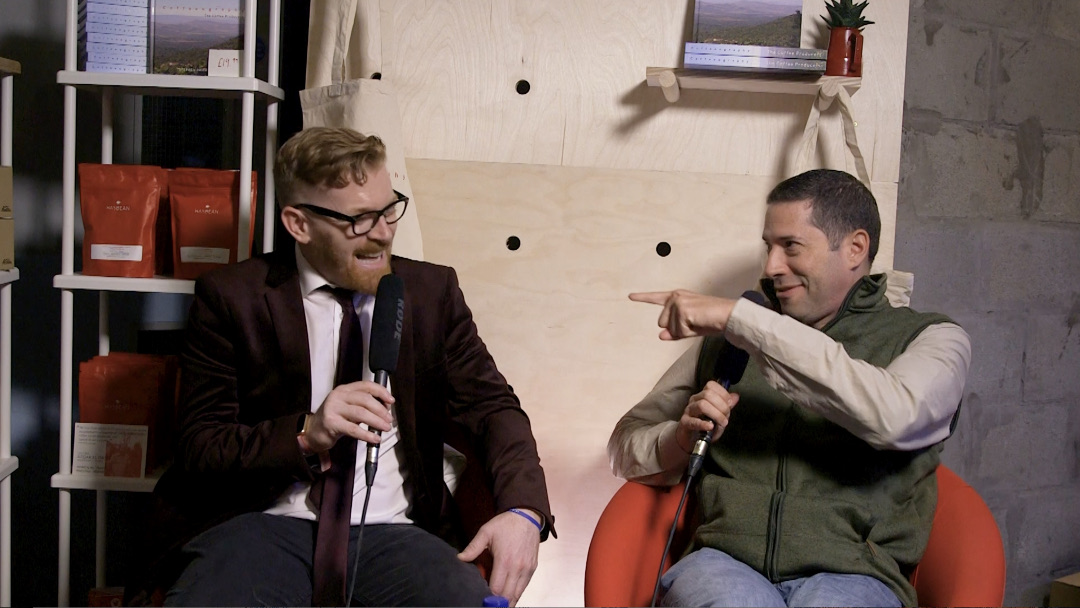
Saturday Nov 25, 2017
Saturday Nov 25, 2017
It brings me great pleasure to start typing this because 2017 marks the seventh year that we're roasting coffee from Finca Argentina and its farmer, the always awesome Alejandro Martinez!
Alejandro and I have actually been working together since 2008, and in that time it's gone from a working relationship to Ale being one of my closest friends. He became involved in coffee in 2008 as he had just relocated to El Salvador from New York, where he'd been working as a city banker. With his first son on the way and the hustle and bustle of New York no place to bring up a family, the draw of home and El Salvador was just far too strong to ignore.
While looking for work in El Salvador, Ale decided to help his father with some of his business interests and investments. His father had inherited several coffee farms from his grandfather and was unsure what to do with them. One of the investments pricked Ale’s interest – a farm called Finca Argentina. The reason it really got Ale's attention was that he saw the farm had once yielded loads of coffee but was now producing a fraction of its old yield. His father gave him permission to see what could be done to make the farm successful again.
Ale found out the farm had been classified for a Q auction back in 2005. Thinking there may be a specialty buyer out there, he and his cousin (who lived in London) went about sending samples to coffee roasters anywhere they could. One of those samples arrived at Has Bean Towers, just like a lot of other samples do, but – unusually – I liked the coffee. And the rest, as they say, is history.
Since then Finca Argentina has gone from strength to strength, but not without bumps in the road. In 2013 the farm suffered the worst harvest on record, with only 70 bags harvested due to a massive issue with leaf rust. But with investment and hard work, the farmers have bought a neighbouring farm; the future is amazingly bright for Ale, his father, his family and Finca Argentina.
This coffee is 100% Bourbon, as 70% of plant stock in El Salvador is. This heirloom varietal is one of the reasons why coffee from this country is right up amongst some of the best in the world. They have the perfect climate and conditions for this low yielding, high maintenance strain.
The farm is based in the Apaneca-Ilamtepec mountain range, and is near the town of Turin in the Ahuachapán department. Sixteen people work on the farm during the non-picking season, maintaining and tending to the plants. This number of workers goes up to 50 people during the picking period. The altitude of the farm is 1,300 m.a.s.l. The coffee is a washed process coffee, and it's sun dried on patios.
In the cup this coffee is super moreish with buckets of milk chocolate and caramel being thrown around everywhere. There's also a sweet whoosh of orange and a green apple acidity.
- Country: El Salvador
- District: Ahuachapán
- Municipality: Ahuachapán
- Nearest city: Turin
- Farm: Finca Argentina
- Owner: Alejandro Martinez
- Altitude: 1,300 m.a.s.l.
- Varietal: Bourbon
- Processing method: Washed
- Drying method: Patios
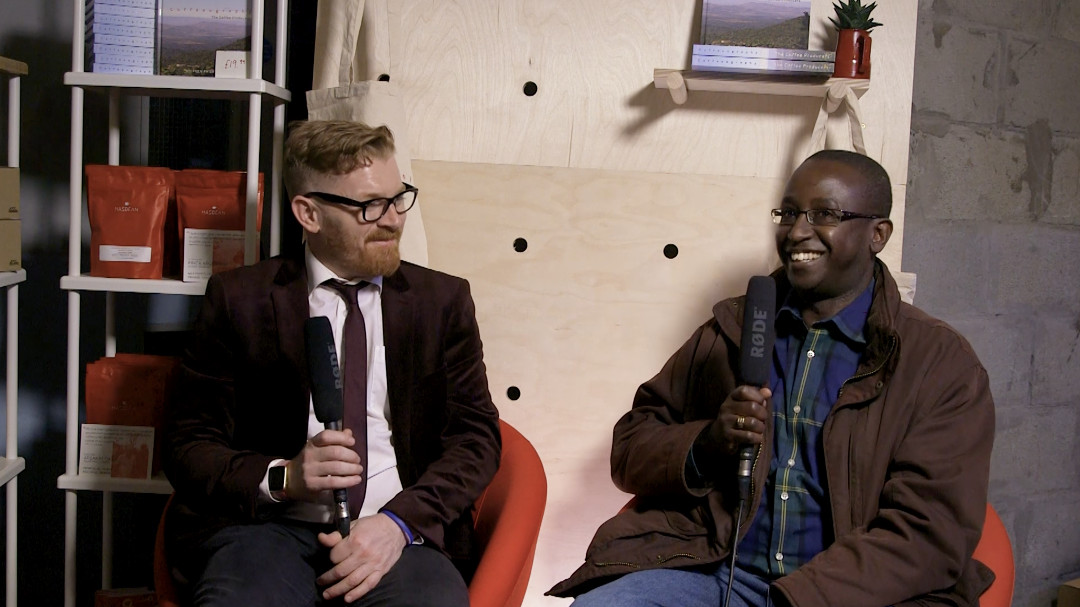
Saturday Nov 18, 2017
Episode 471 on Monday the 20th of November, 2017. Kenya Kiriga Estate AA Washed
Saturday Nov 18, 2017
Saturday Nov 18, 2017
Well hello there everyone, Uncle Steve has a story to tell you! So sit back, relax and enjoy the story of the Kiriga Estate in Kenya :)
The first coffee bush at Kiriga Estate was planted in approximately 1954 by colonial settlers. At about the same time, less than ten kilometres away along the same Kigio road, a young boy (Aloysius Gakunga, son of the chief for the larger Murang'a county) helped his father – Senior Chief Ndungíu Kagori – plant the first coffee seedling in the area. The area was known as Gaitegi village, Muranga Location 1 (Loco One). A love affair with coffee had been born!
Several years went by and the young boy grew up. He was riding his bicycle along Kigio road and, as he rode past the vast – by now well-established – coffee estates, he promised himself that he would one day own one of them.
He realized this dream in 1976.
Sadly the boy, or Mr. A. N. Gakunga, passed away in July 2014. By the time of his death, Mr. Gakunga had passed on the love of coffee, and the mantle of Kiriga coffee estate, to Dr. Brian Ndungíu Gakunga. Brian was his second child, and the eldest son out of his six children. According to Kikuyu cultural naming systems, Brian is named after Mr. Gakungaís' father, who was both his grandfather and his pioneer coffee farmer.
- Dr. Brian Gakunga is a coffee farmer who is well known in Kenyan coffee circles. He is a founding member and a former long-serving Honorary Secretary of the Kenya Coffee Producers Association, which is a national farmer's organization that works to promote the economic and social interests of the coffee farmers through active participation in the national and international arena.
- Brian is also a former Board Member and Chairman of Transitional Exchange Committee (operationally, he was the then-Chairman of Nairobi Coffee Exchange), where over 90% of all of Kenya's coffee is currently sold. He's also currently the Founding Chairman of Africa Coffee Farmers' Network.
- Africa Coffee Farmers' Network represents the interests of coffee farmers, as spelled out in the organisation's core objective of improving the earnings of poor coffee farmers in order to break the vicious cycle of poverty. One way of doing this is by getting direct sales for the farmers.
The Kiriga Estate sits between 1,550 and 1,650 metres above sea level. It is approximately five kilometres from Thika town, which is an industrial town in the central province of Kenya. It's four kilometres from Blue Posts hotel, which has the famous Chania and Thika falls. Thika lies 50 kilometres northeast of Nairobi.
Administratively, Kiriga coffee estate is in the Gatanga constituency of Muranga county, and it's separated from Kiambu county by the Chania river.
Kiriga coffee is Arabica of predominantly SL28 variety (notable for its world-renowned cup quality). The farm has an estimated two hectares of Ruiru 11 variety (which has improved resistance to coffee berry disease and leaf rust); some K7 variety (similar characteristics as SL28, but with better resistance to leaf rust compared to SL28); and a field of the newest Batian variety. About 60% of the coffee that the estate produces is AA/AB.
All coffee activities at Kiriga are carried out from the coffee nursery to all the farm operations (pruning, weed control, nutrition, irrigation, basin digging, disease control, infilling, mulching, and planting). Wet mill operations are also carried out on the factory level. Kiriga delivers both parchment coffee and Mbuni (naturals) to the commercial dry mill for milling and grading, in preparation for sale at the coffee auction and in direct sale.
In addition to growing coffee the estate also has, I was told, shoats (sheep and goats), a dairy, and the potential to keep fish. It's all about diversity, and what's more diverse than a 'shoat'?! The estate is also occasionally visited by two hippos, in addition to some bird-life, while also being the home of a family of monkeys.
Kiriga irrigated all its coffee trees – despite the crippling electricity costs involved – during the dry season that happened earlier this year, in order to ensure their high standards were maintained despite the weather.
By the end of 2015 the estate changed the cycle of its coffee trees by removing the old heads and growing new heads, which in return gave a higher yield of bold beans with the characteristic 'Kiriga coffee characteristics'. Over 40% of the 'old heads' had to go! This is way above the recommended 25%, and as a result we expect to have decreased yield but increased quality.
At Kiriga they talk about having a 'Kiriga Family'; and it's a big family that reaches up to 180 people at the busiest times of year! 30% of the total workforce is made up of resident families who live on the estate, and 50% of those know no other home. The remaining percentage consists of smallholder farmers who commute daily and depend on the estate for survival. There are smallholder farmers who have been part of the family since 1976 and have no desire to work anywhere else, commuting a whopping 10 KM (or more!) daily, past other estates, just to work at Kiriga.
Something really amazing I wanted to tell you about is the Kiriga Welfare Fund. In the past the estate saw its workers get turned away from banks when they tried to acquire loans for dealing with family issues or emergencies. To help his 'Kiriga Family', over the past year Brian has encouraged the workers to set up a welfare group with him as its patron, and Brian has provided money for loaning out to staff according to their most pressing needs.
Brian has also approached a banking institution to see whether they can fund workers to acquire dairy animals on loan and repay from the milk proceeds. Under such an arrangement, 50% of the proceeds would go towards paying for the loan. A market would be readily available and the remaining 50% would be extra income to the workers. This is ongoing and, if successful, it would have the effect of supplementing the workers' wages and greatly improving their quality of life.
Many of the estate farms around Kiriga have been sold off to make housing estates. Whilst this is a challenge for the future, in the immediate period Brian is actually finding this helpful, as there are more skilled pickers available (who were working on the other farms).
During my visit to Kenya in 2015 I was fortunate enough to spend some time chatting with Brian. I even managed to record some of it, too! Make sure to have a listen : )
Has Blog: An Interview with Brian and Peter from Kiriga (Part 1)
Has Blog: An Interview with Brian and Peter from Kiriga (Part 2)
In the cup expect a rush of blackcurrant Ribena alongside a chocolate sweetness that's perfectly balanced with a great body. The finish has a delicate black pepper spiciness that's delicate but adds plenty of interest.
- Country: Kenya
- Constituency: Gatanga
- County: Muranga
- Nearest town: Thika
- Estate: Kiriga
- Farmer: Dr. Brian Gakunga
- Altitude: 1,550–1,650 m.a.s.l.
- Varietals: SL28 AA & Ruiru 11 AA
- Processing method: Washed
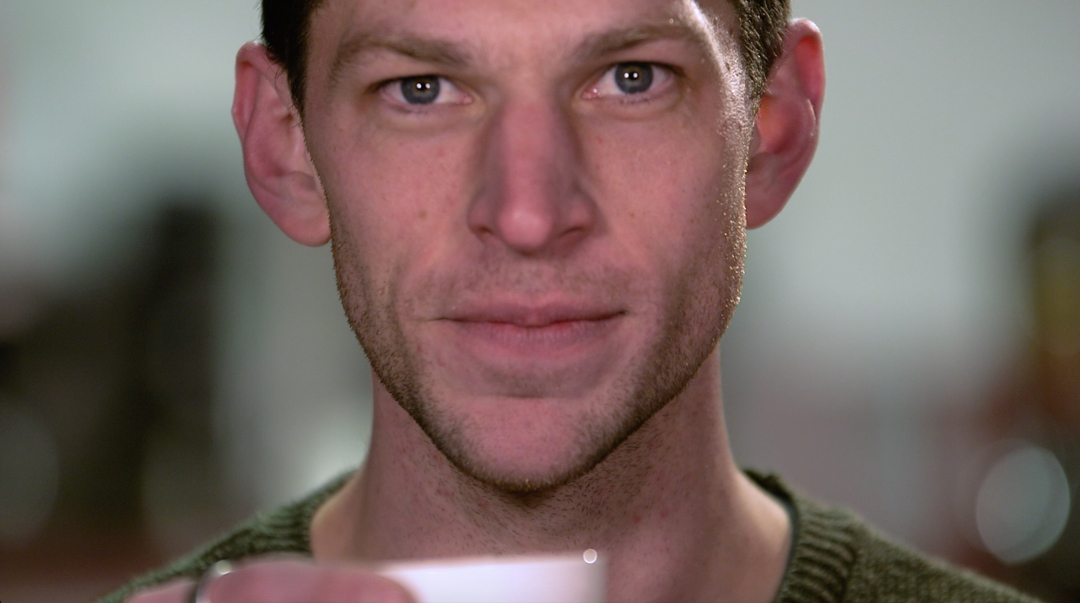
Saturday Nov 11, 2017
Saturday Nov 11, 2017
Juan Jose Ernesto 'Neto' Menéndez Argüello belongs to the fourth generation of coffee farmers in his family. His father died in 1995. After completing his studies at university, Neto had the opportunity to start working in the coffee industry at J. Hill & Cia, in 2000. He left J. Hill & Cia after five years, and began his second coffee experience at JASAL.
Both companies gave him the opportunity to meet 'Grano de Oro' from another perspective, allowing him to learn the art and passion of cupping. He says those are very important in his life, and that they give him the opportunity to apply his coffee knowledge and experience that he's gained through the years.
During his time in the coffee world, he has participated in various events like the Cup of Excellence (National Jury from 2003 to 2011), Q Auction, Q Grader, and the Star Cupper program organised by SCAA and CQI.
The farm, Las Brumas, is located between 45 to 60 minutes from Santa Ana city. It has a cultivated area of 60 hectares' worth of coffee yield, all of which is at an altitude ranging from 1,450 to 1,700 m.a.s.l. It produces around 600 bags of coffee each year, and has an area of 35 hectares of virgin mountain at an altitude from 1,700 to 2,000 m.a.s.l.
The farm is located in the Sonsonate department near the area known as San Blas. Las Brumas has very rich volcanic soil, deep and very fertile, which has been generated by different Ilamatepec and Izalco volcanic eruptions throughout its history.
One of the most important elements is the micro climate. It's very misty at the farm for most of the year, and that's why Neto decided to name the farm Finca Las Brumas. This amazing micro climate is generated when the warm air from the Pacific ocean collides with the high peaks of the Volcanoes Park (which comprises of the Santa Ana, Cerro Verde and Izalco volcanoes).
Due to its location between these three famous volcanoes in El Salvador, this unique micro climate reduces the amount of daylight that the coffee trees receive. This helps the coffee trees have a very slow photosynthesis, improving the maturation process, and this in turn improves some attributes that are closely related to maturity, like the aroma, sweetness, acidity and flavour.
In the cup this starts of as a regular El Salvadorian coffee. But it’s only as it develops and you get red wine, a big body and an orange juice like acidity that’s fresh and juicy.
- Country: El Salvador
- Department: Sonsonate
- Nearest city: Santa Ana
- Farm: Finca Las Brumas
- Farmer: Juan Jose Ernesto 'Neto' Menéndez Argüello
- Altitude: 1,450–1,700 m.a.s.l. / 1,700–2,000 m.a.s.l.
- Variety: SL 28
- Processing system: Washed
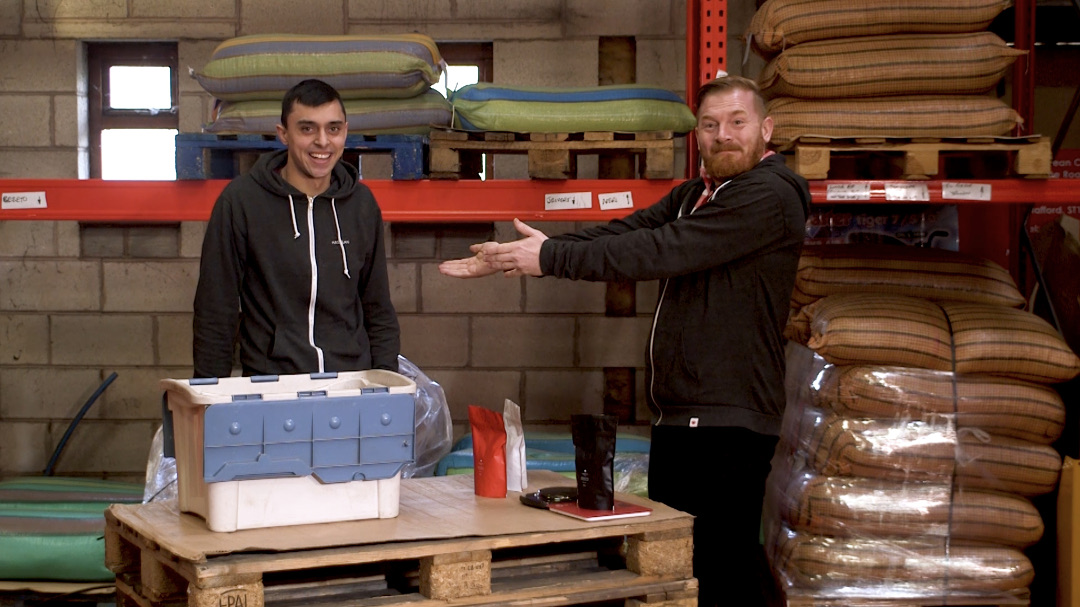
Saturday Nov 04, 2017
Saturday Nov 04, 2017
Finca La Escondida is close to Lake Apanas near the city of Jinotega, which is the capital of the department of Jinotega in the north-central region of Nicaragua. The straight translation from Spanish to English of 'escondida' is ‘hidden’. Escondida is called 'Escondida' because the farm is 'hidden' from the road by forest and trees, which makes it appear to blend right into the side of the mountain.
La Escondida is a rather young farm as coffee farms go, because the first trees were planted there only ten years ago – in 2006. La Escondida is planned around identifying the plots with individually different micro-environments resulting from factors such as soil quality, sun exposure and temperature range. This is one of the upsides of starting to plant a new farm.
This is the varietal Catuai, which you don't see so much in specialty coffee. The varietal was selected for this farm as it was thought it would do very well with the identified soil quality, sun exposure, temperature range, and weather conditions in particular, given the farm's quite exposed on the side of the mountain.
Catuai is related to Yellow Caturra and Mundo Novo and is a hybrid that grows best above 800 metres. It is mostly prevalent in Brazil and Central / South America. This is a dwarf variety of plant; it doesn't grow very high, and this is its most obvious distinguishing trait. Selected by the Instituto Agronomico in the 1950s, it now accounts for 50% of the coffee acreage in Brazil and is widely used in Central America. It also benefits from the fruit not falling off the branch easily, which helps when there are strong winds or rain, or where wind breaker coverage is at a minimum, like it is here.
Some of the downsides of starting a brand new farm can be that it may take a while for the quality of the cup profile to build up; it might take time to have the right facilities for processing and picking; and it might take time to train the staff for picking and processing. Not to mention that it might take a while to achieve the yield to go with it all. But this farm, for me, has hit the whole group of requirements running. As a result of their experience in the area, the Mierisch family have built a new mill with a huge investment, and they use some of the people already in place in the neighbouring 'San Jose' to blend together an Escondida team comprising of experienced and new members.
In the cup you can expect a very sweetness-driven coffee with a big juicy citrus acidity – think green Starburst sweets and lemon. If you don't believe me about the Starburst thing, try one with the coffee!
- Country: Nicaragua
- Municipality: Lipululo
- Department: Jinotega
- Farm: La Escondida
- Farm manager: Boanerje Martinez Montenegro
- Coffee growing area: 92 manzanas
- Elevation: 975–1,230 m.a.s.l.
- Harvest months: December–March
- Diurnal temperature cycle: average: high 27C, low 16 C
- Varietal: Catuai
- Fermentation: Yes
- Fermentation method: Dry
- Processing method: Washed
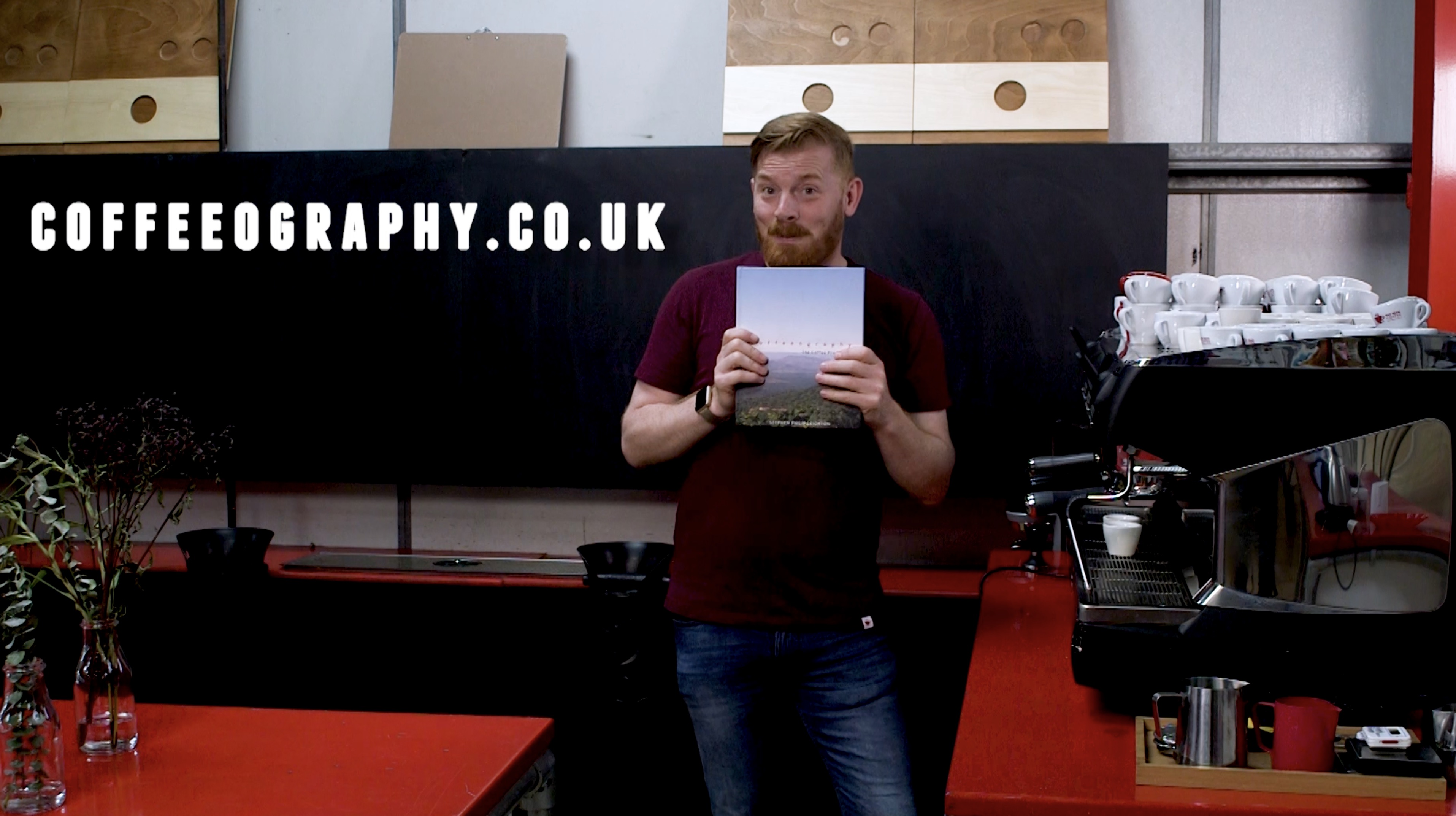
Saturday Oct 28, 2017
Episode 468 on Monday the 30th of October, 2017. Ethiopia Ana Sora Guji Natural
Saturday Oct 28, 2017
Saturday Oct 28, 2017
This is the second year of us having coffee from Ana Sora and has become something very beautiful. This coffee represents lots of time and energy working at the farmers gate in Ethiopia; not only that, but the coffee is the only private estate from which we have ever bought in Ethiopia. Add to these points the fact that it's one of the most unique coffees I have ever tasted, and you can understand why I’m excited.
This private farm is owned by Israel Degfa, a second generation coffee grower from Ethiopia. The farm covers 250 hectares, only 150 of which are currently producing coffee; however, it is estimated that the remaining 100 hectares will be in full coffee production by 2018.
Situated alongside the river Turo, the farm currently only produces natural process coffee. However, in future the farmers will take advantage of the water source and the planned increased production capacity to begin producing coffee processed by the "washed process" method. Israel plans to build a processing station on his land by 2018.
It's a brand new farm, only formed in 2013, and it's located at a whopping altitude of between 1,900 and 2,350 metres above sea level. It is unusual to find private farms of 250 hectares in Ethiopia, and even more unusual to find them at such high altitude. The high altitude helps with the slower maturation of the coffee cherry, and gives more time for the plant to develop.
Coffee growing is popular in this area, and Israel also sources coffee from the surrounding area populated by smallholder farmers who speak Oromife and are of Oromo ethnicity. Israel believes in helping these farmers through education in husbandry and also through financial assistance.
Cherries are hand-sorted for unripes and overripes before they go into floatation tanks, where the cherries are covered with water. Any cherries that float are removed. Whole, ripe cherries are then dried in the sunshine on raised African drying beds, which are laid out on hessian cloths for about 15–18 days depending on the weather conditions. The cherries are covered with plastic or shade nets during the midday heat and at night.
This is a unique coffee, certainly for its cup profile but also because of the cherries that contribute to the coffee.
In the cup expect an amazing Ethiopian natural that's so very similar to the Parma Violet sweets I loved as a child, while also being one of the cleanest naturals I’ve ever tasted. Blueberry juice! It's so floral that it's bigger than the biggest bouquet of violets I can imagine. This is a truly special and unique cup from a special and unique coffee bean.
- Country: Ethiopia
- Area: Guji zone
- Nearest town: Yirgacheffe
- Farm: Ana Sora
- Varietal: Indigenous wild varietals
- Processing: Natural
- Owner: Israel Defga
- Founding year: 2013
- Altitude: 1,900 – 2,350 m.a.s.l.
- Producer type: Estate
- Farm size: 250 hectares, of which 150 hectares are coffee.
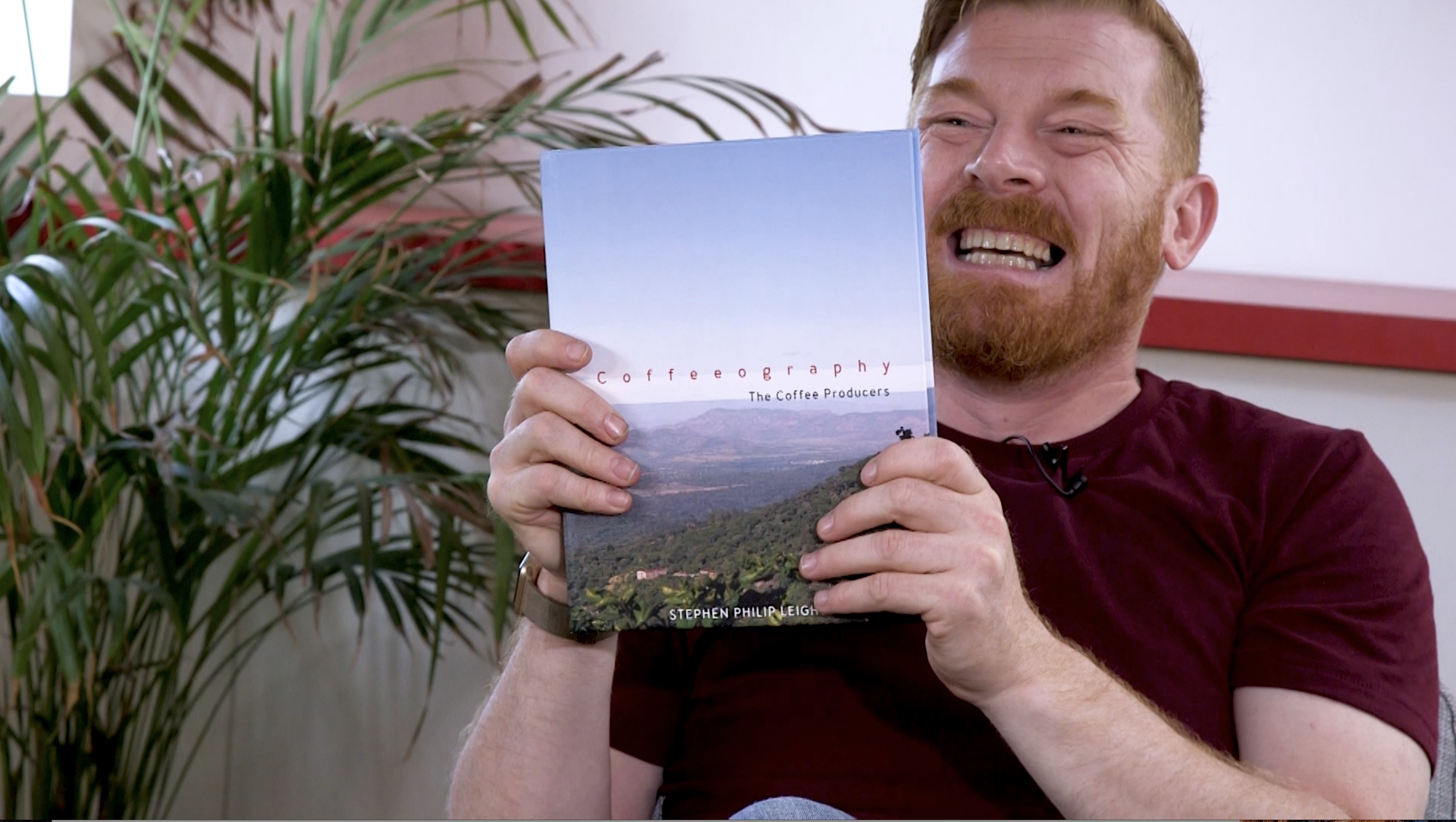
Saturday Oct 21, 2017
Saturday Oct 21, 2017
I've been working with Alejandro since 2008 and in that time our relationship has gone from strictly professional to Ale being one of my closest friends. He became involved in coffee in 2008 as he had just relocated to El Salvador from New York where he'd been working as a city banker. With his first son on the way and the hustle and bustle of New York no place to bring up a family the draw of home and El Salvador was just far too strong to ignore.
While looking for work in El Salvador, Ale decided to help his father with some of his business interests and investments. His father had inherited several coffee farms from his grandfather and was unsure what to do with them, one of the investments pricked Ale’s intent and this was a farm called Finca Argentina. The reason it really got Ale's attention was that he saw the farm once yielded loads of coffee but was producing a fraction of its old productivity. His father gave him permission to see what could be done to make the farm successful again
Ale found out the farm had been classified for a Q auction back in 2005. Thinking there may be a specialty buyer out there he and his cousin (who lived in London) went about sending samples to coffee roasters anywhere they could. 1 of those samples arrived at Hasbean Towers just like a lot of other samples do, but unusually I liked the coffee and the rest, as they say, is history.
Since then Finca Argentina has gone from strength to strength but not without bumps in the road. In 2013 they suffered the worst harvest on record, with only 70 bags harvested due to a massive issue with leaf rust. But with investment and hard work they have also bought a neighbouring farm and the future is amazingly bright for Ale, his father, his family and Finca Argentina.
The farm is based in the Apaneca-Ilamtepec mountain range, and is near the town of Turin in the Ahuachapán department. Sixteen people work on the farm during the non-picking season, maintaining and tending to the plants. This number of workers goes up to 50 people during the picking period. The altitude of the farm is 1,300 m.a.s.l.
This coffee is a washed process Catimor which I know some of you might raise an eyebrow at as the Catimor varietal can be a little on the controversial side. Catimor is a cross between Timor coffee (resistant to leaf rust – a big problem at the moment in Central America) and Caturra coffee. It was created in Portugal of all places, in 1959.
Catimor grows and produces fruit very quickly and has a very high yield. It's pest resistant and leaf rust resistant, and it will grow well at much lower altitudes – better, in fact, in comparison to many other commercial varietals. Sounds perfect, but problems come in the cup quality. Timor has its feet in the Robusta species (hence all these lovely benefits), but Robusta is not known for being tasty.
Luckily for us, this is one of the finest examples I have seen of this varietal, and it came about because of Alejandro wanting to experiment and try different varietals on different parts of the farm. One of the experiments involved Catimor. It's only a very small lot but it's a great example of tasting a coffee with your taste buds and not with what you think it might taste like. This coffee made me change my opinion of this varietal.
In the cup it starts off as a typical El Salvadorian coffee...sweet milk chocolate, a balanced acidity that reminds me of white grape, and oh so smooth. But then it takes a right turn and develops a black pepper taste that I never find in a coffee from El Salvador, except right here in this delicious Catimor.
- Country: El Salvador
- District: Ahuachapán
- Municipality: Ahuachapán
- Nearest city: Turin
- Farm: Finca Argentina
- Owner: Alejandro Martinez
- Altitude: 1,300 m.a.s.l.
- Varietal: Catimor
- Processing method: Washed
- Drying method: Patios
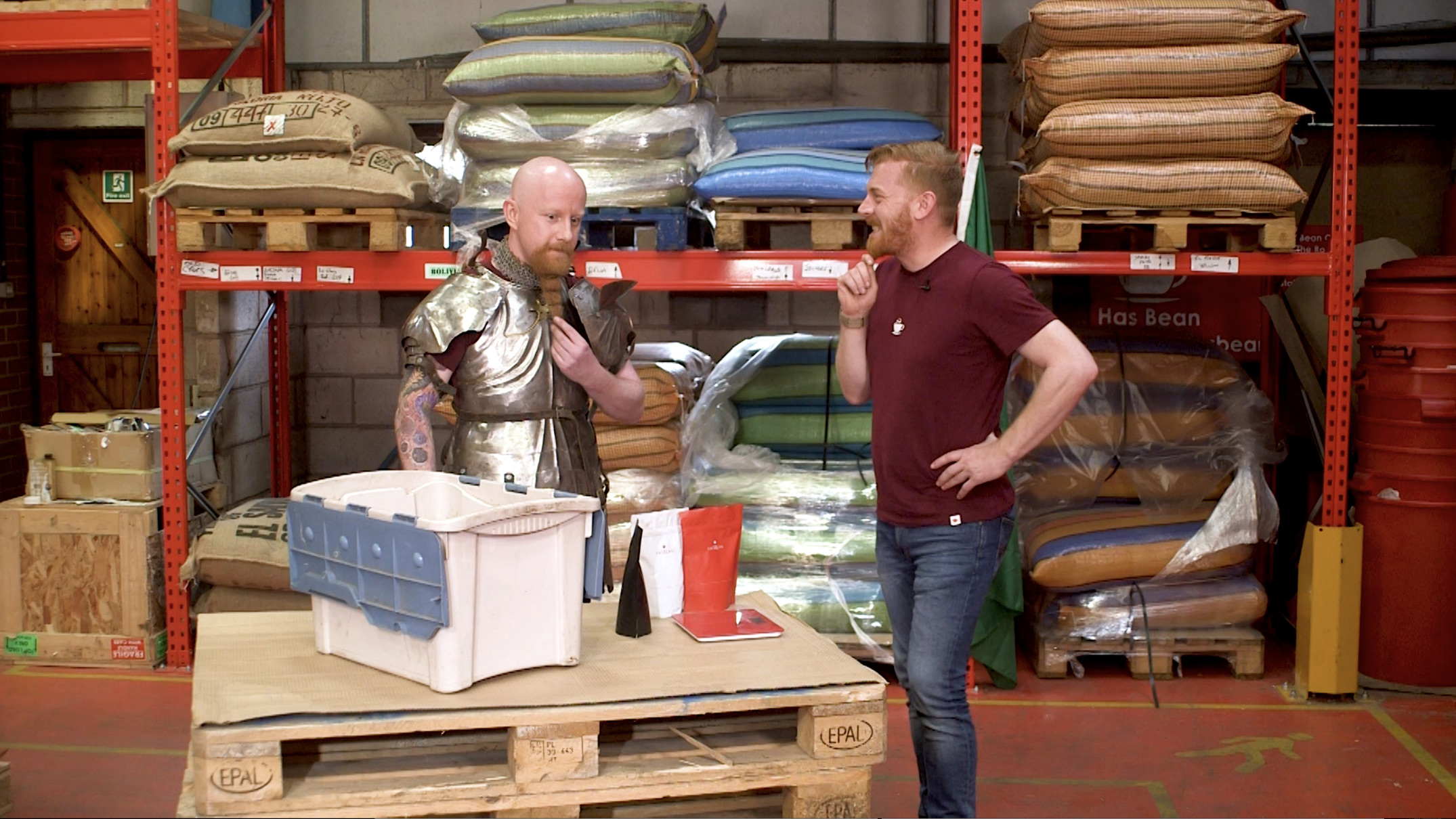
Saturday Oct 14, 2017
Episode 466 on Monday the 16th of October, 2017. Kenya Karogoto Washed AB
Saturday Oct 14, 2017
Saturday Oct 14, 2017
Quite close to Kieni near the town of Karatina in Nyeri is the Karogoto wet mill, it's owned by the Tekangu Coffee Farmers Cooperative Society which got its name from combining the names of their 3 mills: Tegu, Karogoto and Ngunguru. Much like Kieni it has seen success in recent years and has secured high prices for farmers delivering their coffee cherries there.
The mill is split in half by a road, with the sorting shed and fermentation tanks on the lower side and the drying beds on the upper slope of the hill. Both sides are pretty steep, with a great view of the valley and weaver birds making their homes in the trees around the mill.
The mill is managed by Ephraim Maina Muthee, who showed us around and with whom Steve planted a coffee plant on the slope just below the sorting shed.
In the cup this coffee is a classic Kenyan, but not in the blackcurrant way. This has heaps of clean red wine notes with cherry, and coffee blossom with a chocolate like sweetness and finishes with jasmine notes.
- Country: Kenya
- County: Nyeri
- Nearest town: Karatina
- Mill: Karagoto
- Owners: Tekangu Coffee Farmers Cooperative Society
- Contributing farmers: 1,700+
- Altitude: 1,700 m.a.s.l.
- Varietal: SL28 & SL34
- Processing method: Washed
- Average rainfall: 1,500 mm
- Temperature range: 12-27°C
- Soil type: Well drained red volcanic soil rich in phosphorus
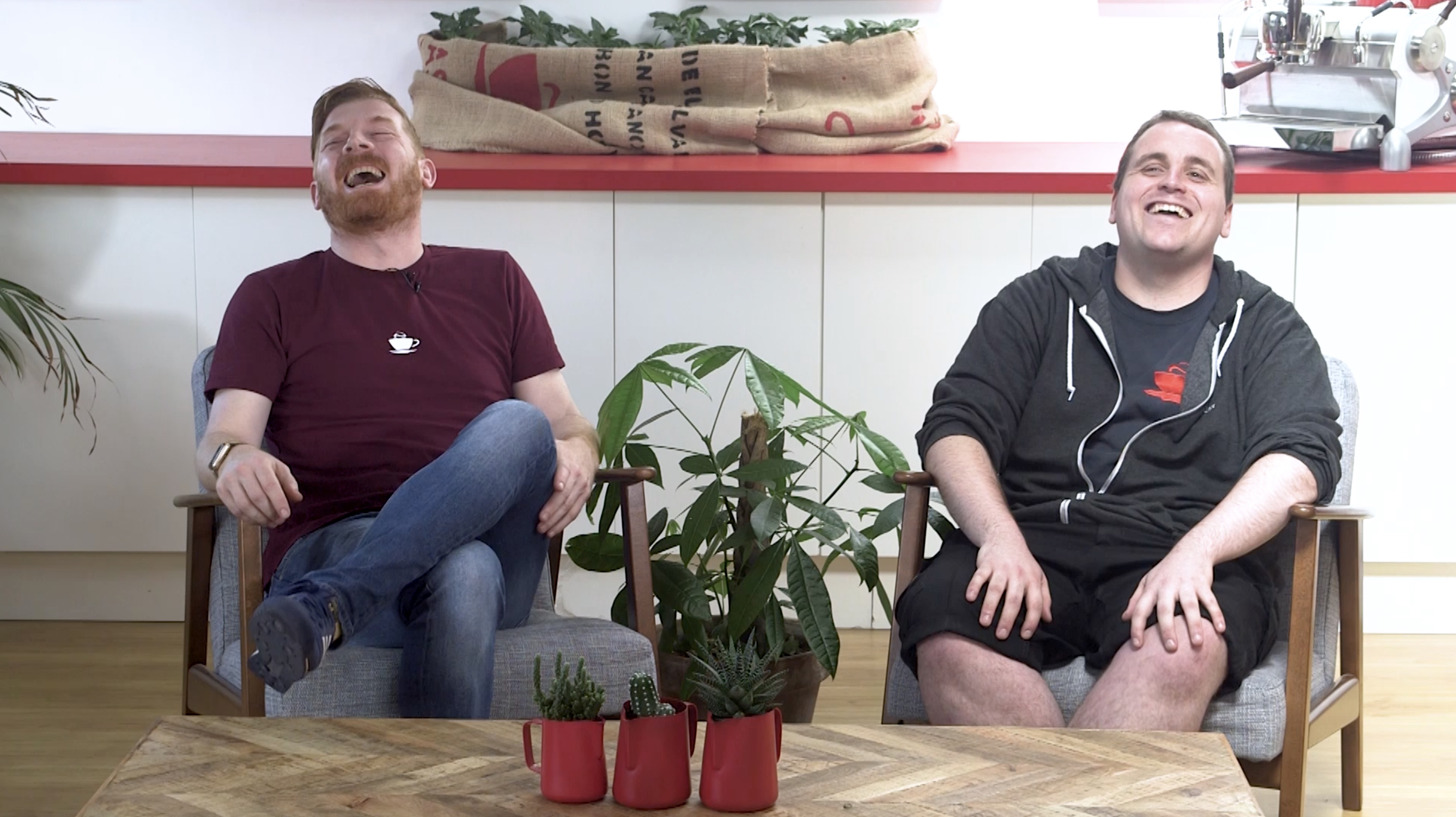
Saturday Oct 07, 2017
Saturday Oct 07, 2017
The Burka Coffee Estate is located on the outskirts of Arusha national park. It's on the leeward side of Mount Meru, which is just 80 kilometres west of Mount Kilimanjaro – Africa’s highest peak.
Selian was established in 1910 and was acquired by Burka in 1991 (thus the Burka/Selian in the coffee's name). The owners of the combined estate can now boast of growing coffee since 1899, which is when Burka was planted – rather impressive, don't you think?! The Selian estate covers 1,210 acres, of which 753 acres produce coffee.
The Burka and Selian estates have about 200 permanent staff as well as 200 daily causal staff; however, in the peak of the harvest season, there can be up to 5,000 staff involved in picking and processing. All permanent staff are provided with housing on the estates (in four different camps), and the minimum salary is set at 20% above the government minimum requirement. Staff have social security and labour union membership included in their contracts, and an estate credit union also offers loans and advice for education, health, and house construction.
Each estate has its own nursery which educates over 100 children, and two primary schools also cater for over 600 children, who come from the estate workers' families and the neighbouring communities. An on-site health centre with estate nurse and dispensary is available to meet the needs of all staff, and the estate has its own ambulance. It also has shops, sport facilities, churches, and a mosque.
Regular inter-estate and inter-camp football and netball matches occur, along with staff BBQs and other holiday celebrations. Workers are supplied with free firewood from stumped coffee trees, and fruit and nut trees are grown around the staff villages.
The harvest is carried out between the months of May to October through selective hand-picking of red ripe cherries, followed by further hand-sorting to remove any over- or under-ripe cherries. Cherries are then dried slowly on raised African beds for 12–14 days. The cherries are carefully maintained through consistent turning to ensure even drying and avoid over-fermentation. They are covered at night to protect them from excess rain and moisture.
Once the cherries have dried to the optimum moisture content, they are sent to Moshi for hulling, grading by bean size, and careful hand-picking. Finally, the coffee is bagged in GrainPro for export from the port and capital city of Dar Es Salaam.
In the cup this is a totally unique coffee. Expect bruised strawberries covered in rich dark chocolate and sprinkled in white sugar, with a boozy cherry aftertaste.
- Country: Tanzania
- Region: Arusha
- District: Arumeru
- Estate: Burka/Selian
- Estate size: 343 hectares
- Varietals: Kent, N39, Blue Mountain and Catimor
- Processing method: Natural
- Drying method: Raised African beds
- Drying time: 12–14 days
- Altitude: 1,350 m.a.s.l.
- Soil: Young alluvial, sandy to clay loam
- Average annual rainfall: 750 mm
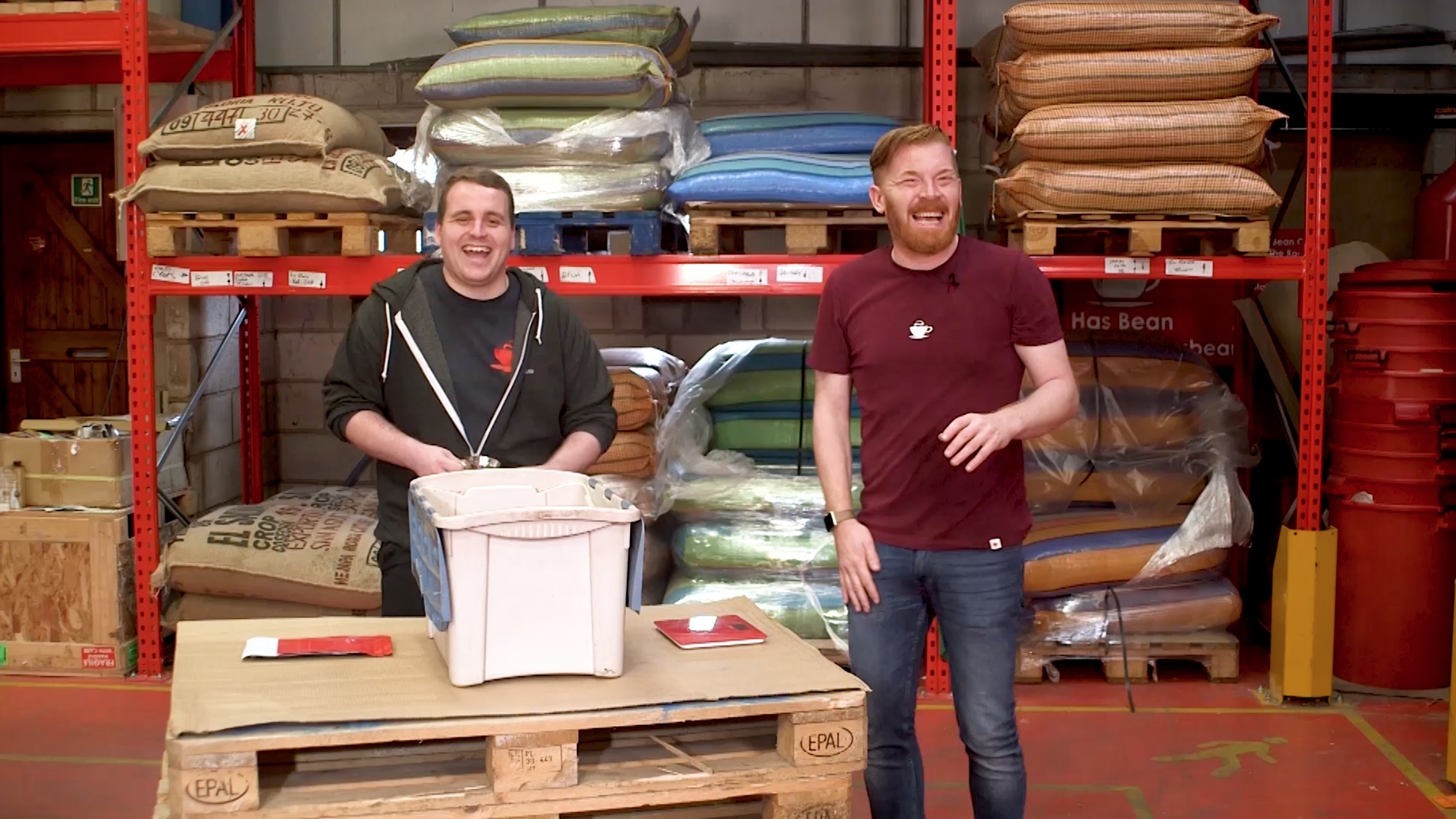
Saturday Sep 30, 2017
Saturday Sep 30, 2017
The story of Hasbean and Finca Limoncillo has been told many many times, but it's one that I really love to share. So much of where we are today has come from this relationship, and I'm super proud of everything that's happened in the past, as well as amazingly excited for where we can go in the future.
My relationship with Finca Limoncillo began in 2007, and back then we were buying their delicious coffee as part of a buying group. I loved it from the very first time I cupped it, and it was a coffee I just had to get. It was only after the auction closed that I discovered it was owned by a family in Nicaragua who were already good friends of mine, and indeed probably the only people I know from the whole country!
The following year I visited the farm with our importers and spent the whole trip begging them to bring the coffee in for us. Eventually, they caved in (possibly just to stop me pestering them!) and kindly did so.
This setup worked well for a time, but we received notice a couple of years ago that the importers were not going to be buying the coffee again (and for reasons other than the cup quality). This led to some frantic phone calls and a thorough search down the back of the sofa for loose change to fund buying twelve months’ worth of coffee all at once. There were many, many obstacles in the way of doing this deal, but we were lucky in that we were able to pull everything together in a very short amount of time.
The upside of all of this is that we now work directly with Finca Limoncillo instead of going via anyone else, and this is a relationship I’m super happy to have. This coffee has gone from a one-off Cup of Excellence buy to a fantastic long-term relationship.
Finca Limoncillo is located in Matagalpa and, at 171 hectares, it. is. huge! Situated at an amazing location, it boasts 9 waterfalls within the farm and is owned by the Mierisch family; as I have already said, they’re good friends, and also well-respected producers in Nicaragua. They’re known for their experimental processing, varietal work, and exceptional coffee.
The fact that the family are friends helps us drill down into the details of what they do for the people who work for them, and the information continues to prove to me that good people grow good coffee.
On the farm, the family:
- Pay their staff 30% more than what is typical minimum wage.
- Provide free housing for 60 families.
- Provide free electricity and running water for their workers' homes.
- Provide free food for all workers.
- Provide free daycare facilities for families to use.
- Provide free healthcare facilities.
- Employ on-site teachers who educate the staff and teach other skills, such as pottery and weaving. The goal is to help staff diversify their skills. The teachers are also paid twice the wages they would receive in the cities.
The coffees we receive from Limoncillo are fantastic and they come from a fantastic relationship. Erwin Mierisch has visited Stafford many times, and it's always a pleasure to have him around. Last time he was over he ended up at a Weird Beard tap takeover in Manchester, talking to two Weird Beards about crazy brewing / coffee farming ideas! A coffee from Finca Limoncillo (the 'Funky Red Pacamara') is used in two of Weird Beard's beers: Black Perle and Double Perle, both of which are mighty delicious beers!
In the cup this coffee makes me think of a toffee apple. On the front end there’s juicy green apple, which turns into sticky sweet toffee and caramel with a hint of white grape.
- Country: Nicaragua
- Municipality: Yasica Norte
- Region: Matagalpa
- Farm name: Limoncillo
- Farmer: Dr Erwin Mierisch
- Farm size: 171 manzanas (hectares)
- Coffee growing area: 109 hectares
- Harvest months: December–February
- Altitude: 1,200 m.a.s.l.
- Varietal: Caturra
- Processing method: Washed
- Diurnal temperature cycle: average high: 28 C; average low: 20 C
- GPS coordinates: N13 2.9569 W85 49.9756
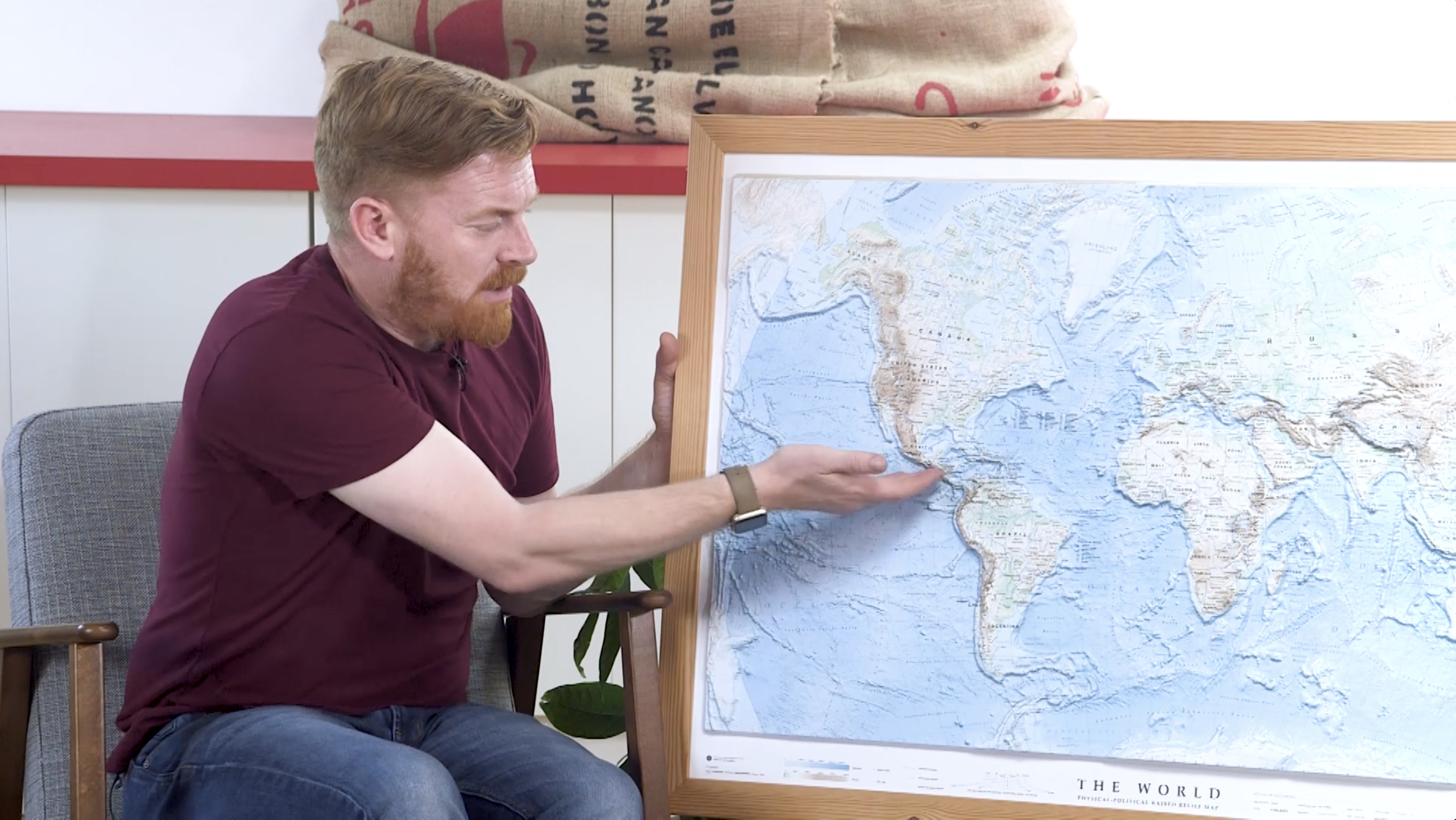
Saturday Sep 23, 2017
Saturday Sep 23, 2017
An old favourite returns, a big favourite returns, one I hope you're as happy as me to see, hello Licho!
I first bought coffee from Finca Licho from a Cup of Excellence auction many, many years ago in 2007, where it finished 4th. This year we welcome Licho back for the ninth time and I'm super proud as always to be able to roast it for you lovely lot : )
Licho is a coffee that I feel shows our development as a roaster over the years. First we bought this coffee in the Cup of Excellence program (a great way to meet a grower), then we bought it from an import broker; they helped us bring in this coffee because we are a small coffee buyer. Then we bought directly from them. Then, three years ago, I went out to the farm and did the deal on the farm with the brothers. I love the fact that last year I walked onto the farm after cupping a particular lot in the exporter's office, asked how much they wanted, and there was a short conference. They came back and told me, then we shook hands. Then we got back into the 4x4 and drove away. That year we agreed a European-exclusive deal with them for this coffee, and this year we continue the close work we have been doing with them.
Grown by the Aguilera brothers in the province of Naranjo, in the volcanic Northern Cordiles corridor of the Western Valley, this coffee is cultivated at an altitude of 1,500 metres above sea level. Most of their coffee is of the Villa Sarchi variety, native to the area and excellent in the cup. Villa Sarchi is a Bourbon mutation (similar to Caturra and Pacas) found originally in Naranjo, West Valley. It is a dwarf variety with short internodes and usually higher-yielding production. There is also a little Caturra (around 30%) in this lot.
This coffee is honey processed, which is like the pulped natural method, so the fruit is removed from the seed of the coffee bush and left to dry. The main difference is that there is no water involved when the cherry is removed, so mucilage sticks to the bean. This can be dangerous, but it's necessary in these parts of Costa Rica where water is limited: in this area of Naranjo water is a precious commodity, so this method suits the location very well.
The coffee ends up clustering whilst drying because there is so much mucilage. So the coffee either needs to be turned regularly to stop this happening, or it has to be broken up. Over-fermentation can happen at this stage and you can end up with a not-so-good cup, but the Aguilera brothers are well-versed in this method and are some of the most skilled in Costa Rica.
Want to know a little more about honey processing? Here's a video you might enjoy!
The Aguileras are 12 brothers and sisters, all of whom are involved in coffee as inherited from their parents. The brothers work the mill and farms themselves with basically no hired labor, other than pickers during the harvest. With the help of the third generation, they work the mill and drying patios, prune the coffee fields, fertilize, etc, year-round. The Aguilera Bros understand quality at the farm and mill level, and this is why we are excited about working with them.
Coffee has been cultivated in Costa Rica since 1779. Currently, the regions producing the best quality are Tarrazu, West Valley, and Central Valley. Coffee production has been threatened the past decade due to a real-estate boom converting coffee-lands into prime development properties. San Jose, the capital, is right in the heart of Central Valley, where you will find private houses next to coffee farms. The value of these farms have now skyrocketed.
In the cup this coffee is as delicious as ever and you can see why it's become one of our most popular coffees year after year. On the front-end there's raspberry and golden sugar, then the sweetness kicks in alongside dark chocolate before finishing with cherry on the aftertaste.
- Country: Costa Rica
- Region: Western Valley
- Province: Alajuela
- Nearest city: Naranjo de Alajuela
- Farm: Finca Licho
- Producers: Aguilera Family
- Farm Size: 28.00 Hectares
- Coffee growing area: 9.10 Hectares
- Altitude: 1,500 m.a.s.l.
- Varietal: 70% Villa Sarchí & 30% Caturra
- Processing System: Yellow Honey
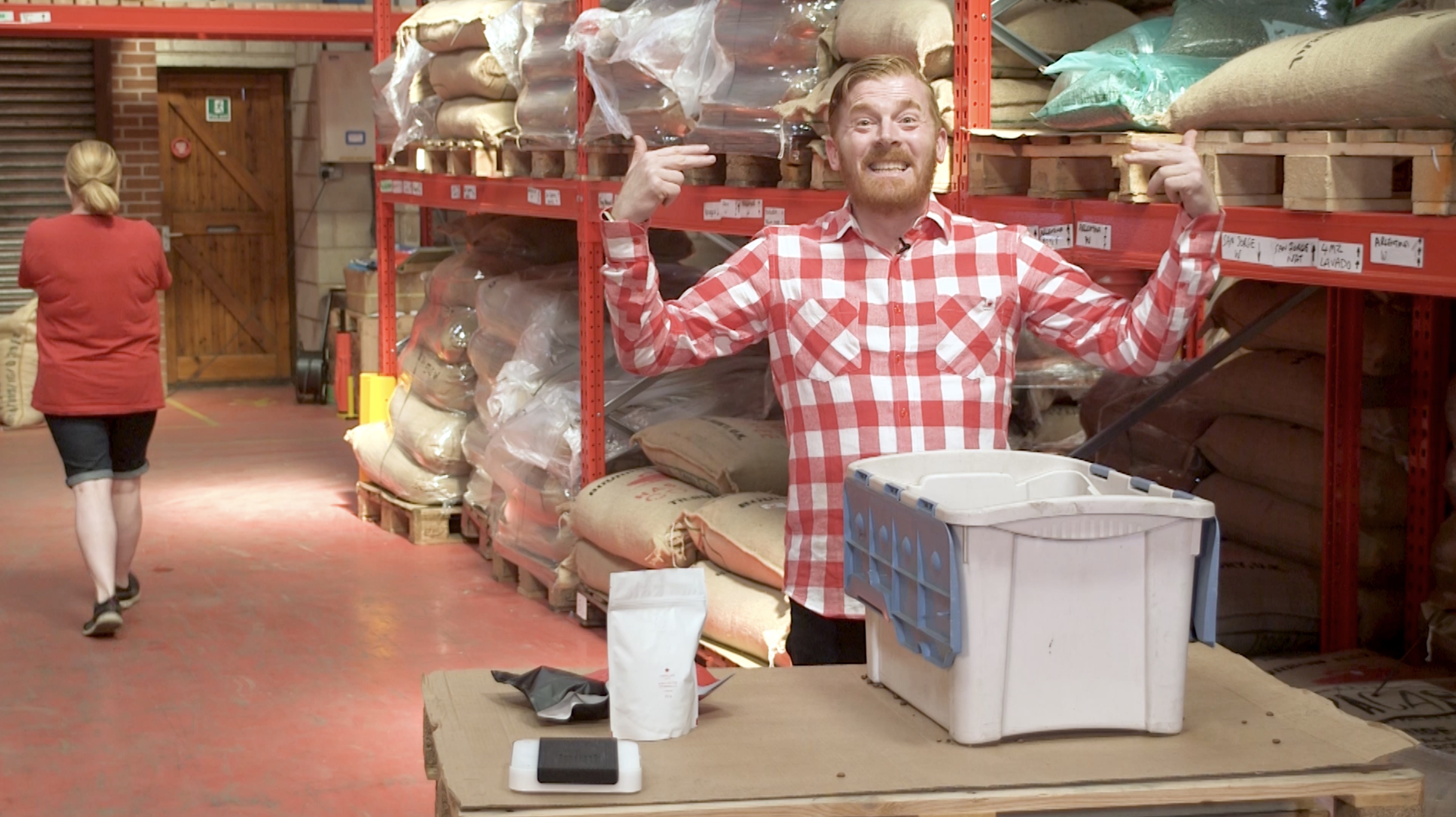
Saturday Sep 16, 2017
Saturday Sep 16, 2017
The story of Hasbean and Finca Limoncillo has been told many many times, but it's one that I really love to share. So much of where we are today has come from this relationship, and I'm super proud of everything that's happened in the past, as well as amazingly excited for where we can go in the future.
My relationship with Finca Limoncillo began in 2007, and back then we were buying their delicious coffee as part of a buying group. I loved it from the very first time I cupped it, and it was a coffee I just had to get. It was only after the auction closed that I discovered it was owned by a family in Nicaragua who were already good friends of mine, and indeed probably the only people I know from the whole country!
The following year I visited the farm with our importers and spent the whole trip begging them to bring the coffee in for us. Eventually, they caved in (possibly just to stop me pestering them!) and kindly did so.
This setup worked well for a time, but we received notice a couple of years ago that the importers were not going to be buying the coffee again (and for reasons other than the cup quality). This led to some frantic phone calls and a thorough search down the back of the sofa for loose change to fund buying twelve months’ worth of coffee all at once. There were many, many obstacles in the way of doing this deal, but we were lucky in that we were able to pull everything together in a very short amount of time.
The upside of all of this is that we now work directly with Finca Limoncillo instead of going via anyone else, and this is a relationship I’m super happy to have. This coffee has gone from a one-off Cup of Excellence buy to a fantastic long-term relationship.
Finca Limoncillo is located in Matagalpa and, at 171 hectares, it. is. huge! Situated at an amazing location, it boasts 9 waterfalls within the farm and is owned by the Mierisch family; as I have already said, they’re good friends, and also well-respected producers in Nicaragua. They’re known for their experimental processing, varietal work, and exceptional coffee.
The fact that the family are friends helps us drill down into the details of what they do for the people who work for them, and the information continues to prove to me that good people grow good coffee.
On the farm, the family:
- Pay their staff 30% more than what is typical minimum wage.
- Provide free housing for 60 families.
- Provide free electricity and running water for their workers' homes.
- Provide free food for all workers.
- Provide free daycare facilities for families to use.
- Provide free healthcare facilities.
- Employ on-site teachers who educate the staff and teach other skills, such as pottery and weaving. The goal is to help staff diversify their skills. The teachers are also paid twice the wages they would receive in the cities.
The coffees we receive from Limoncillo are fantastic and they come from a fantastic relationship. Erwin Mierisch has visited Stafford many times, and it's always a pleasure to have him around. Last time he was over he ended up at a Weird Beard tap takeover in Manchester, talking to two Weird Beards about crazy brewing / coffee farming ideas! A coffee from Finca Limoncillo (the 'Funky Red Pacamara') is used in two of Weird Beard's beers: Black Perle and Double Perle, both of which are mighty delicious beers!
This is a Pacamara varietal coffee. Pacamaras are a little crazy on the cupping table. Pacamaras are exciting. I like Pacamaras! Could ramble on about Pacamaras for a while, oh wait a minute, I did! If you'd like to know more about this fantastic varietal make sure to have a look at the article I wrote...
So why the 'elegant' part of the name? Well, when I visited the farm and Erwin presented the samples, he gave me this coffee...I couldn't get any other word but 'elegant' to describe it, but it's just so different to last year's crazy offering.
They told me that this year they had a policy of turning the coffee more often, apart from one lot (see the other natural 'funky' Red Pacamara we're offering), but this cup was quite different. It's a unique Pacamara and may be the shape of things to come with better and better processing.
This coffee was described by one of our roasters (Gary) as Wimbledon coffee! In the cup it's super clean, full of creamy fresh strawberries alongside a hint of yoghurt.
- Country: Nicaragua
- Municipality: Yasica Norte
- Region: Matagalpa
- Farm Name: Limoncillo
- Farmer: Dr. Erwin Mierisch
- Farm Size: 171 Hectares
- Coffee growing area: 109 Hectares
- Harvest Months: December - February
- Diurnal Temperature Cycle: Avg High 28°C, Low 20°C
- Altitude: 1,200 m.a.s.l.
- Varietal: Red Pacamara
- Processing System: Delicate natural process and sun dried
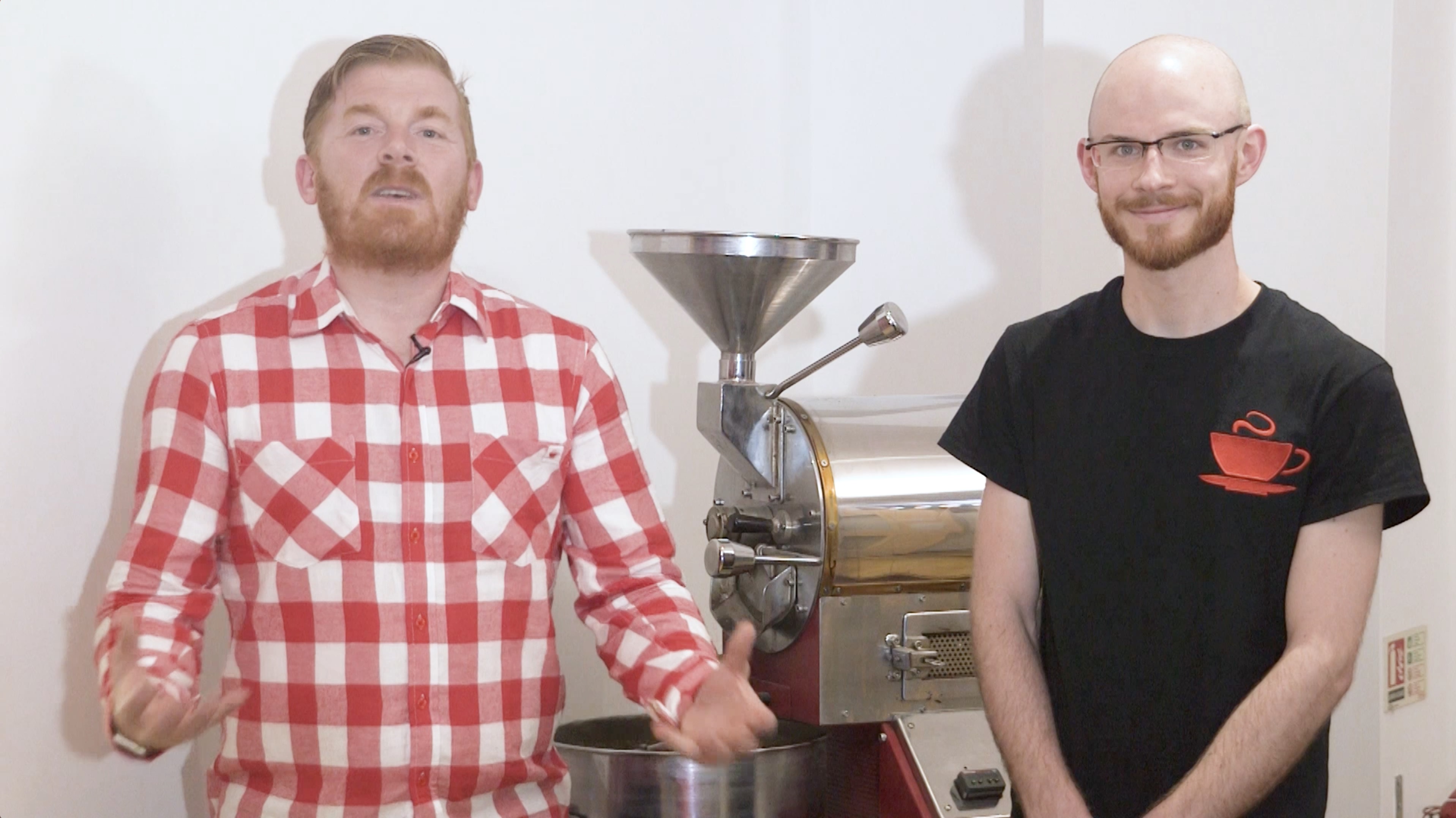
Saturday Sep 09, 2017
Saturday Sep 09, 2017
Finca La Fany has been producing coffee in El Salvador since 1870, and has belonged to the same family from generation to generation. Situated on the Santa Ana volcano, the farm provides work for 24 families in the community. It's in a biological corridor that stretches for 27 hectares from Mexico to Panama, and it's full of 100% Bourbon coffees.
Nearly 70% of El Salvador’s total coffee production is Bourbon, which is one of the most desired coffee varietals. It is harder to grow, is more susceptible to disease and provides a lower yield than some other varietals, but it also produces some of the finest coffee in the world. I love El Salvador for this dedication to producing awesome speciality coffee, and I think this is one of its finest coffees. I think it's fantastic!
I first worked with this farm in 2004 when Hasbean was roasting coffee in the back of my garage at home, and this was one of the first relationship coffees we were able to buy. Since then it's gone from strength to strength.
I was lucky enough to visit Rafael and Carmen, the owners of Finca La Fany, during visits to El Salvador in 2008 (May), 2012, 2013 and 2014 (January). Visiting them has become one of the highlights of my trips, because not only do I get to visit some of my favourite farms in the world, but I get to spend some amazing time with my very special friends who have become very close and dear to me.
This shade-grown coffee gets better and better each year, because Carmen and Rafael keep investing in milling their own coffee and improving the facilities they have. You can really taste this in the cup; this is one of my all-time favourites, and it's one of the coffees that I would be devastated to lose if we were unable to get it.
In the cup you'll find a very clean and sweet coffee. The sweetness reminds me of light syrup mixed up with honeycomb and apricot. On the finish there's a subtle but delicious edge of lime zest.
- Country: El Salvador
- Region: Apaneca
- City: Ahuachapan
- Farm: La Fany
- Farmer: Carmen and Rafael Da Silva
- Farm size: 20.30 hectares
- Coffee growing area: 20.30 hectares
- Altitude: 1,450 m.a.s.l.
- Varietal: Bourbon
- Processing system: Washed
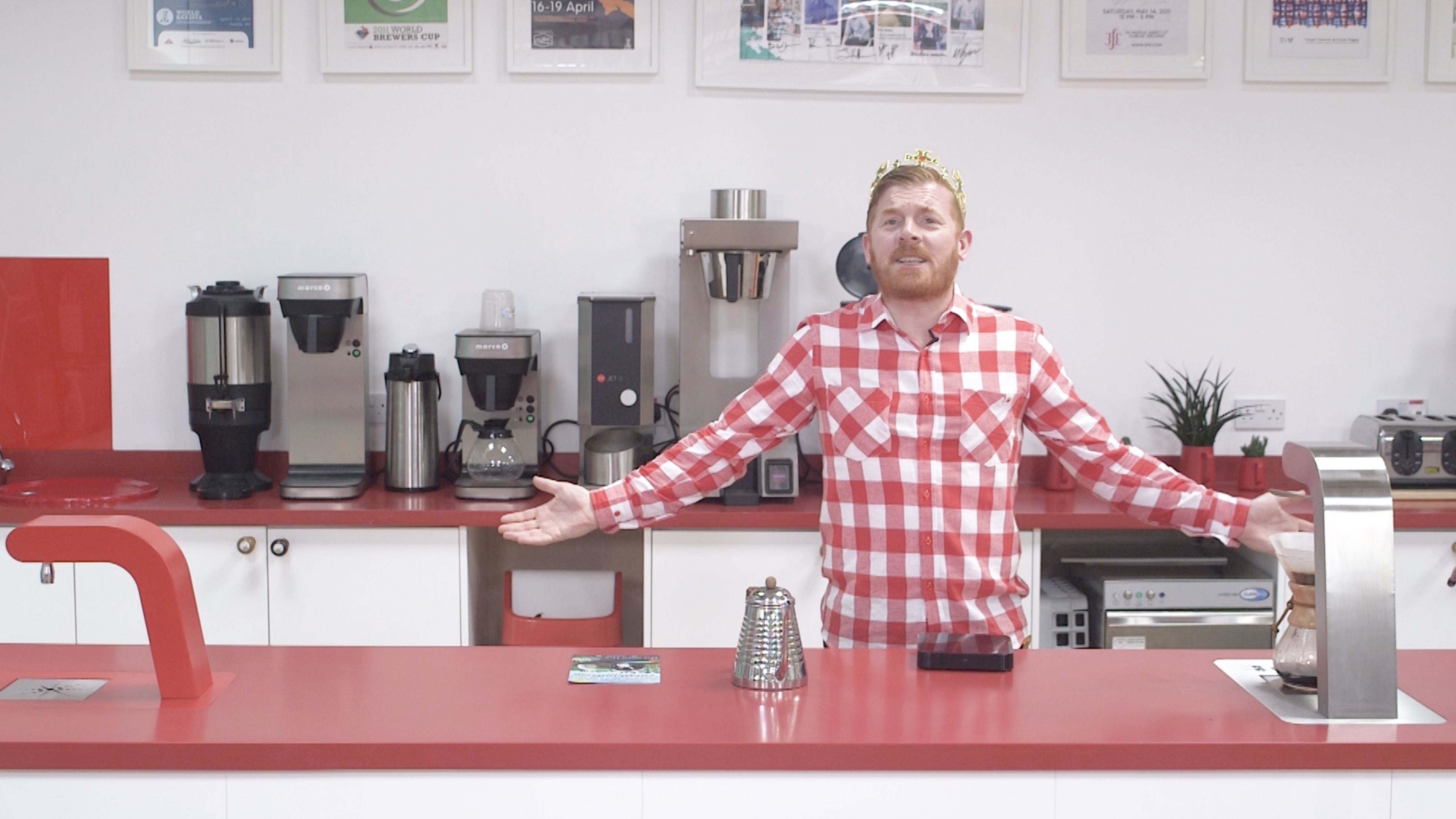
Saturday Sep 02, 2017
Episode 460 on Monday the 4th of September, 2017. Kenya Kiriga Estate AB Washed
Saturday Sep 02, 2017
Saturday Sep 02, 2017
Well hello there everyone, Uncle Steve has a story to tell you! So sit back, relax and enjoy the story of the Kiriga Estate in Kenya :)
The first coffee bush at Kiriga Estate was planted in approximately 1954 by colonial settlers. At about the same time, less than ten kilometres away along the same Kigio road, a young boy (Aloysius Gakunga, son of the chief for the larger Murang'a county) helped his father – Senior Chief Ndungíu Kagori – plant the first coffee seedling in the area. The area was known as Gaitegi village, Muranga Location 1 (Loco One). A love affair with coffee had been born!
Several years went by and the young boy grew up. He was riding his bicycle along Kigio road and, as he rode past the vast – by now well-established – coffee estates, he promised himself that he would one day own one of them.
He realized this dream in 1976.
Sadly the boy, or Mr. A. N. Gakunga, passed away in July 2014. By the time of his death, Mr. Gakunga had passed on the love of coffee, and the mantle of Kiriga coffee estate, to Dr. Brian Ndungíu Gakunga. Brian was his second child, and the eldest son out of his six children. According to Kikuyu cultural naming systems, Brian is named after Mr. Gakungaís' father, who was both his grandfather and his pioneer coffee farmer.
- Dr. Brian Gakunga is a coffee farmer who is well known in Kenyan coffee circles. He is a founding member and a former long-serving Honorary Secretary of the Kenya Coffee Producers Association, which is a national farmer's organization that works to promote the economic and social interests of the coffee farmers through active participation in the national and international arena.
- Brian is also a former Board Member and Chairman of Transitional Exchange Committee (operationally, he was the then-Chairman of Nairobi Coffee Exchange), where over 90% of all of Kenya's coffee is currently sold. He's also currently the Founding Chairman of Africa Coffee Farmers' Network.
- Africa Coffee Farmers' Network represents the interests of coffee farmers, as spelled out in the organisation's core objective of improving the earnings of poor coffee farmers in order to break the vicious cycle of poverty. One way of doing this is by getting direct sales for the farmers.
The Kiriga Estate sits between 1,550 and 1,650 metres above sea level. It is approximately five kilometres from Thika town, which is an industrial town in the central province of Kenya. It's four kilometres from Blue Posts hotel, which has the famous Chania and Thika falls. Thika lies 50 kilometres northeast of Nairobi.
Administratively, Kiriga coffee estate is in the Gatanga constituency of Muranga county, and it's separated from Kiambu county by the Chania river.
Kiriga coffee is Arabica of predominantly SL28 variety (notable for its world-renowned cup quality). The farm has an estimated two hectares of Ruiru 11 variety (which has improved resistance to coffee berry disease and leaf rust); some K7 variety (similar characteristics as SL28, but with better resistance to leaf rust compared to SL28); and a field of the newest Batian variety. About 60% of the coffee that the estate produces is AA/AB.
All coffee activities at Kiriga are carried out from the coffee nursery to all the farm operations (pruning, weed control, nutrition, irrigation, basin digging, disease control, infilling, mulching, and planting). Wet mill operations are also carried out on the factory level. Kiriga delivers both parchment coffee and Mbuni (naturals) to the commercial dry mill for milling and grading, in preparation for sale at the coffee auction and in direct sale.
In addition to growing coffee the estate also has, I was told, shoats (sheep and goats), a dairy, and the potential to keep fish. It's all about diversity, and what's more diverse than a 'shoat'?! The estate is also occasionally visited by two hippos, in addition to some bird-life, while also being the home of a family of monkeys.
Kiriga irrigated all its coffee trees – despite the crippling electricity costs involved – during the dry season that happened earlier this year, in order to ensure their high standards were maintained despite the weather.
By the end of 2015 the estate changed the cycle of its coffee trees by removing the old heads and growing new heads, which in return gave a higher yield of bold beans with the characteristic 'Kiriga coffee characteristics'. Over 40% of the 'old heads' had to go! This is way above the recommended 25%, and as a result we expect to have decreased yield but increased quality.
At Kiriga they talk about having a 'Kiriga Family'; and it's a big family that reaches up to 180 people at the busiest times of year! 30% of the total workforce is made up of resident families who live on the estate, and 50% of those know no other home. The remaining percentage consists of smallholder farmers who commute daily and depend on the estate for survival. There are smallholder farmers who have been part of the family since 1976 and have no desire to work anywhere else, commuting a whopping 10 KM (or more!) daily, past other estates, just to work at Kiriga.
Something really amazing I wanted to tell you about is the Kiriga Welfare Fund. In the past the estate saw its workers get turned away from banks when they tried to acquire loans for dealing with family issues or emergencies. To help his 'Kiriga Family', over the past year Brian has encouraged the workers to set up a welfare group with him as its patron, and Brian has provided money for loaning out to staff according to their most pressing needs.
Brian has also approached a banking institution to see whether they can fund workers to acquire dairy animals on loan and repay from the milk proceeds. Under such an arrangement, 50% of the proceeds would go towards paying for the loan. A market would be readily available and the remaining 50% would be extra income to the workers. This is ongoing and, if successful, it would have the effect of supplementing the workers' wages and greatly improving their quality of life.
Many of the estate farms around Kiriga have been sold off to make housing estates. Whilst this is a challenge for the future, in the immediate period Brian is actually finding this helpful, as there are more skilled pickers available (who were working on the other farms).
During my visit to Kenya in 2015 I was fortunate enough to spend some time chatting with Brian. I even managed to record some of it, too! Make sure to have a listen : )
Has Blog: An Interview with Brian and Peter from Kiriga (Part 1)
Has Blog: An Interview with Brian and Peter from Kiriga (Part 2)
In the cup this kicks off with a tropical fruit like sweetness and acidity, then a creamy base note of dark chocolate that finishes with lemon pithiness.
- Country: Kenya
- County: Muranga
- Constituency: Gatanga
- Nearest town: Thika
- Estate: Kiriga
- Farmer: Dr. Brian Gakunga
- Altitude: 1,550–1,650 m.a.s.l.
- Processing method: Washed
- Varietals: SL28 AB & Ruiru 11 AB
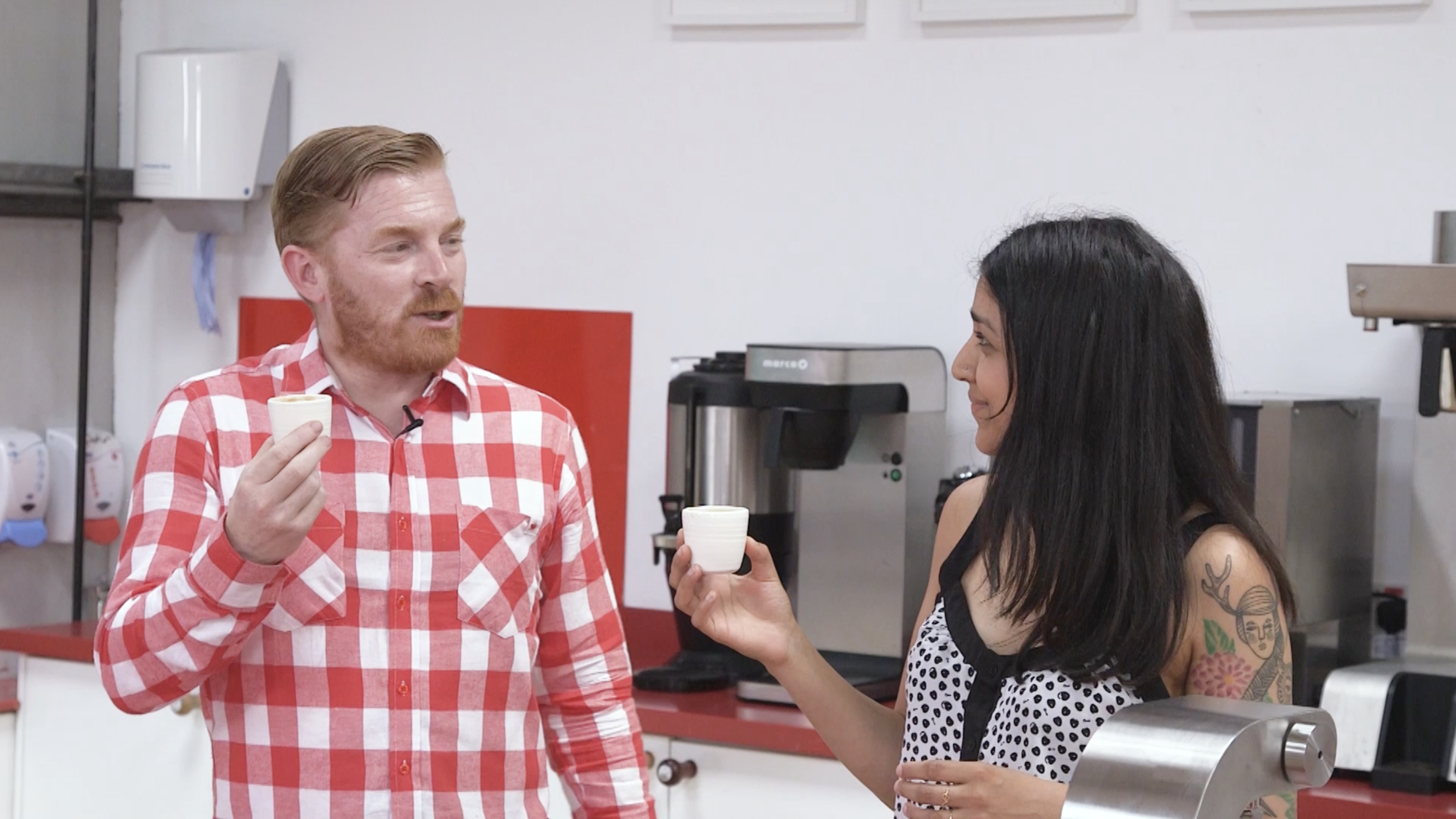
Saturday Aug 26, 2017
Saturday Aug 26, 2017
From the same region in Costa Rica that gives us the wonder of Finca Licho (i.e. the Western Valley in Lordes de Naranjo, in case you're wondering), I'm so excited to have Finca La Casa Vista al Valle back for 2017 to share with you once more.
Located between 1,500 and 1,600 metres above sea level and owned in partnership by Oldemar Arrieta Lobo and Marlene Brenes Morera, the name 'Vista al Valle' translates as 'view of the valley'. I'm sure you'll understand why if you take a look at some of the pictures on the left of this page.
Oldemar and Marlene are also processing this coffee using a virtually brand new micro mill, which is in only its fourth year of production. They both learnt their skills while working for other people, but now they have a mill of their own. They own three farms: this one surrounds the home where they live, and the other farms are called Zapote and Fidel. Fidel won the Costa Rican Cup of Excellence two years ago!
The varietals on this farm are Villa Sarchi and Caturra. They use the sun-dried processing method in their poly tunnel, and the Yellow Honey process.
In the cup this coffee starts out with both the texture and taste of single cream, and then shifts to sweet segments of mandarin. On the aftertaste the cream returns to round out a very well balanced cup.
- Country: Costa Rica
- Region: Western Valley
- Micro-region: Naranjo, Lourdes
- City: Naranjo de Alajuela
- Farm: Finca La Casa
- Micro mill: Vista al Valle
- Farmer: Oldemar Arrieta Lobo and Marlene Brenes Morera
- Farm size: 20 hectares
- Coffee growing area: 15 hectares
- Altitude: 1,500–1,600 m.a.s.l.
- Varietals: Villa Sarchí and Caturra
- Drying method: Poly tunnel, sun dried
- Processing system: Yellow honey
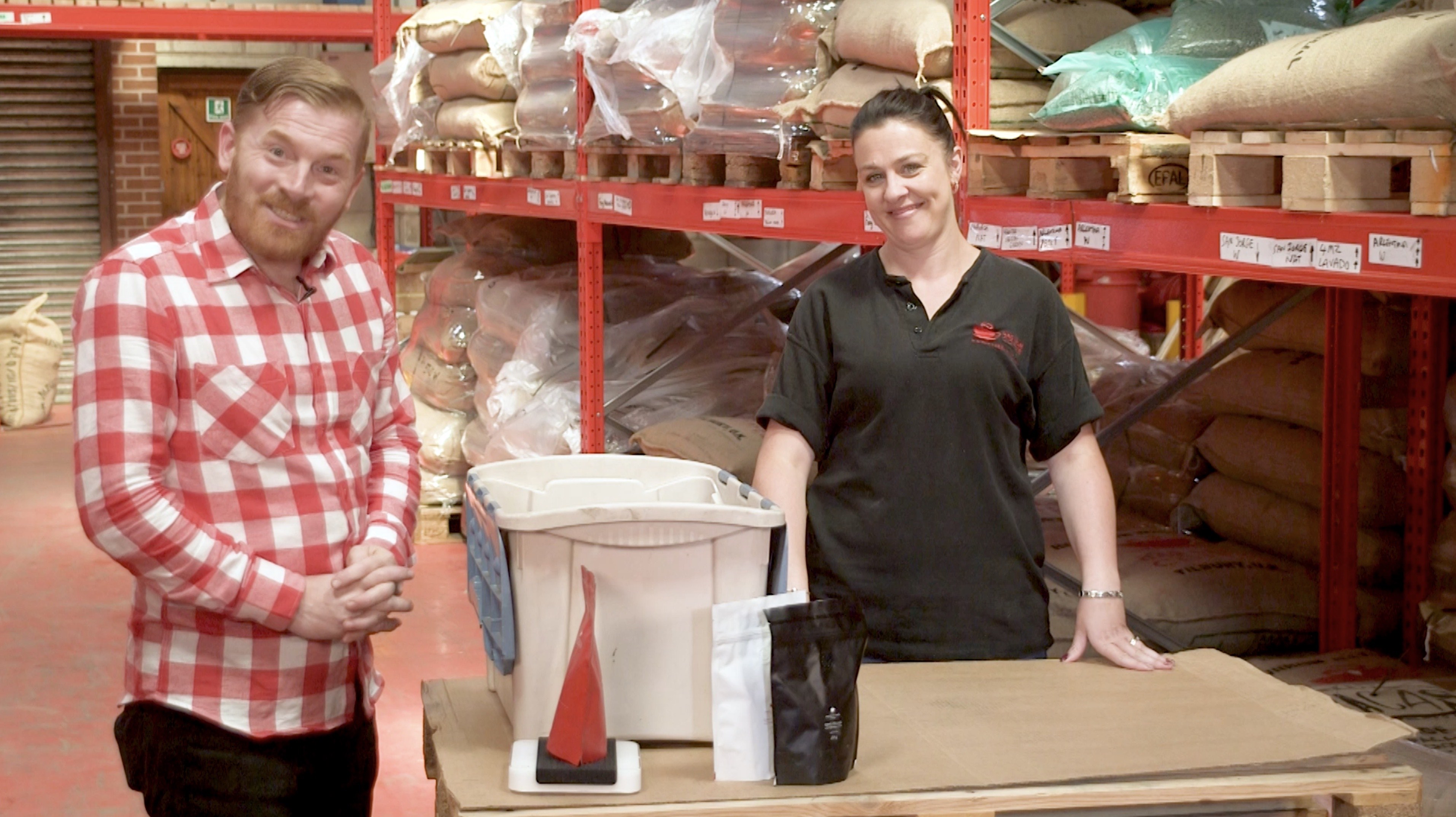
Saturday Aug 19, 2017
Saturday Aug 19, 2017
The story of Hasbean and Finca Limoncillo has been told many many times, but it's one that I really love to share. So much of where we are today has come from this relationship, and I'm super proud of everything that's happened in the past, as well as amazingly excited for where we can go in the future.
My relationship with Finca Limoncillo began in 2007, and back then we were buying their delicious coffee as part of a buying group. I loved it from the very first time I cupped it, and it was a coffee I just had to get. It was only after the auction closed that I discovered it was owned by a family in Nicaragua who were already good friends of mine, and indeed probably the only people I know from the whole country!
The following year I visited the farm with our importers and spent the whole trip begging them to bring the coffee in for us. Eventually, they caved in (possibly just to stop me pestering them!) and kindly did so.
This setup worked well for a time, but we received notice a couple of years ago that the importers were not going to be buying the coffee again (and for reasons other than the cup quality). This led to some frantic phone calls and a thorough search down the back of the sofa for loose change to fund buying twelve months’ worth of coffee all at once. There were many, many obstacles in the way of doing this deal, but we were lucky in that we were able to pull everything together in a very short amount of time.
The upside of all of this is that we now work directly with Finca Limoncillo instead of going via anyone else, and this is a relationship I’m super happy to have. This coffee has gone from a one-off Cup of Excellence buy to a fantastic long-term relationship.
Finca Limoncillo is located in Matagalpa and, at 171 hectares, it. is. huge! Situated at an amazing location, it boasts 9 waterfalls within the farm and is owned by the Mierisch family; as I have already said, they’re good friends, and also well-respected producers in Nicaragua. They’re known for their experimental processing, varietal work, and exceptional coffee.
The fact that the family are friends helps us drill down into the details of what they do for the people who work for them, and the information continues to prove to me that good people grow good coffee.
On the farm, the family:
- Pay their staff 30% more than what is typical minimum wage.
- Provide free housing for 60 families.
- Provide free electricity and running water for their workers' homes.
- Provide free food for all workers.
- Provide free daycare facilities for families to use.
- Provide free healthcare facilities.
- Employ on-site teachers who educate the staff and teach other skills, such as pottery and weaving. The goal is to help staff diversify their skills. The teachers are also paid twice the wages they would receive in the cities.
The coffees we receive from Limoncillo are fantastic and they come from a fantastic relationship. Erwin Mierisch has visited Stafford many times, and it's always a pleasure to have him around. Last time he was over he ended up at a Weird Beard tap takeover in Manchester, talking to two Weird Beards about crazy brewing / coffee farming ideas! A coffee from Finca Limoncillo (the 'Funky Red Pacamara') is used in two of Weird Beard's beers: Black Perle and Double Perle, both of which are mighty delicious beers!
This is a Pacamara varietal coffee, but a Pacamara with a bit of a twist (more on that in a mo). Pacamaras are a little crazy on the cupping table. Pacamaras are exciting. I like Pacamaras! I could ramble on about Pacamaras for a while ... oh, wait a minute, I did! If you'd like to know more about this fantastic varietal, make sure to have a look at the article I wrote...
As well as being a big ol' Pacamara this is also a lil' ol' Peaberry, a thing that's normally big is a little smaller than you might expect. An interesting mix of unusual sizing that I hope you'll enjoy.
Normally the seed of the coffee fruit grows into the green bean we all know and love from 2 fertilised seeds inside each fruit, but sometimes things are a little different a Peaberry is born. When only 1 of the 2 seeds is fertilised it produces a smaller bean that looks like a shrunken version of what we'd normally know as a coffee bean because only 1 seed has grown instead of 2.
Some say Peaberrys are sweeter and more delicious than their regular cousins, some people even come to us specifically looking for them because they crave them so much! I'll let you be the judge.
In the cup orange and cinnamon meet in a wonderful way. There’s orange acidity with hints of grapefruit and a blackberry hit whilst being thick and gloopy with a spicy aftertaste.
- Country: Nicaragua
- Municipality: Yasica Norte
- Region: Matagalpa
- Farm name: Limoncillo
- Farmer: Dr. Erwin Mierisch
- Farm size: 171 hectares
- Coffee growing area: 109 hectares
- Diurnal temperature cycle (average): High 28°C, low 20°C
- Altitude: 1,200 m.a.s.l.
- Varietal: Pacamara Peaberry
- Processing method: Washed
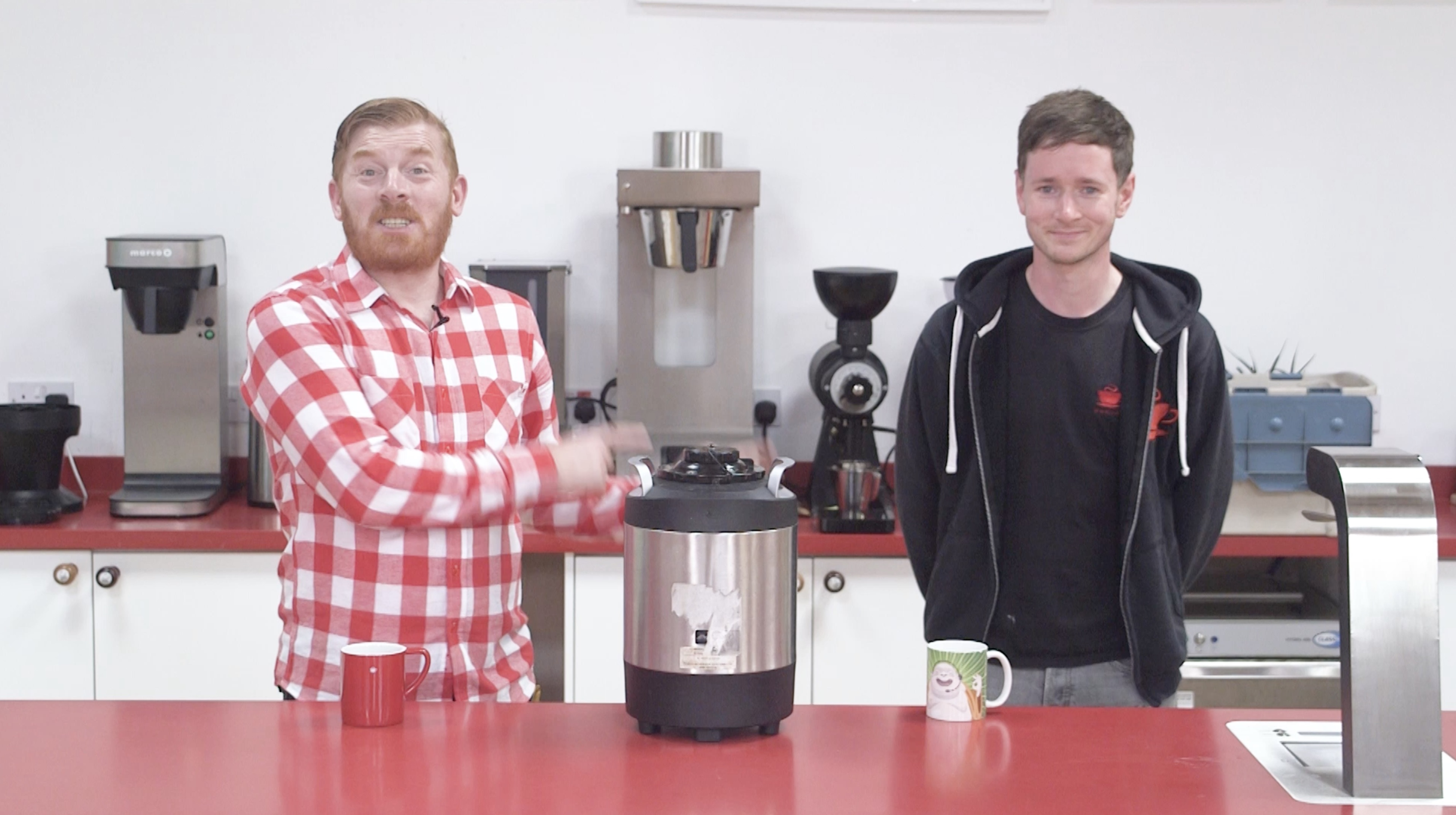
Saturday Aug 12, 2017
Episode 457 on Monday the 14th of August, 2017. Kenya Othaya Chinga Natural
Saturday Aug 12, 2017
Saturday Aug 12, 2017
Back in 2014 I took my very first trip to Kenya, my aim was not to meet producers but rather to get an insight into how the market works, and into how we can improve the quality of the coffee we buy from Kenya.
Much of Kenyan coffee comes from cooperatives, which means it's tough to go to visit a person or build a long-term relationship. That said, it is possible to get something interesting going and to work on projects together by speaking with the leaders of the co-ops and washing stations.
Othaya Farmer's Cooperative is based at the Gatuyaini Wet Mill, where they have a cupping room (and talented QC person) as well as their latest addition - a small roastery (where they hope to develop a market for their coffee inside Kenya). Othaya owns a number of wet mills, but we get our lots from the Chinga mill.
Chinga wet mill is managed by the rather tall Gary John, who we have asked to process a Natural lot for us. This was particularly difficult to get this year as the mill expected to be 75% down on cherries compared to the previous year (a problem all over Kenya this year, but particularly tough here). The Chinga mill is located near to the town of Othaya just east of the Chinga Dam. It's approximately 5 KM southwest of the town, and is in the Nyeri county part of Kenya.
The mill has some 783 members and each member only owns a small piece of land of an average 0.3 acres. They harvest the coffee themselves and then sell it to the mill, where it is processed and sent to the government auction.
The 'project' part of this coffee was that back in 2014 we asked the growers if they would naturally process a batch for us. They kindly agreed to do so, as long as we promised to buy it regardless of the final cup.
As you might have guessed that coffee was a big success and so here it is back for another year! They thought I was crazy because only the poor quality coffee in Kenya gets naturally processed, and they couldn't understand why I wanted only the best-quality coffee processed in this way. But they did it, you're welcome! ; )
In the cup this natural just keeps getting cleaner and cleaner year after year. Think alcoholic ribena with a rum and raisin finish (rumbena!) and a creamy, silky body.
- Country: Kenya
- Province: Nyeri
- District: Othaya
- Affiliated to: Othaya Farmer's Cooperative
- Farm: Chinga
- Processing: Natural
- Varietals: SL28 & SL34
- Average rainfall: 1,200–1,500mm
- Altitude: 1,795 m.a.s.l.
- Drying method: Sun dried
- Harvest method: Hand picked
- Coordinates: 0°34'45.4"S 36°55'35.2"E
- Soil: Rich volcanic loam







